MOST POWERFUL ARABS 2023 100


P.24 FUNDING THE FUTURE: Gulf sovereign investors are playing a bigger role than ever before in the global market



P.68 25 YEARS ON... How homegrown consultancy firm Ròya International has carved a niche for itself in the region’s hospitality industry
FROM ESTABLISHED ICONS TO NEW ENTRANTS, WE PRESENT OUR FLAGSHIP ANNUAL LIST OF THE WORLD’S MOST PROMINENT AND INSPIRING ARAB PERSONALITIES



gulfbusiness.com / APRIL 2023 BD 2.10 KD 1.70 RO 2.10 SR 20 DHS 20

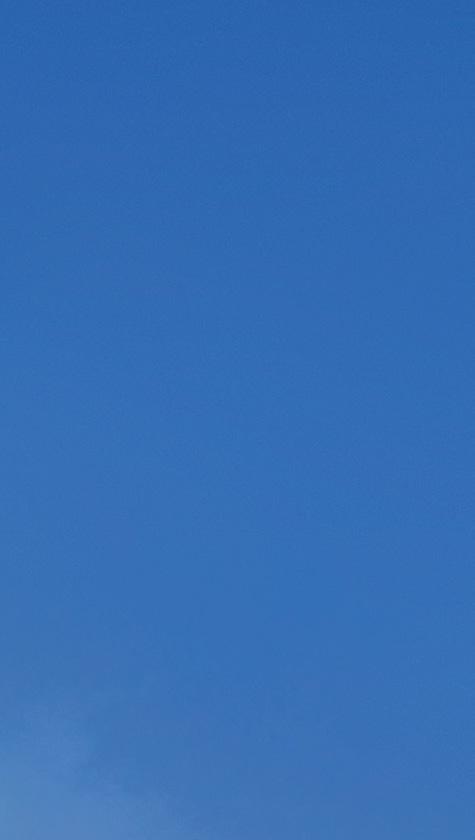

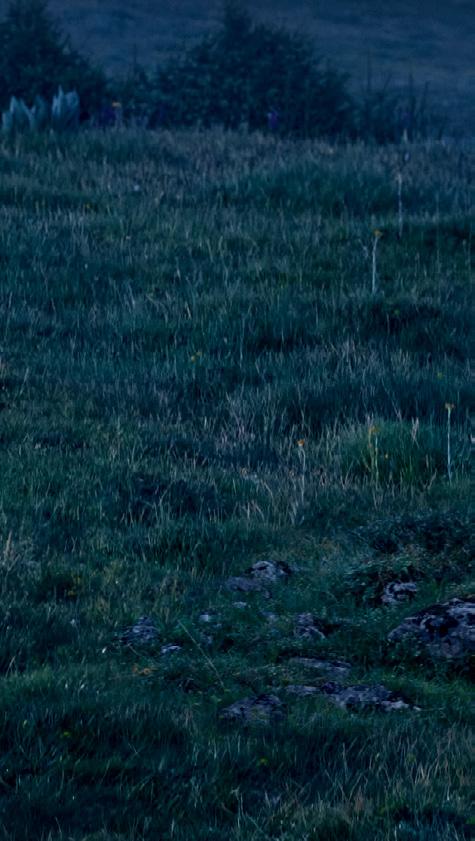















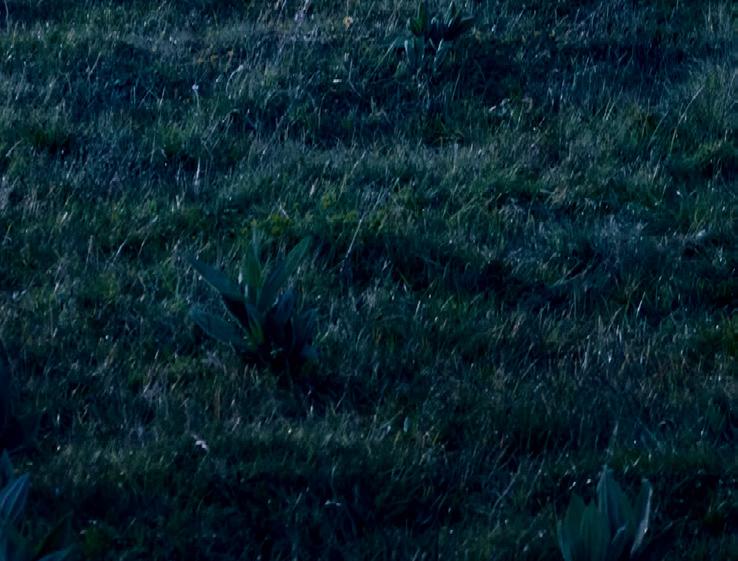



 BY AUDEMARS PIGUET STARWHEEL
BY AUDEMARS PIGUET STARWHEEL


















11.59
CODE
SEEK BEYOND
Gulf Business
An insight into the news and trends shaping the region with perceptive commentary and analysis







24



The rise and rise of GCC sovereign wealth funds


The region’s SWFs are eyeing opportunities amid global tumult, fuelled by petrodollar surpluses a ter oil prices last year reached record highs
27
100 Most Powerful Arabs 2023


Our annual list of the world’s most influential and prominent Arab men and women revealed



gulfbusiness.com 4 April 2023
06 The brief
59 Lifestyle
Watch and earn: Rise
Studio CEO Amanda Turnbull on why local content is king p.60
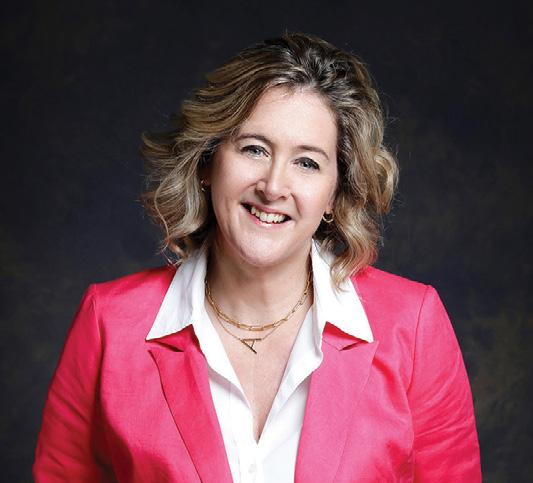
Glocal appeal: Gaurav Bhushan of Ennismore shares its expansion plans for the region p.63
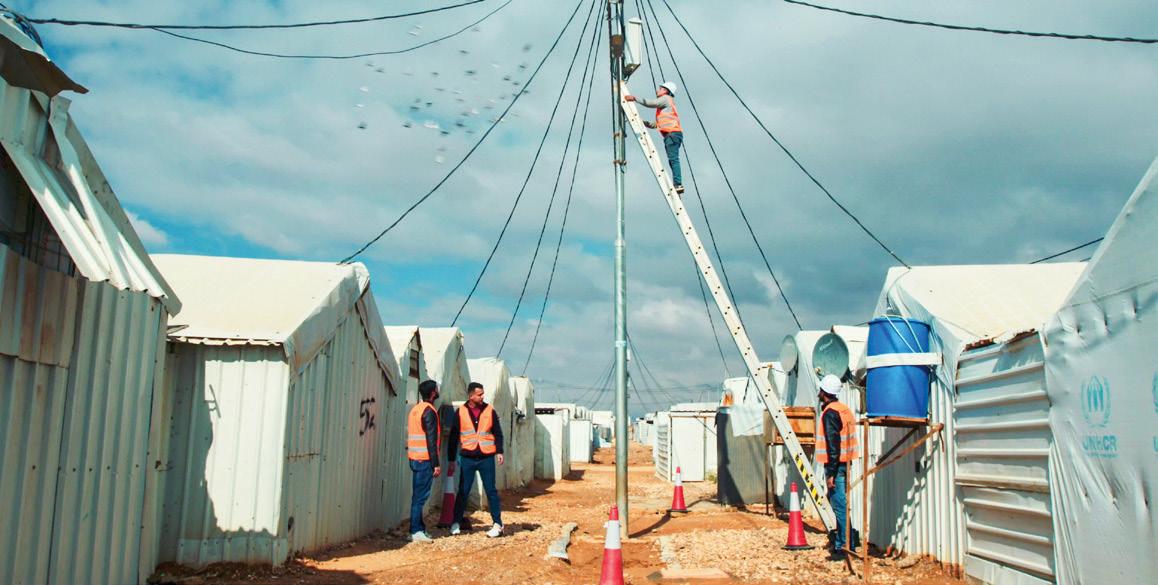
Man on a mission: Ròya
International’s Ahmed Ramdan on hospitality trends in the GCC p.68
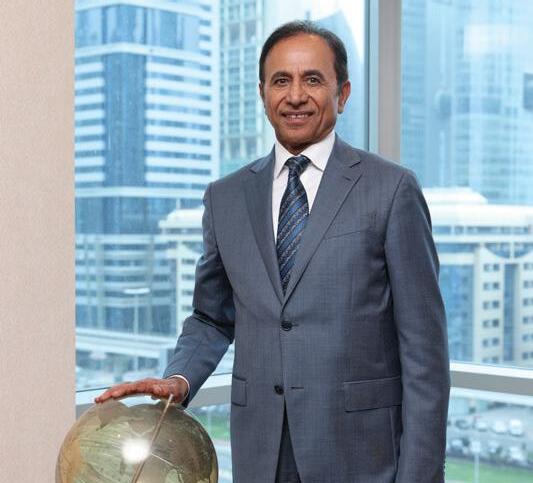

71
The SME Story
Interviews with entrepreneurs and insights from experts on how the regional SME ecosystem is evolving
Editor-in-chief Obaid Humaid Al Tayer
Managing partner and group editor Ian Fairservice
Chief commercial officer Anthony Milne anthony@motivate.ae
Editor Neesha Salian neesha.salian@motivate.ae
Tech editor Divsha Bhat divsha.bhat@motivate.ae
Senior feature writer Kudakwashe Muzoriwa Kudakwashe.Muzoriwa@motivate.ae
Contributing editors Nusrat Ali and Zainab Mansoor
Senior art director Olga Petroff olga.petroff@motivate.ae
Art director Freddie N. Colinares freddie@motivate.ae
Cover: Freddie N Colinares
General manager – production S Sunil Kumar
Production manager Binu Purandaran
Production supervisor Venita Pinto
Digital sales director Gurjeet Kaur Gurjeet.Kaur@motivate.ae
Sales executive Sonam Sharma sonam.sharma@motivate.ae
Group marketing manager Joelle AlBeaino
joelle.albeaino@motivate.ae
gulfbusiness.com April 2023 5
“With the launch of the Dubai Economic Agenda D33, we work together as one team to achieve our leader’s vision for Dubai to be a top performing city in all sectors.”
Sheikh Hamdan bin Mohammed bin Rashid Al Maktoum, Crown Prince of Dubai and Chairman of the Dubai Executive Council
HEAD OFFICE: Media One Tower, Dubai Media City, PO Box 2331, Dubai, UAE, Tel: +971 4 427 3000, Fax: +971 4 428 2260, motivate@motivate.ae DUBAI MEDIA CITY: SD 2-94, 2nd Floor, Building 2, Dubai, UAE, Tel: +971 4 390 3550, Fax: +971 4 390 4845 ABU DHABI: PO Box 43072, UAE, Tel: +971 2 677 2005, Fax: +971 2 677 0124, motivate-adh@motivate.ae LONDON: Acre House, 11/15 William Road, London NW1 3ER, UK, motivateuk@motivate.ae Follow us on social media: Linkedin: Gulf Business Facebook: GulfBusiness Twitter: @GulfBusiness Instagram: @GulfBusiness
CONTENTS / APRIL 2023

gulfbusiness.com 6 April 2023 Climate Change 07 Productivity 08 Alan’s Corner 11 Venture Capital 14 Alternative Assets 16 APR Global brands need a glocal strategy Is your company looking to expand to new markets? These vital factors should be evaluated and considered before you make the move p.09 23 The Brief THE RESURGENCE OF THE NON-OIL ECONOMY Source: PWC / Global Source Partners based on data from national statistical agencies While 2022 was the ‘year of oil’, the recovery of the non-oil economy was one of the good news stories of the year -4.8% -0.2% 3.5% 4.0% 9.4% 5.2% 6.3% -1.9% Oil and gas Non-oil private sector SAUDI ARABIA UAE QATAR BAHRAIN Change (by %) in real GDP in the four quarters to 2022 Q1 vs 2020 Q1
Air and now
It’s no secret that air pollution is a serious problem facing the world today. Just how serious? A new study on global daily levels of air pollution shows that hardly anywhere on Earth is safe from unhealthy air.
About 99.82 per cent of the global land area is exposed to levels of particulate matter 2.5 (PM2.5) –tiny particles in the air that scientists have linked to lung cancer and heart disease – above the safety limit recommended by the Word Health Organization, according to the peer-reviewed study published Monday in Lancet Planetary Health. And only 0.001 per cent of the world’s population breathes in air that is considered acceptable, the paper says.
Conducted by scientists in Australia and China, the study found that on the global level, more than 70 per cent of days in 2019 had daily PM2.5 concentrations exceeding 15 microgrammes of gaseous pollutant per cubic metre – the WHO recommended daily limit. Air quality is particularly worrisome in regions such as southern Asia and eastern Asia, where more than 90 per cent of days had PM2.5 concentrations above the 15 microgramme threshold.
While any amount of PM2.5 is harmful, scientists and regulators are typically less concerned about daily levels than they are about chronic exposure.
“I hope our study can change the minds of scientists and policymakers for the daily PM2.5 exposure,” says Yuming Guo, the lead researcher and an environmental health professor at Monash University. “Short-term exposure, particularly

sudden increase, to PM2.5 has significant health problems … If we can make every day with clean air, of course the long-term exposure of air pollution would be improved.”
While scientists and public health o cials have long been at alert to the dangers — air pollution kills 6.7 million people a year, with nearly two-thirds of the premature deaths caused by fine particulate matter — quantifying the global exposure to PM2.5 was a challenge due to a lack of pollution monitoring stations.
Guo and his coauthors overcame that challenge by marrying ground-based air pollution measurements collected from more than 5,000 monitoring stations worldwide with machine learning simulations, meteorological data and geographical factors to estimate global daily PM2.5 concentrations.
ANNUAL EXPOSURE
When it came to estimating annual exposure across all regions, the researchers found that the highest concentrations occurred in eastern Asia (50 microgrammes per cubic metre), followed by southern Asia (37 microgrammes) and northern Africa (30 microgrammes). Residents of Australia and New Zealand faced the least threat from fine particulate matter, while other regions in Oceania and southern America were also among the places with the lowest annual PM2.5 concentrations.
They also examined how air pollution changed over the two decades up to 2019. For instance, most areas in Asia, northern and sub-Saharan Africa, Oceania, and Latin America and the Caribbean experienced an increase in PM2.5 concentrations over the 20 years, driven in part by intensified wildfires. Annual PM2.5 concentrations and high PM2.5 days in Europe and northern America decreased, thanks to stricter regulations. Fine particulate matter is made up of soot from vehicles, smoke and ash from wildfires and biomass cook-stove pollution, plus sulphate aerosols from power generation and desert dust.
AIR POLLUTION ACCELERATION
ABOUT 99.82%
OF THE GLOBAL LAND AREA IS EXPOSED TO LEVELS OF PARTICULATE MATTER 2.5 (PM2.5) — TINY PARTICLES IN THE AIR THAT SCIENTISTS HAVE LINKED TO LUNG CANCER AND HEART DISEASE
The article also pointed out how levels of fine particulate matter vary depending on the season, a reflection of human activities that accelerate air pollution. For instance, northeast China and north India recorded higher PM2.5 concentrations from December to February, likely linked to an increased use of fossil fuel-burning heat generators during the winter months. South American countries such as Brazil, on the other hand, had increased concentrations between August and September, probably connected to slash-and-burn cultivation in the summer.
gulfbusiness.com April 2023 7
Bloomberg The Brief / Climate Change
ILLUSTRATION: GETTY IMAGES/SONMEZ KARAKURT
Less than 1 per cent of earth has safe levels of air pollution, finds study
Hybrid Exhaustion
Corporate leaders are stretched and stressed as never before. According to data from insurance provider Bupa Global, 96 per cent of executives in the UAE experience significant levels of mental distress, and one in five report distressing signs of burnout. Their hope: hybrid work arrangements will reduce both their workload and stress levels. Such hopes, however, may be misplaced. All too o ten hybrid work is the culprit, not the cure.
HYBRID WORK IS A DOUBLE-EDGED SWORD


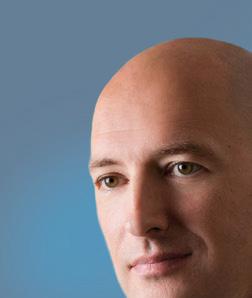
We must face the harsh reality. As hybrid work models have become the most dominant form of employment, it’s become obvious that they are a double-edged sword. Yes, hybrid work can lead to




more flexibility and self-determination, but it can also “lead to new forms of (self-)exploitation,” warns Erin Kelly, Professor of Work and Organization at MIT’s Sloan School of Management. “That happens, when flexibility is merely a shorthand for being available around the clock, for being constantly on demand.”
FROM DIGITAL OVERLOAD TO EXHAUSTION



Yet, being constantly on demand is the new normal for too many leaders in the hybrid workplace: a brief chat message here, a quick ping there, a subordinate is calling to request urgent advice. And all while heading into the next virtual meeting. This is the executive grind I have witnessed as a productivity expert over the last three years. Hybrid work arrangements significantly add to the digital overload executives face on a daily. Not least because leaders are tasked with managing more fluid and more complex team constellations which increase their load in coordinating and structuring work. Is it then really a wonder that such arrangements are a major contributor to executive exhaustion?
IT DOESN’T HAVE TO BE THAT WAY
However, there is a silver lining: Hybrid work is what we make of it. Corporations and executive leaders can shape the rules of the game. To do so e ectively, they need to follow three fundamental rules:
Rule 1: Manage
attention instead of time
Attention is the new currency. Leaders need to primarily manage attention, not time, in the hybrid workplace. Doing more in less time simply doesn’t cut it anymore. Instead, executive productivity and success are primarily determined by how e ectively leaders can focus their attention on deep work. According to Cal Newport, an expert on technology and culture who popularised the term, deep work encompasses “activities that happen at the upper boundary of your cognitive abilities” and thus need to be “performed in a state of distractionfree concentration.” While deep work has grown increasingly important to generate value in the information economy, leaders’ abilities to perform
gulfbusiness.com 8 April 2023
The Brief / Productivity COMMENT
Executive leaders are more exhausted than ever – and hybrid work could be the culprit
ILLUSTRATION: GETTY IMAGES/ZHUWEIYI49
“Flexibility is merely a shorthand for being available around the clock, for being constantly on demand”
CONSTANT AVAILABILITY AND INSTANT REPLIES CAN QUICKLY BECOME THE UNSPOKEN NORMS IN TEAMS AND ORGANISATIONS

such work is decreasing in an ever-expanding sea of digital noise. By now, we are losing 28 per cent of our working time to distractions, according to The Economist Intelligence Unit. To protect their attention and their well-being, executives need to ruthlessly cut through the noise.
Rule 2:
Keep your frenemies at bay
Digital collaboration and communication tools such as Zoom, Slack and instant messengers such as Microsoft Teams are simultaneously our workplace friends and enemies. On the one hand, they allow teams and units to work remotely and asynchronously. On the other, they are by far the biggest distraction to leaders’ workdays. Being constantly reachable is like being a barista who spends all day taking orders, rather than preparing actual coffee. Taking orders is only a means to an end. The same holds true for Zoom, Teams and Slack. Leaders need to limit the time they are available across digital channels. They need to follow the barista principle: Limit your orders to make premium coffee.
Rule 3:
Negotiate availability and reaction times
Constant availability and instant replies can quickly become the unspoken norms in teams and organisations. Executives and employees can feel that they must be constantly present and visible on communication channels, notes Kelly. To avoid a vicious cycle of digital overload, leaders need to negotiate collaboration and response times with their teams and ask the uncomfortable question: “Why does it not feel safe to keep the instant messenger on red?” Executives are neither shirking their work nor responsibilities by setting digital limits. Instead, they’re allowing themselves and their employees to make space for what matters.
Implementing these three rules is not an easy process. It is both time-consuming and involves several iterations. But leaders who chose to ignore the effects of hybrid work on wellbeing do so at their peril. Let’s get hybrid work on a healthier footing – for executives, their employees, and their companies.
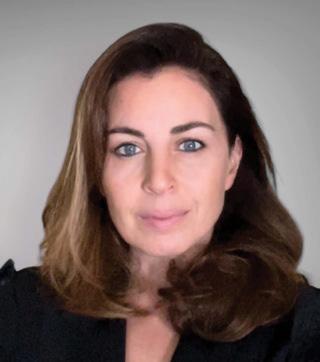
Global brands need a glocal strategy
Branding internationally can be a complex and challenging process, and it’s a crucial consideration for companies that want to expand their reach and increase their revenue. Any textbook approach will tell us that the ingredients for success include a combination of cultural sensitivity, appropriate linguistic adaptation, legal compliance, market research and consistency.
Let’s take a look through some of the pitfalls experienced by companies who have had to overcome the hurdles they encountered during regional expansion.
01. Cultural sensitivity: The importance of understanding local customs and values, respecting and adapting branding and marketing materials to align.
In the 1980s and 1990s, McDonald’s attempted to enter the Italian market, but faced strong resistance from local restaurant owners and consumer groups who saw the company as a symbol of American cultural imperialism. These groups accused McDonald’s of not respecting Italian culinary traditions and using low-quality ingredients.
McDonald’s also faced legal challenges, as the Italian government passed a series of laws aimed at protecting traditional Italian cuisine and restricting the expansion of fast-food chains. These laws included regulations on the
gulfbusiness.com April 2023 9
The Brief / Brand Strategy COMMENT
To be relevant and appealing on a local level, international brands must tap into the power of glocalisation
ILLUSTRATION: GETTY IMAGES/CSA IMAGES
Oriana
Moufarrige, entrepreneur and marketing professional, specialising in luxury, digital, brand image and international retail expansion
Mark T Fliegauf, executive director at Think Productive (West & South Asia) and a practitioner fellow in Hybrid Work at the Berlin Social Science Center
COMMENT
use of specific ingredients such as olive oil, and the requirement for fast-food chains to clearly display the origin of their ingredients. McDonald’s had to make significant changes to its business model in Italy. The company had to adapt its menu to include more traditional Italian dishes, such as pasta and panini, and was made to source ingredients from local suppliers. They made a shift to invest in advertising campaigns that highlighted the quality of their ingredients, and the company’s efforts to respect Italian culinary traditions.
Despite these efforts, the chain struggled to gain a foothold in the Italian market, and it wasn’t until the late 2000s that the company began to see significant growth in the country.
local bottling plants and their efforts towards embracing sustainable practices.
Despite these efforts, Coca-Cola still struggled to gain market share in India and it wasn’t until the early 2000s that the company began to see significant growth in the country demonstrating the importance of conducting thorough research as an essential component to the planning of market expansion.
03. Consider timing and implantation strategy: Armed with an awareness of the market you are entering, timing is everything. There are ways (and ways) of bringing a brand to a new market.
established a strong presence in the country. However, in 2018 the brand faced a significant setback due to a controversial marketing campaign and social media posts that were viewed as racist and culturally insensitive by the Chinese consumers.
The campaign included a video of a western model eating a plate of pasta with relish — then a Chinese model attempting, with difficulty — to do the same with a pair of chopsticks. What had seemed like a light touch of humour to the Italians proved to be deeply offensive to their host nation and the ad was seen as mocking and demeaning. The backlash was severe, with many Chinese consumers and celebrities boycotting the brand, propagating the call on social media and so it snowballed.
Another brand facing difficulty integrating into a new market is CocaCola. The company initially entered the Indian market in the 1950s, but due to government regulations, was forced to leave the market in 1977. On re-entering the Indian market in the 1980s, they faced cultural and societal challenges. One major issue was that in India there was a chronic lack of access to clean drinking water, so the idea of purchasing a sugary drink was unappealing. Additionally, traditional Indian drinks such as ‘lassi’ and ‘chai’ were deeply ingrained in the culture, making it difficult for Coca-Cola to compete.
Coca-Cola also faced backlash from the Indian government and some consumers for their use of excessive amounts of water in their bottling process, which was seen as wasteful in a country where water was scarce.
To address these challenges, Coca-Cola launched a campaign to promote their brand as a symbol of modernisation and global integration, while also addressing the water usage issue. They started building water-treatment plants and promoting water conservation. Their product offer was expanded to offer smaller packaging sizes at more affordable prices and the brand created ads that highlighted their
Swedish fast-fashion retailer H&M first entered the Chinese market in 2007, rapidly expanding their footprint to over 400 stores in the country. Chinese consumers had started to shift their preferences towards more premium and luxury brands, and away from fastfashion retailers. Competition in the low priced positioning market was fierce with an already established roster of other international and local fashion brands dominating and enjoying a loyal following.
Additionally, H&M in China faced criticism for its perceived lack of cultural sensitivity and lifestyle in the market. Some Chinese consumers felt that the company’s clothing designs were not tailored to Chinese body types and preferences, and that the company was not making enough of an effort to incorporate traditional Chinese elements into its designs.
04. Once you’re in, it’s not over. Continued flexing of cultural awareness is crucial. Even after 20 years of exposure in a market outside your own, don’t overestimate the degree to which your brand has been accepted and embraced.
Dolce & Gabbana, the Italian luxury fashion giant first entered the Chinese market in the noughties and quickly
The Chinese government took action through their Cyberspace Administration announcing an investigation into the social media posts, and retailers in the country began removing Dolce & Gabbana products from their shelves.
To address the crisis, Dolce & Gabbana issued a public apology and pulled the controversial marketing campaign. They also made efforts to repair the relationship with the Chinese market, engaging with key opinion leaders and influencers in the country, and highlighting the brand’s commitment to diversity and inclusivity.
However, the damage had been done and the brand faced significant loss of sales in China and also faced a setback in their reputation.
The potential consequences of not maintaining awareness of finely tuned cultural attitudes can have a costly fallout and with the power of social media, negative perceptions and criticism can be magnified at an alarming pace.
In summary, navigate regional expansion by emulating the integrity of local tradition, sensitivity, integrity and lifestyle. In keeping an eye on your own brand identity and communications consistencies, you’ll mirror the values that underpin the market you are entering. Then keep going taking the time to make checks every step of the way, as resting on laurels doesn’t work and overconfidence can be a damaging thing too, even 18 years in.
gulfbusiness.com 10 April 2023
The Brief / Brand Strategy
02. Know your market: The importance of understanding the local socio economic climate and environmental issues.
“The potential consequences of not maintaining awareness of finely tuned cultural attitudes can have a costly fallout and with the power of social media, negative perceptions and criticism can be magnified at an alarming pace”
Alan’s Corner

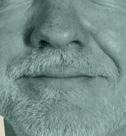





 Alan O’Neill Managing director of Kara, change consultant and speaker
Alan O’Neill Managing director of Kara, change consultant and speaker

Imitation versus innovation
rest is history. A specialist in user experience he also invented the scroll bar and mouse-click, where the cursor could be placed anywhere on the screen with the help of a mouse.



Although ‘copy and paste’ was a revolutionary concept back then, we all ‘copy and paste’ ideas and business models all the time. Let me share some examples that you might like to ‘copy and paste’ into your business.
People: An essential ingredient for delivering your strategy is an e ective organisation structure. You need a structure with clear reporting lines and accountabilities. If you haven’t revisited your structure chart recently, it might be worth refreshing it now and ‘copying and pasting’ the best bits from others. Are there any changes to your model that might prompt a restructure? Have you any acquisitions or divestments in your pipeline? Do you have any pending changes to your customer target market, your product mix or route to market?
Product: I was working recently with a convenience chain retailer, to help them develop a new strategy. During the initial discovery phase, I felt that their stores were quite mundane and almost boring. Each one was pretty much a ‘copy and paste’ of a centrally designed model, which of course is typical for any large chain.
Over and above the ‘copy and paste’ strategy, we also encouraged each store to examine its competitive positioning in its local market. We challenged each one to reconsider its product mix and to ask what it could ‘own’ in its locale. What would make them become the ‘go-to-guy’? In one retailer’s case, it now prioritises flowers and has a USP of o ering the ‘best fresh flowers’ in the area. That gives that retailer something di erent to shout about and exploit as a footfall driver.
Can copying ideas be more valuable than inventing something new? We look and the pros and cons





Up to a few weeks ago, I had never heard of the name Larry Tesler. But when I read his obituary recently, I now tip my hat to him. You and I benefit enormously from his work, as it was he that invented the ‘cut/copy and paste’ commands on our various devices.



Tesler was also the man who had the counterculture vision that computers should be available to everyone. Steve Jobs ‘discovered’ him in 1974 and the
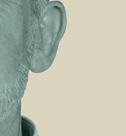
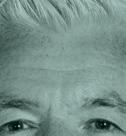

Route to market: I recently met a very ambitious young person who has a passion for fashion. She has developed a beautiful range of tote bags made from various materials, that can be personalised with all sorts of motifs. She ‘copied and pasted’ from the traditional industry route to market and has managed to sell directly to independent retailers. The challenge for her now is to scale up and to get her products listed in larger international department stores. The problem is that because she’s a small business, she’s just not relevant enough to warrant the buyer’s time and the cost of setting up a new supplier account.
This presents two options in my view. One is to find distributors to service big accounts on her



gulfbusiness.com April 2023 11 The Brief / Alan’s Corner
ILLUSTRATION: GETTY IMAGES/CARGO
The Brief / Alan’s Corner
COMMENT

behalf, provided she has enough margin to allow for them to make a profit. Alternatively, a di erent route to market is to sell directly on-line. This will achieve higher margin, thereby giving her money to spend on marketing.
Brand development: There is so much hype and activity today on social media, that businesses feel enormous pressure to have a strong online presence. Yes for sure, it’s worth checking out the competition and ‘copying and pasting’ some norms in your industry. But don’t forget that ‘likes’ are a vanity play unless they convert to sales.

I do understand this digital drive but don’t forget there is value in traditional marketing. It hasn’t gone away you know! Whether it’s paid or earned, advertising, sponsorship, promotions and PR are still very strong pillars of the marketing mix.
Margin: Another negative example is a food company that continues to operate with a ‘copy and paste’ approach to margin. Margin of 25 per cent has
WHY DO WE ALWAYS HAVE TO WORK IN ROUND NUMBERS? AFTER ALL, WITH SALES OF FIFTY MILLION EURO, EVERY HALF PERCENTAGE POINT OF MARGIN EQUATES TO A QUARTER OF A MILLION EURO LANDING STRAIGHT ONTO THE BOTTOM LINE
been the established norm in this industry for years and years, but costs continue to grow at a steeper trajectory than margin. Insurance costs, payroll and supply chain all take bigger chunks than before. I have challenged this client to aim for 27.5 per cent margin. I know it’s an odd number but I’m making a point. Why do we always have to work in round numbers? A ter all, with sales of fi ty million euro, every half percentage point of margin equates to a quarter of a million euro landing straight onto the bottom line.
THE LAST WORD
Plagiarism is an unfortunate outcome of this ‘cut/ copy and paste’ technology, so be careful. What I’m describing here is about being sensible and appropriate. But more importantly, don’t forget that one of the other great advantages — and probably the best part of Larry Tesler’s breakthrough, is the ability to edit a ter ‘copying and pasting’. Use the edit function wisely as you select ideas and business models for your business.
12 April 2023
COMMENT

Why mentoring makes a di erence



Make it an assignment. If mentoring is everyone’s business, it becomes no one’s, so the nominating committee should designate a board veteran to formally serve as ‘concierge’. As part of a proper new member orientation programme, include an outline of items the mentor should cover with the newbie. Vague ideas typically don’t result in any benefit, but checklists do.
Don’t assume that mentoring is a oneway process. A first item for the mentor is to ask what the mentee wants to know, unanswered questions, and what sort of a learning process will be most e ective. This can shape another checklist, but this one for both the mentor and the mentee. Also, seek some more general thoughts from the new director on what she or he hopes to gain and learn from this new board experience.

Start as soon as feasible. The mentor shouldn’t wait until the day of the first board meeting to connect. Along with phone calls and messaging, schedule lunch or at least a cup of co ee for face-to-face familiarity. As a mentor, think back to things you didn’t know before your first board meeting, and what could have made you more comfortable.
Introduce the mentee to others. At the mentee’s first board meeting, work with the chair to host and introduce the new director. Typically the chair o ers introductions, but there is no reason why the mentor can’t add some personal input that other directors aren’t familiar with. Don’t hesitate to talk about the skills – give the message that your board is lucky to have this newbie.
When it comes to onboarding new board members, mentoring can play an important role. A mentor can provide guidance, insight, and support, as the new member gets up to speed with his or her role and responsibilities. They can also help the new member navigate the culture, understand the goals and objectives, and connect with other key stakeholders.

When selecting a mentor, it’s important to choose someone who has experience and



expertise in the area you’d like the new board member to focus on. The mentor should have good interpersonal skills and be able to communicate e ectively.
Overall, mentoring is supposed to help ensure a smooth transition for new board members and set them up for success in their role, typically it fails on the follow through. We advise novice directors to seek a mentor, and encourage the board itself to assign one, but what next? What makes up an e ective board mentoring action plan?
Post meeting, schedule a debriefing with the fledgling member. What were the first impressions? What things seemed most unfamiliar, and need further preparation? What observations on board chemistry, meeting flow and operations? This reverse mentoring is valuable – you have someone seeing how your board works with fresh eyes, and who usually has some outside board experience of their own. Share these valuable insights with the board chair and management.
gulfbusiness.com April 2023 13
The Brief / Training
ILLUSTRATION: GETTY IMAGES/JOHNWOODCOCK
Ralph Ward, global board advisor, coach and publisher, and Dr M Muneer, consultant, author, co-founder of the non-profit Medici Institute
Mentoring could help ensure a smooth transition for new board members and set them up for success in their role
As much as possible, the mentor should also o er the above support, liaison and follow up for committees the new member serves. Most tactical board work happens at the committee level now, and orienting new members to this crucial role is o ten overlooked. Work with committee chairs to shape a good orientation plan for each of these, particularly those with complex portfolios, such as audit or compensation.
Here are some best practices for board mentoring:




01. Define the mentoring relationship: Establish clear and specific goals for this such as learning about the enterprise, connections with other board members, or gaining expertise in a specific area.
02. Match the right mentor and mentee: The mentor and mentee should complement each other’s strengths, experience, and goals.
03. Regular communication: Schedule regular check-ins between the mentor and mentee to monitor progress and provide feedback.
04. Provide access to resources: Provide resources such as enterprise financials, charter, key issues, and connections to key stakeholders.
05. Encourage open communication: The mentee should feel comfortable asking questions and receiving constructive feedback, and the mentor should provide clear and actionable advice.
06. Encourage professional development: Encourage the mentee to attend training and professional development opportunities such as conferences and workshops to enhance their skills and knowledge.
07. Celebrate success: Celebrate the mentee’s achievements and progress, both big and small, throughout the mentoring relationship.
08. Evaluate the mentoring relationship: Regularly evaluate the mentoring relationship to ensure it is meeting the goals and expectations of both of them.
AN OASIS OF INVESTMENT OPPORTUNITIES



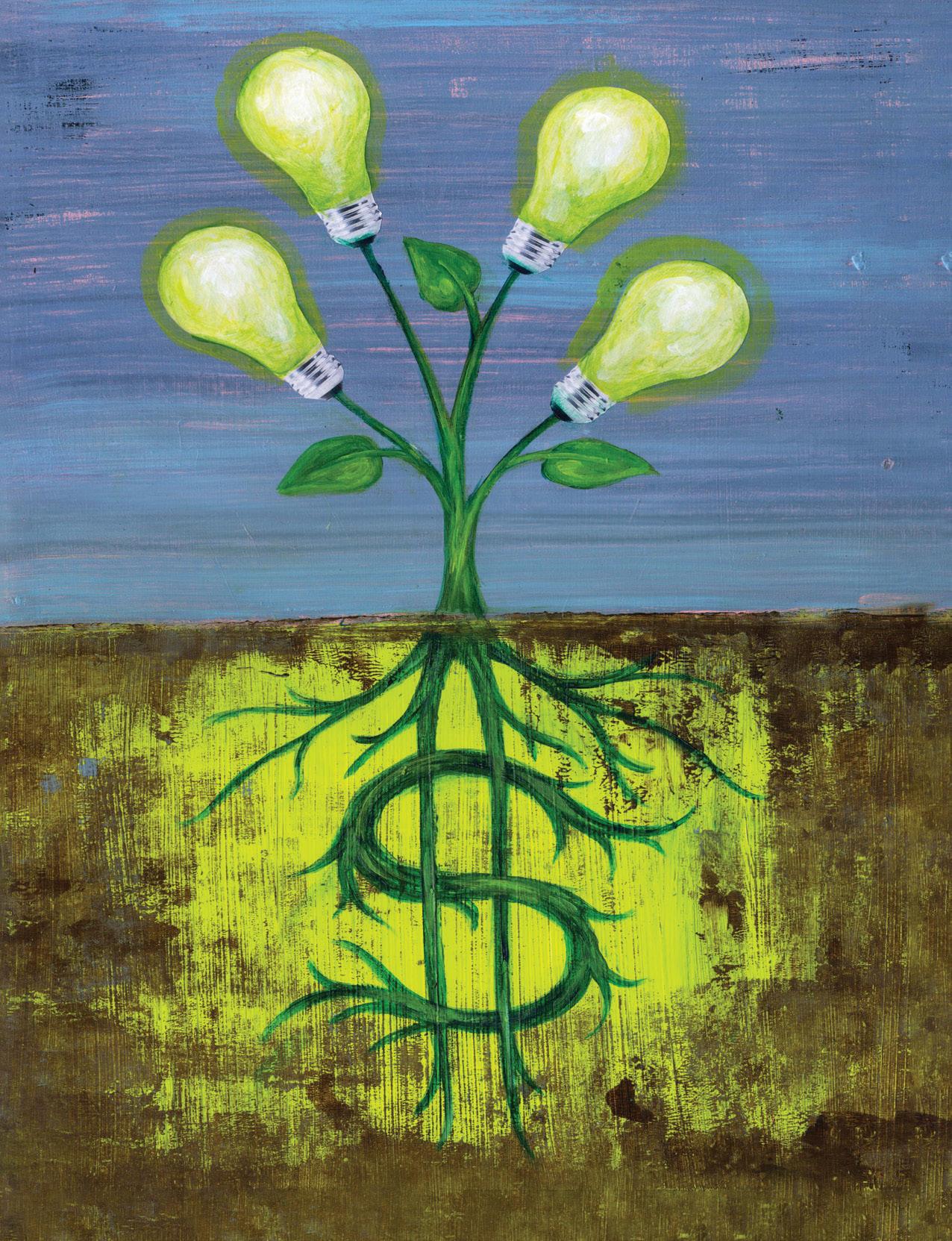
The venture capital market may have plummeted last year, but the Middle East and Africa (MENA) has witnessed a flurry of activity as deals dry up in other parts of the world. A ter a record-shattering 2021, the world entered a parallel universe of investor caution last year amid a slowing global economy, geopolitical tensions and steep valuation resets that fuelled mass layo s across the tech industry.



The story is di erent in the Middle East – home to some of the world’s biggest sovereign wealth funds – where investors are flush with cash from last year’s oil boom. Similarly, GCC countries have done well thus far in supporting small and medium-sized enterprises (SMEs),
a sector that is central to governments’ economic diversification and job creation strategies.

MAGNiTT, a Dubai-based research firm, said that though there was a decline in funding and deals in the last quarter of 2022, the latest data shows sustained levels of funding and a steady number of transactions in the Middle East, Africa, Pakistan and Turkiye (MEAPT) region.
Dealmaking in the Middle East is being led by the UAE, which accounted for nearly 50 per cent of the total venture funding between 2018 and 2022. S&P Global attributed the growth in venture funding in the Middle East to the growing technology adoption and the shi t from high dependence on oil revenues, which
gulfbusiness.com 14 April 2023
The Brief / Training
ILLUSTRATION: GETTY IMAGES/FANATIC STUDIO
The drive for economic diversification and statebacked initiatives together with financial support for startups is fuelling Middle East’s venture capital industry, finds Kudakwashe Muzoriwa
is creating investment opportunities and attracting global venture capital firms to the region.
The Middle East is emerging as a bright spot for venture capital investments, as the regional outlook looks promising driven by robust oil prices, fiscal surpluses from hydrocarbon receipts and ongoing economic diversification programmes.
Signalling a positive outlook, thanks to the region’s growing appetite for innovative technologies, the fintech sector is expected to retain the lion’s share of venture capital investments going into 2023.
What is driving growth?
State support for startups and entrepreneurs is driving the establishment of venture hubs in some Middle Eastern countries such as the UAE, the biggest beneficiary of venture funding over the last four years. Egypt, Jordan and Saudi Arabia have followed the same strategy and they are second, third and fourth respectively.
Last year was one of the best for emerging venture markets, with funding exceeding $7bn in a row, even as markets such as Southeast Asia struggled with tight liquidity due to high-interest rates – part of central banks’ broader strategies to bring inflation down to sustainable levels.
Despite the turbulence in the emerging markets, MENA-based startups attracted significant interest from investors as funding levels crossed the $3bn mark led
by a 72 per cent increase in funding for Saudi Arabian firms and an increase in transactions that were closed in Egypt.
Countries such as the UAE and Saudi Arabia have recognised the importance of venture debt and building on those achievements in the GCC, hence the region will remain a vibrant player in the global venture capital market. “There is substantial evidence that accelerators, incubators, corporate innovators and government-led initiatives play an essential role in the growth of companies,” said PwC.
Government-led initiatives such as Abu Dhabi’s Hub71, Dubai’s Dtec and DIFC Fintech have therefore bolstered the growth of the venture capital industry in the region. State-sponsored events such as Biban, Saudi Arabia’s largest startup and entrepreneurship conference, are equally contributing to the growth of MENA’s venture capital ecosystem by connecting ideas with capital.
The MENA region’s tech-savvy population of Gen Z, Millennials and Gen X coupled with its high smartphone penetration rate makes the region a fertile ground for digital solutions. The increased adoption of e-commerce and fintech solutions over the years haS accelerated the growth of the startup ecosystems as investors are attracted by success stories from home-grown companies such as Careem,
$541m TOTAL VC DEBT BY SECTOR (2018-2022) $332 $69 $50 $32 $25 $17 $16
Souq.com, Swvl and music streaming platform Anghami.
Indian consultancy firm Redseer projected that MENA’s digital economy will hit $100bn by 2023, up from around $45bn in 2020, as the “robust enabling logistics coupled with strong regulatory backing will propel sectors such as e-tail, travel, edtech, fintech and healthtech.
“Fintech continues to dominate venture investments with $332m, 61 per cent of total venture debt funding, raised between 2018 and 2022, followed by e-commerce, transport and logistics, enterprise so tware and healthcare.”
The shape of things to come
While concerns over high interest rates and a looming recession have impacted global venture investments, the MENA region is an increasingly attractive emerging market. State investors including Public Investment Fund and Mubadala Investment Company have ploughed millions of dollars into startup firms to drive economic diversification and create employment for the region’s youthful population.
Local venture capital firms such as Wamda, Middle East Venture Capital, Saudi-based STV and Sharooq Partners are also bullish about the outlook and they are on the lookout for deals as they seek to grow the Middle East’s Silicon Valley.
Regional financial hubs such as Dubai International Financial Center and King Abdullah Financial District have emerged as favoured destinations for venture capital firms that are being drawn by the ease of doing business.
Global venture capital firms have been trooping into the region to tap into its growth opportunities. YCombinator, Sequoia Capital and Techstars are among the global venture capital firms that have opened their doors for business in the region in recent years.
Transport & Logistics
2018 IN MILLIONS SOURCE:
industries
gulfbusiness.com April 2023 15 The Brief / Venture Capital
FUNDING
– 2022 Fintech
Other
Startups and SMEs need funding to grow and Middle Eastern countries are facilitating the growth of a sustainable venture capital industry. The confluence of the region’s digitally connected population, state-backed structural reforms and the abundance of liquid capital have created the ideal conditions for a thriving venture capital ecosystem. Agriculture e-commerce Media & Ent. Sustainability
MAGNITT
THE YEAR 2022 WAS ONE OF THE BEST YEARS FOR EMERGING VENTURE MARKETS WITH FUNDING EXCEEDING $7BN IN A ROW
The age of sneakernomics
In December last year, Dubai witnessed the global launch of a special edition sneaker: Nike SB Dunk Low Concepts Orange Lobster. Dubai was among the first cities where the coveted sneaker was launched in the world. Avid sneakerheads queued up 48 hours before the launch to grab these pairs. Today, a couple of months later, the same pair goes for over $1,000 –a sweet 400 per cent return over 60 days.
This is nothing new. In 2002, Nike collaborated with a well-known skateboarder to produce a range of sneakers called the Nike SB Dunk Low Reese Forbes Denims. Each pair was priced at $65, with only 444 available worldwide. Fast forward two decades and the same sneakers are being sold north of $29,000 per pair on StockX, a reputable reseller. The collector/owner of the said pair will rake in returns that defy patterns of conventional asset classes and investments. That begs the questions: What led to such a windfall? Is it the rarity of frayed denim textures on shoes? Nike’s reputation? Perhaps the induced scarcity?
The ‘economics’ answer: A bit of everything. But if the same questions were posed to any of the thousand
sneakerheads congregating at sneakers’ conventions, the answers would be more culturally influenced.
For many, sneakers are an identity, a passion they picked up along the way, or just pop-culture paraphernalia. However, for some, they have metamorphosed into an alternative asset class to invest in. The traction of sneakers as an investment instrument is such that the likes of Sotheby’s auction them with pomp and promotions. So, what’s paved the way for the age of ‘sneakernomics’.
The demand-supply dynamics of sneakers

Sneakers are not like gold or silver – inherently scarce bullion assets. So, the majority of sneakers in existence today are mass-marketed and worn by people merely as shoes. Conversely, an investmentgrade sneaker is characterised by robust demandsupply dynamics. The lower the supply or rarer the range of sneakers, the higher the demand, and vice-versa.
However, short-supply sneakers from a relatively unknown brand with no celebrity affiliation cannot generate demand. So, brand reputation and
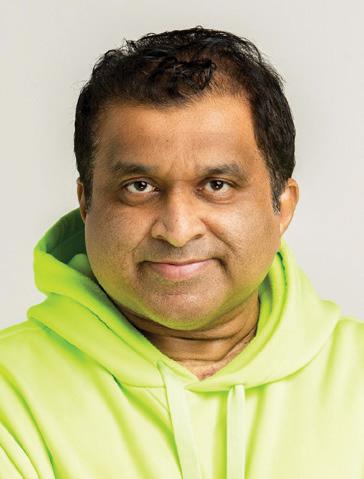
gulfbusiness.com 16 April 2023 The Brief / Alternative Assets
From everyday wear to an alternative asset class, we look at the transformation of sneakers
COMMENT ILLUSTRATION:
GETTY IMAGES/BEN GRIB DESIGN
induced scarcity are prerequisites for any sneakers to find investment value and appreciation with time. Unlike induced-scarcity asset classes such as cryptocurrencies, sneakers are tangible, because of which their value will appreciate with inflation and supply-chain disruptions.
That said, the meteoric rise of Nike’s Denim range is not as prevalent as investors would hope. In fact, a valuation of a sneakers range could nosedive a ter supply outstrips demand – which was exemplified by Adidas Yeezy sneakers a ter collaborator Kanye West decided to ramp up production to enhance access. Likewise, certain sneakers from reputable brands have witnessed skyrocketing prices because of a fan frenzy for months leading up to the launches. As o ten as not, brands perpetuate the ‘hype’ on social media and in sneakerhead communities to orchestrate pent-up demand.
As a result, it is not uncommon to see fans queue before the stores on launch days. Brands also strategise for the new sneakers’ long-term demand, ensuring a cap on how many pairs a single buyer can procure. While the same rule sets apply online, the demand tends to be relatively higher due to more access, leading to server crashes. It is a winwin situation because, for brands, they translate to more frenzy and a long-term outlook for the launched sneakers and, for buyers, the value of their investments appreciates instantly.
As the word is out and the frenzy is documented online, the said sneakers will be in demand for a long time.
Sneakers, like stocks, are sensitive to many factors
While investment-grade sneakers have provided good returns over the years, the asset class continues to be a niche and possibly will never become mainstream. Therein lies its charm because, unlike stocks, sneakers’ prospects hinge on “perceived value” – investors’ own perceptions of a sneaker’s
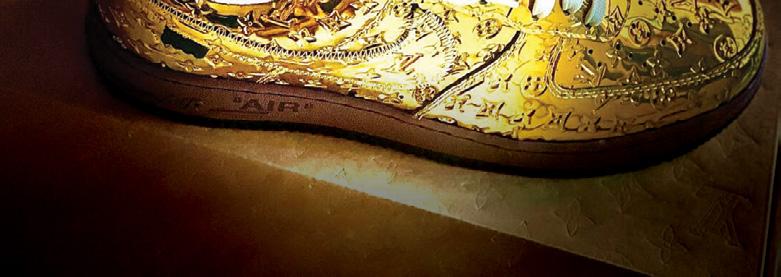
merit or desirability to them. Typically, a limitededition product from a reputable brand must be in unused condition to retain value. An exception is if it is worn by a celebrity.
In fact, it is safe to say that sneakers’ evolution into an asset class was initially fuelled by celebrity endorsements, particularly from larger-than-life basketballers such as Michael Jordan. The ‘sneakers culture’ emanated during Jordan’s zenith in 1985, with the launch of Air Jordan 1, coinciding with the rapid rise of hip-hop.
Artists such as RunDMC collaborated with Adidas Superclub to tap into the burgeoning trend. While ‘Jordans’ have been popular through the decades, they witnessed an upswing following the release of Michael Jordan’s Netflix documentary, The Last Dance, two years ago. Likewise, the unfortunate demise of star Louis Vuitton designer Virgil Abloh saw an immediate spike in all his sneaker creations.

Today, some sneakers also follow art market dynamics. When Kanye West switched sides from Nike to Adidas, the Nike Red October from the original Yeezy line became a coveted piece of art – a good dead stock (unused, untried) pair can fetch over $20,000. That is to say, sneakers – like stocks – are driven by consumer sentiments. So, it is advisable to read and time the market well before splurging on sneakers, which, as o ten as not, tend to be expensive. Like any investment instrument, sneaker reselling requires a strong understanding of the brands, authenticity, and appraisal mechanisms. The lexicon alone – PADS (passed as dead stock), DSWT (dead stock with tag), etc – will take time to get acquainted with, whereas actual transactions could run into further complexities.
Yet, by 2030, the sneakers resale market is projected to grow to $30bn from the current $10bn. The primary rationale behind such bold projections is that sneakers do not follow conventional market economics; they are driven rather by a community spirit – an unconditional desire among sneakerheads to own, associate with, and promote a thing as simple and utilitarian as shoes. And if such a passion is known to lead somewhere, it is success.
gulfbusiness.com April 2023 17
BY
“UNLIKE INDUCED-SCARCITY ASSET CLASSES SUCH AS CRYPTOCURRENCIES, SNEAKERS ARE TANGIBLE, BECAUSE OF WHICH THEIR VALUE WILL APPRECIATE WITH INFLATION AND SUPPLY-CHAIN DISRUPTIONS”
2030, THE SNEAKERS RESALE MARKET IS PROJECTED TO GROW TO $30BN FROM THE CURRENT $10BN
Atul Hegde, founder of YAAP, a tech and data-led content company
$30BN $10BN 2030 2023
Nike Louis Vuitton Air Force 1 sneakersone of the author’s prized possessions
Healthy investments
Are deals and valuations resilient for the healthtech sector in 2023?

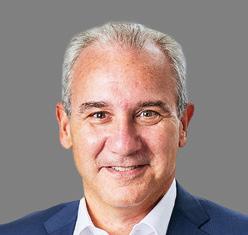
Digital technologies have become even more integral to daily life, and innovation in the digital healthcare sphere has progressed at unprecedented scale. However, in 2022, we saw “growth at all costs” give way to strong unit economics and judicious bottom lines. This trend of cautionary investments is expected to strengthen in 2023 with FOMO (fear of missing out) investing vanishing.
Significant investments were made in the healthcare sector during the pandemic leading to high valuations, however one of the key questions remains - how many of those valuations will stand the test of time?
In the current climate of top line pressure and funding shortages, healthtech firms can no longer solely rely on private equity (PE) support, having to find new ways to continue to grow their businesses. Companies will need to assess whether they have enough money and technology backbone to o er more to their existing customer base, or enough resources to cater to a new audience. Failing that their options will be to cut costs or look to the M&A (mergers and acquisitions) market. Over the past three
years, it seemed like a safe bet to bank on the digital acceleration and innovative solutions in healthcare as secular trends drive successful investments. Assets at the intersection of these two trends saw their valuations rise to very high levels. During the pandemic a significant amount of dry powder was used to fund startups; and only a select few in the biotech and healthtech sector accelerated to the IPO stage. As per Refinitiv data, in the biotech sector, globally there were 152 offerings in 2021 that had raised over $25bn; however, this plummeted to 47 IPOs last year which raised a total of about $4bn. Globally, IPOs across all sectors nosedived in 2022 a ter a blockbuster 2021, as aggressive interest rate hikes by central banks to curb inflation put an end to the era of ‘cheap’ money.
In recent months, we have witnessed that major players in the tech industry have su ered a market collapse and some companies have indeed lost value, but most of them have had to face a significant downfall, including healthtech companies. The market currently is recessionary, and funding from backers is not as easy to come by,
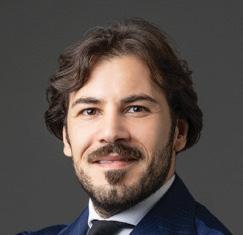
especially as the cost of capital is expensive and the availability of debt is going down. Supply chain challenges, inflation, interest rate hikes and investor pullback reversed investment momentum, and the valuations are not what they used to be.
RETURN TO PRE-PANDEMIC LEVELS
Due to the Covid-19 pandemic, this particular asset group became very expensive, in turn becoming less attractive to corporates. Now that valuations are returning to prepandemic levels, corporate M&A is on the rise again as corporates recognise an opportunity to acquire cheaper assets while still building synergies with the rest of their business. This will lead to better outcomes for patients, providers, practitioners and ultimately the investors. Healthech firms that need support in terms of cash runway, will look to acquisitions as a path forward, if it feels right.
TRENDS THIS YEAR
Evidently, the digital health industry is shi ting away from point solutions to platform companies. An evolution of consolidation could trigger a ‘vertical rethinking’ and could drive M&A deals and startup innovation. As we go forward, we believe more end-to-end integrated platforms that combine and deliver people centric care in a unified manner are going to be essential. Overall, it may fuel social impact and generate better solutions for healthcare payors, providers and regulators thus improving patient experience and igniting value and outcome-based care. There will also be more integration at an industrial scale as more corporates will be acquiring innovative assets.
Market watchers predict a more robust year for biotech and healthtech deals despite buyers losing access to previously cheap financing that had promoted record M&A activity globally. In this fast paced and complex merger space within the sector, corporate and PE organisations will need to be armed with more than just due diligence and deal support. Deal execution requires keen insights, deep due diligence, strategy that aligns with the buyer and an ability to create value along the complete lifecycle of the acquired target.
gulfbusiness.com 18 April 2023
The Brief / M&A
ILLUSTRATION: GETTY IMAGES/SORBETTO
COMMENT
Jean Laurent Poitou, head of Digital, EMEA and Ali Ayach, senior director with Alvarez & Marsal
Mohammed bin Rashid Al Maktoum
A compilation of quotes from His Highness Sheikh Mohammed bin Rashid Al Maktoum, Vice President and Prime Minister of the UAE and Ruler of Dubai.
Covering the four main themes of Nation, Leadership, Positivity and Life, this collection of quotes by Sheikh Mohammed defines a major part of his vision and thoughts as a statesman.
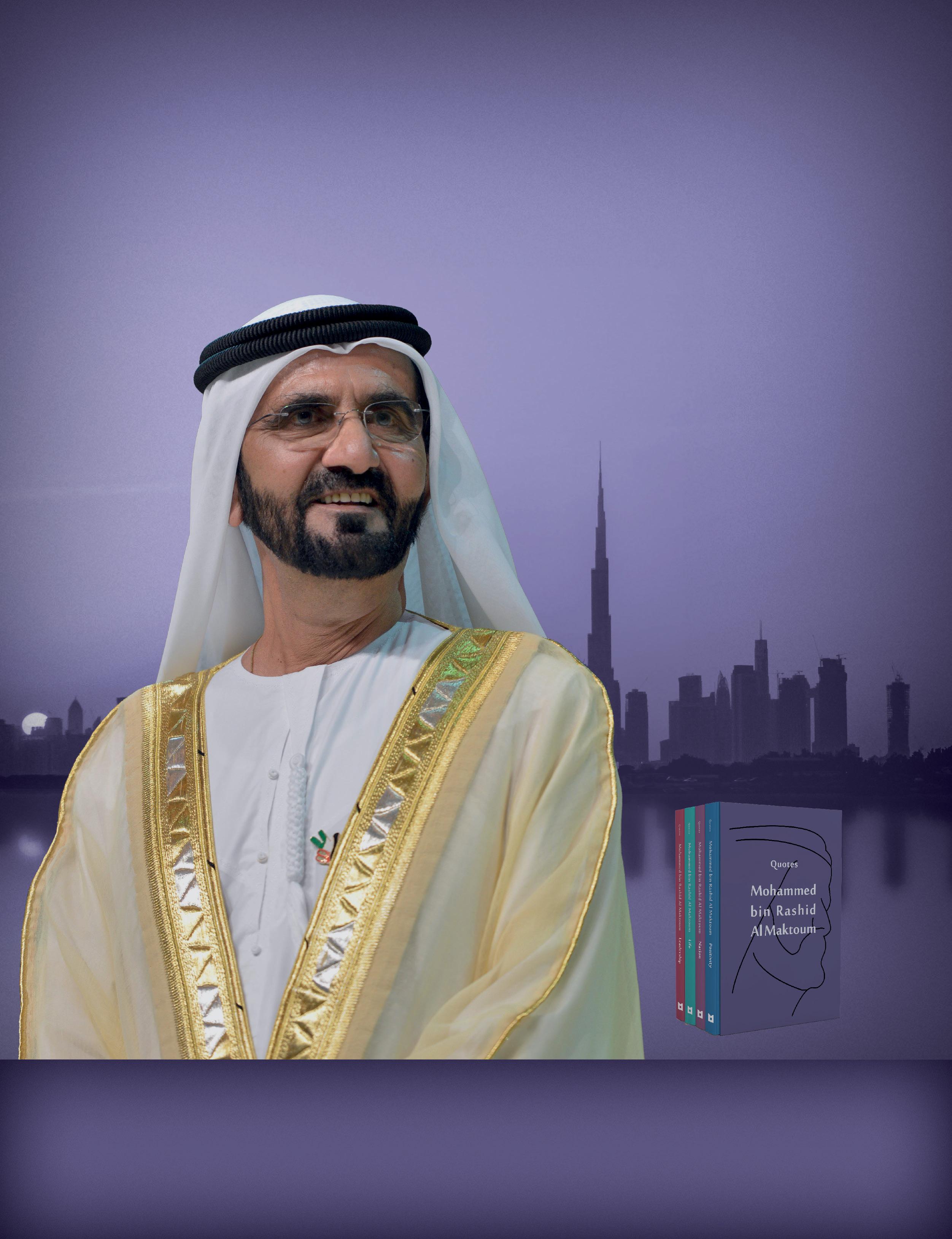
AVAILABLE AT ALL MAJOR RETAILERS AND ON BOOKSARABIA.COM MOTIVATEBOOKS MOTIVATEBOOKS MOTIVATE_BOOKS www.motivatemedia.com
Strong momentum
INITIAL PUBLIC OFFERINGS (IPOs) ACROSS THE MIDDLE EAST AND NORTH AFRICA RECORDED PROMISING GROWTH IN 2022, WITH A POSITIVE OUTLOOK FOR THE CURRENT YEAR
DESPITE GLOBAL CHALLENGES, STRONG GROWTH FOR THE NON-OIL SECTOR WILL ENSURE THAT THE UAE REMAINS RESILIENT
GCC IPOs (2019-22)
NOTES: IPOs, including REIT listings, have been considered in each quarter based on the listing date SOURCES: Refinitiv Eikon, S&P Capital IQ
MENA IPOS HAD A STELLAR 2022, WITH INTEREST AND LIQUIDITY IN THE REGION CONTINUING TO GO AGAINST GLOBAL TRENDS. 2023 WILL BE THE YEAR TO WATCH WITH A HEALTHY IPO PIPELINE ACROSS THE REGION AGAINST A BACKDROP OF A CHALLENGING AND VOLATILE GLOBAL ECONOMIC ENVIRONMENT”
— Brad Watson, EY MENA Strategy and Transactions Leader
The year 2022 marked a record year for MENA IPOs with a year-on-year growth of in total proceeds raised from both state-owned and private companies
179%
gulfbusiness.com 20 April 2023 The Brief / Infographics
20 7,Proceeds ($m) Number of IPOs SOURCES: Refinitiv Eikon, S&P Capital IQ $m Number of IPOs 10,000 8,000 6,000 4,000 2,000 20 15 10 5 0 15 9,230 7 9 3,958 Q1 22 Q2 22 Q3 22 Q4 22 7,262 1,524 MENA IPO activity - 2022 REITs: REAL ESTATE INVESTMENT TRUSTS ALL DATA ARE NORMALISED TO A SCALE OF 0 TO 100, WITH 100 THE BEST SCORE
$m Number of IPOs 35,000 28,000 21,000 14,000 7,000 50 40 30 20 10 0 33,033 2019 2020 1 2021 2022 Proceeds ($m) REITs listed Number of IPOs 12 7 17 47 2 1 2 1,776 7,292 21,783
MENA IPO overview
2022 IPO activity
KEY FACTORS TO
Sources: EY analysis, Dealogic / NOTE: 2022 refers to the full calendar year and covers completed IPOs from January 1 to December 5, 2022, plus expected IPOs by 31 December 2022 (forecasted as of December 5, 2022)
EMEIA exchanges
gulfbusiness.com April 2023 21
CONSIDER
IPO CANDIDATES SOURCE: MENA IPO EYE: Q4 2022 AND YEAR-END REPORT SPAC: SPECIAL PURPOSE ACQUISITION COMPANY / EMEIA: EUROPE, THE MIDDLE EAST, INDIA AND AFRICA
SOVEREIGN WEALTH FUND INSTITUTE
FOR
SOURCE:
#06 SAUDI ARABIA Saudi Arabia’s Public Investment Fund (PIF) recently maintained the sixth spot in the list of TOP SOVEREIGN wealth funds in the world Q4 2022 20 IPOs $7.3bn proceeds Change q-o-q +54% IPOs +29% proceeds Change y-o-y +143% IPOs +179% proceeds Total 2022 51 IPOs $22bn proceeds NOTES: Quarter-on-quarter change reflects Q4 2021 versus Q4 2022 GLOBAL 2022 2021 Percentage change Number of IPOs 1,333 2,436 -45% Proceeds ($bn) 179.5 459.9 -61% AMERICAS 2022 2021 Percentage change Number of IPOs 130 532 -76% Proceeds ($bn) 9 174.5 -95% ASIA-PACIFIC 2022 2021 Percentage change Number of IPOs 845 1,148 -26% Proceeds ($bn) 120.6 175.4 -31% EMEIA 2022 2021 Percentage change Number of IPOs 358 756 -53% Proceeds ($bn) 49.9 110 -55%
Inflation and interest rates Government policies and regulations Recovery of economic
Geopolitical tensions or situations ESG agenda The Covid-19 pandemic SPAC IPO Number Proceeds $m Stock exchange 2022 2021 2022 2021 London (Main and AIM) 14 9 721 385 Euronext (Amsterdam, Paris) 3 20 609 5,408 Deutsche Börse 2 4 363 1,111 Abu Dhabi (ADX) 1 0 100 0 Czech Republic Prague (PSE) 1 0 23 0 Sweden Spotlight 2 1 5 3 NASDAQ OMX and First North (Stockholm, Helsinki) 0 6 0 1,154 Others 0 4 0 866 Total 23 44 1,821 8,927
activities
A royal wedding: Princess Iman Bint Abdullah II of Jordan and Jameel Alexander


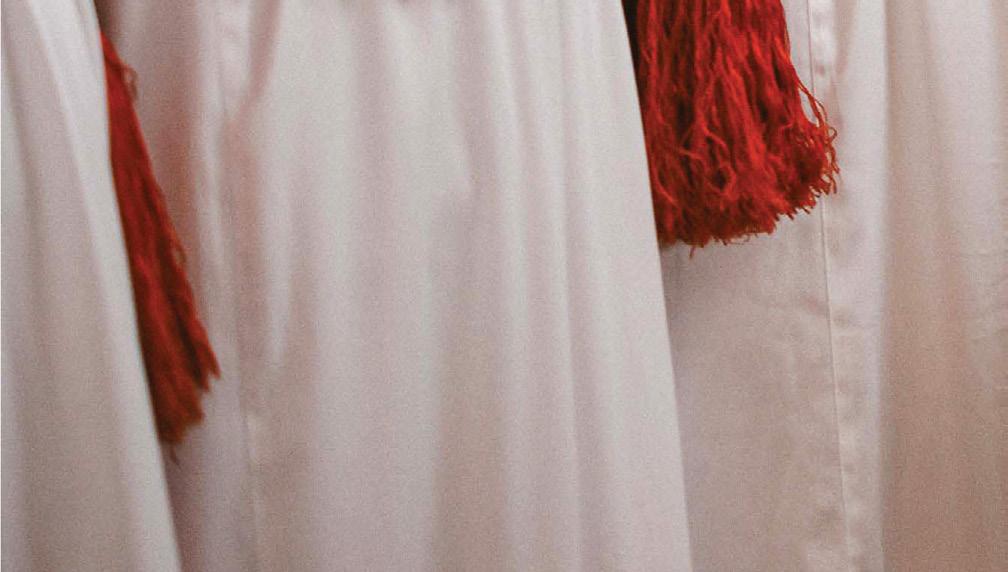
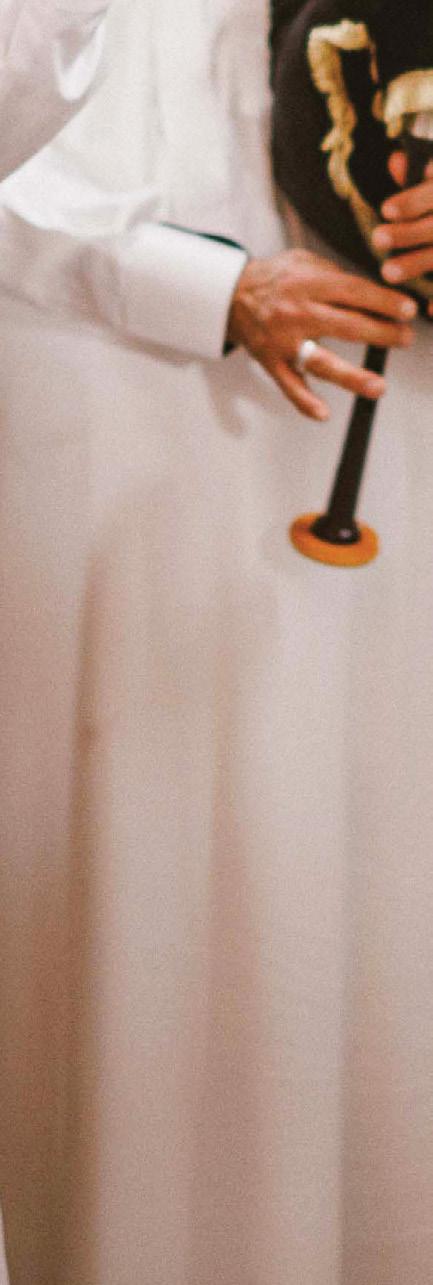
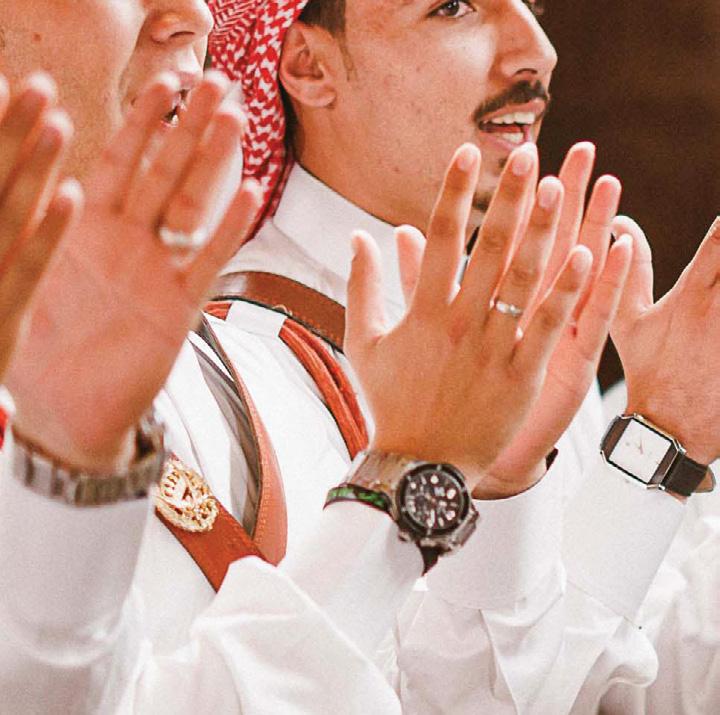
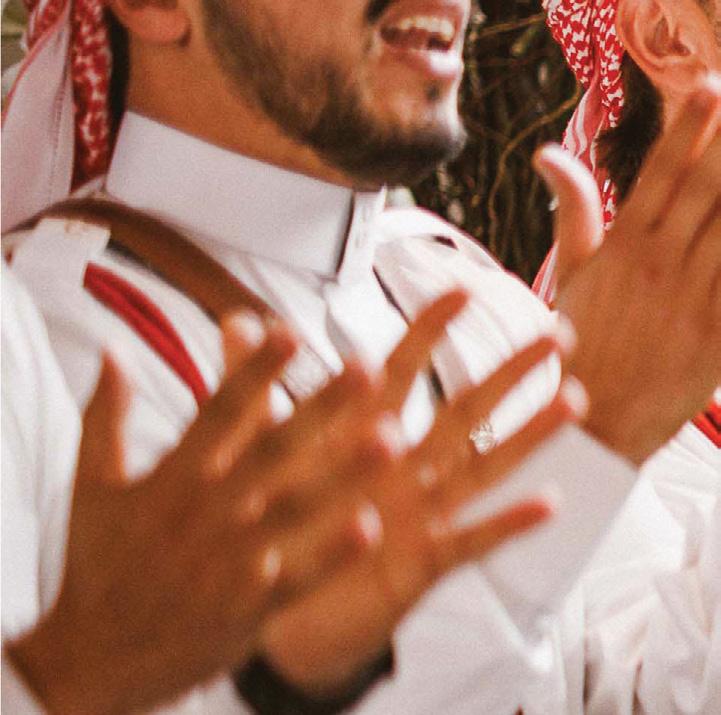
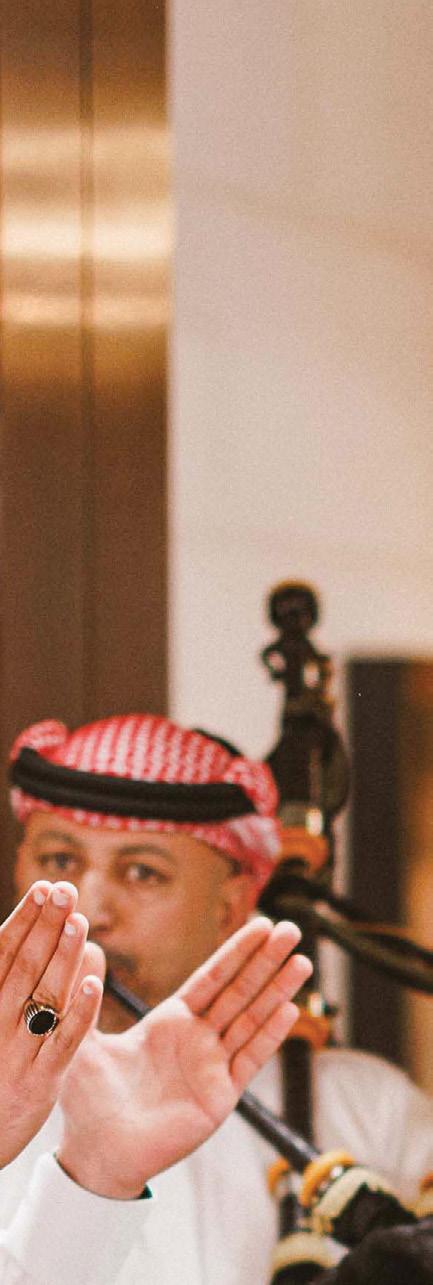
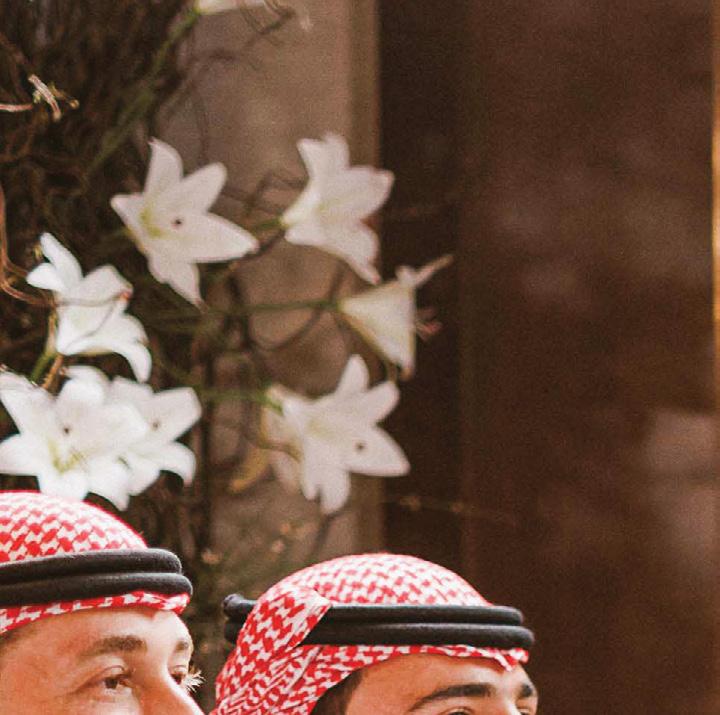
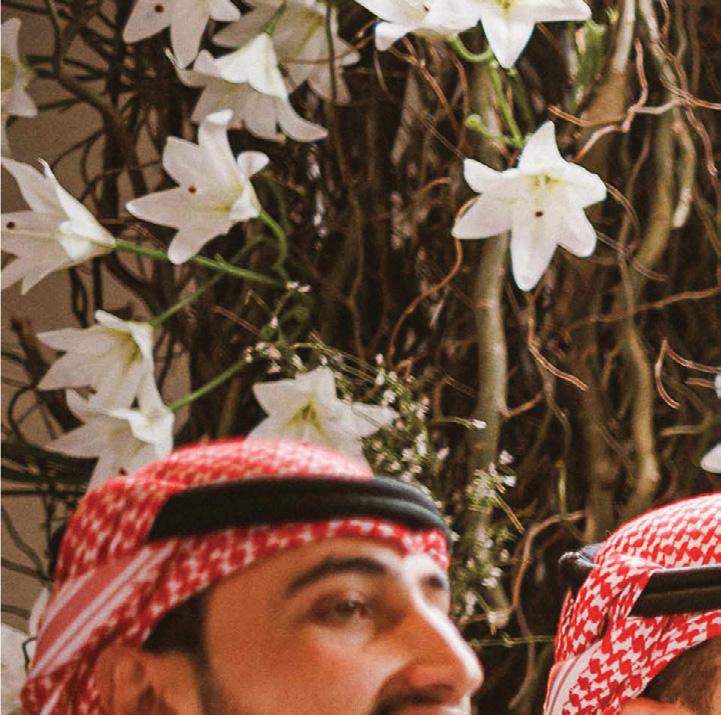
Thermiotis are welcomed as they take their first steps as a wedded couple. The wedding took place on March 12, in Amman, Jordan.


Lightbox gulfbusiness.com 22 April 2023
The Brief /








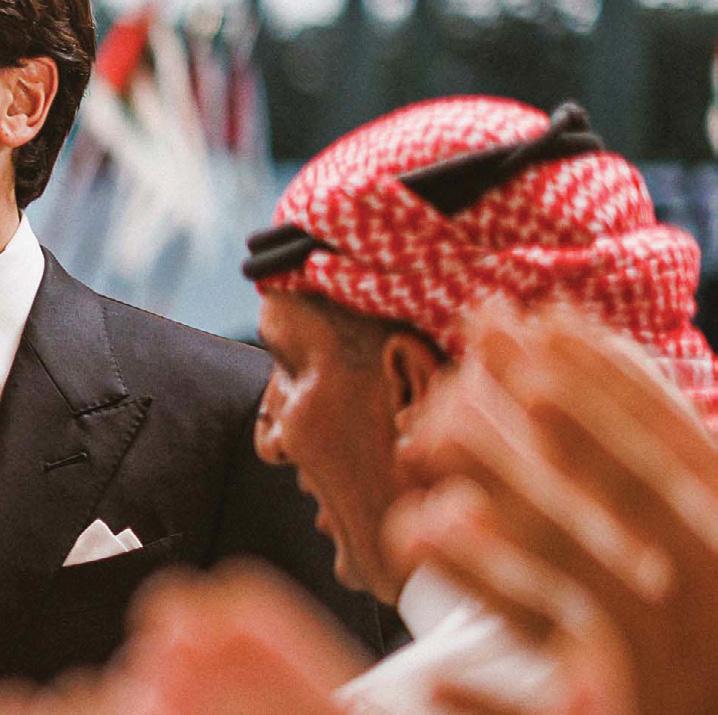






gulfbusiness.com April 2023 23
PHOTO: HANDOUT/JORDANIAN ROYAL COURT/GETTY IMAGES
MORE THAN JUST AN OIL STORY
THE REGION’S SOVEREIGN INVESTORS ARE BROADENING THEIR INVESTMENTS IN VARIOUS SECTORS INCLUDING HEALTHCARE, TECHNOLOGY, PRIVATE EQUITY AND HEDGE FUNDS AS PART OF A DIVERSIFICATION STRATEGY AWAY FROM OIL AND GAS

WORDS: KUDAKWASHE MUZORIWA
The GCC is expected to buck the global recession with its real GDP projected to moderate from 6.1 per cent in 2022 to 3.4 per cent this year.


The oil-rich Gulf economies have grown in relevance over the year, as they have emerged as new bankers to the world and the go-to investors for distressed western assets desperate to raise fresh capital.

Global SWF said the investment momentum by wealth funds that are not from oil-rich countries such as China, Singapore or Korea is ominous. However, the position and momentum of Middle Eastern state investors, especially in the oil-rich GCC, are much better, driven by an average oil price of $99/barrel in 2022 and the currencies’ peg to the dollar.
The region is home to some of the world’s largest sovereign wealth funds (SWF) with more than $3.7tn
in total assets under management (AUM), according to Global SWF – an amount that exceeds the UK’s 2022 GDP.

“As investment arms of any sovereign nation responsible for managing and investing the nation’s wealth in domestic and international markets, sovereign wealth funds play a vital role in the generation of wealth, employment, value creation and the overall sustainability of a global economy,” said Deloitte.
Gone are the days when Gulf investors had a reputation for investing in trophy assets such as Manhattan real estate and Harrods department store. This time round dealmakers say the funds have grown more proactive and strategic when it comes to global investments.


Global dealmakers
The wave of dealmaking by the Gulf sovereign investors began with the outbreak of the Covid-19 pandemic. Once sleepy government holding companies,


FEATURES / GCC SOVEREIGN WEALTH FUNDS gulfbusiness.com 24 April 2023
MUBADALA HAS ALREADY DEPLOYED ABOUT HALF OF THE INVESTMENTS BUILDING ON ITS PLEDGE TO INJECT $978.3M INTO THE UK’S LIFE SCIENCE SECTOR
the funds are emerging as investment vehicles with global ambitions.

The European Investment Bank said the investment strategy of the GCC sovereign funds is to maximise returns on investment and in some cases perform synergies or acquire capabilities that can be deployed in the home countries.
Buoyed with cash a ter oil prices surged to record highs in 2022, Gulf sovereign investors are hunting for opportunities amid volatility in global markets.
GCC state-owned investors spent a combined $89bn on investments last year, double the previous year, Global SWF said in its 2023 annual report, while noting that a colossal $51.6bn of that amount went into Europe and North America.
Saudi Arabia’s Public Investment Fund (PIF) has shi ted its investment strategy over the years to focus mainly on exchange-traded funds (ETFs), technology and gaming stocks. PIF’s largest public holding is a 63 per cent stake in electric carmaker Lucid Motors.
The fund’s US equity holdings grew last year, driven by an additional $7.6bn that was invested in major corporations including the big four technology firms – Google parent Alphabet, e-commerce giant Amazon, Microso t and Facebook’s Meta.
ADIA, Abu Dhabi’s most traditional and conservative wealth fund, has been investing at a high velocity. The fund jointly acquired a 72.5 per cent stake in VTG, Europe’s biggest railcar lessor, in June 2022 for an enterprise value of $7.5bn.
Mubadala is making huge bets on computer so tware, hardware and biopharmaceuticals. The fund invested an estimated $30bn in 2021 and committed to investing $12.2bn in the UK over the next five years. Mubadala has already deployed about half of the investments building on its pledge to invest $978.3m in the UK’s life science sector.
THE INVESTMENT STRATEGY OF THE GCC SOVEREIGN WEALTH FUNDS IS TO MAXIMISE RETURNS ON INVESTMENT AND IN SOME CASES PERFORM SYNERGIES AND/OR ACQUIRE CAPABILITIES THAT CAN BE DEPLOYED IN THE HOME COUNTRY TO BUILD NEW INDUSTRY CAPABILITIES”
— THE EUROPEAN INVESTMENT BANK
GLOBAL SWF ESTIMATES THAT QIA’S OVERALL PORTFOLIO IS SPLIT INTO
Meanwhile, Abu Dhabi’s ADQ has been on an acquisition spree in the emerging and frontier markets. It acquired stakes in five publicly-traded Egyptian companies including Commercial International Bank worth $1.8bn in April 2022. The state investor also joined hands with the Oman Investment Authority (OIA) to explore investment opportunities valued at $8.2bn in the sultanate.
Since its establishment in 2005, Qatar Investment Authority (QIA) has been known for being one of the most active GCC dealmakers. Global SWF estimates that QIA’s overall portfolio is split into 40 per cent Europe, 20 per cent Americas, 27 per cent Qatar and 13 per cent the rest of the world. The fund invested $3.2bn in Europe, including 10 per cent in Germany’s power producer RWE and $1.7bn in the US, including a stake in tech company AIT.
Driving diversification
Sovereign investors in the Gulf region continue to increase in number, size, variety and scope. The state investors are the engines that are driving the transformation of their respective economies in preparation for life a ter oil.
PwC said sovereign funds are not just passive actors, but they are actively contributing to the transformation of their domestic economies.
With a target to manage $1tn assets by 2025 and $3tn by 2030, PIF is the vehicle for Saudi Arabia’s Vision 2030 economic blueprint. The Saudi fund is significantly investing in large initiatives that have not yet been capitalised into its balance sheet. PIF is tasked with stimulating inward investment, accessing new technologies, developing local industries and addressing underemployment.
PIF is funding a host of new cities in the desert including the $500bn futuristic NEOM city, the Red Sea Development Company’s mega tourism project and the Qiddiya entertainment park. Saudi Arabia unveiled a new national carrier, a wholly owned
FEATURES / GCC SOVEREIGN WEALTH FUNDS gulfbusiness.com April 2023 25
ABU DHABI INVESTORS ARE COVERING ALL BASES WITH ADIA MOST ACTIVE IN NORTH AMERICA, MUBADALA INVESTING MORE IN EUROPE IN 2022 AND ADQ INVESTING ACROSS EMERGING MARKETS”
— GLOBAL SWF
40% Europe 20% Americas 27% Qatar 13% Others
LARGEST DEALS OF GCC SWFS IN ‘WESTERN’ ASSETS
FUND ASSET HQ COINVESTOR VALUE
ADIA Ardian Funds France Ardian $6bn
ADIA VTG AG Germany GIP $2.6bn
Mubadala Skyborn Renewables Germany PIF $2.5bn
ADIA Zendesk US GIC, H&F, PA $2.5bn
QIA RWE AG Germany - $2.4bn
ADIA Climate Technology US Blackstone $2.4bn
KIA Direct Chassis Inc US GIC, OMERS $1.5bn
Mubadala Envirotainer Sweden EQT $1.5bn
PIF Savvy: ESL,FACEIT US - $1.5bn
ADIA Merchants Fleet US Bain Capital $1.3bn
Mubadala Pharma Intelligence UK WP $1.2bn
PIF Embracer Sweden - $1.1bn
ADQ Vistria US Vistria $1bn
ADIA Landmark JV US Landmark $1bn
ADIA Apollo S3 US Apollo $1bn
ADIA Rockpoint JV US Rockpoint $1bn
PIF company, in March. Riyadh Air is expected to add $20bn to the country’s non-oil GDP growth and create more than 200,000 jobs both directly and indirectly. The fund is pursuing a two-pronged strategy – building an international portfolio of investments while investing locally in giga projects that will help to reduce Saudi Arabia’s reliance on oil revenues.
The trend of rising domestic investments in the GCC is likely to be sustained by the emergence of new strategic funds with the mission to attract foreign investors into local markets and increased activity of some of the existing funds.
Oman merged its two wealth funds into one entity, OIA, in 2020. The fund’s assets surged to $41.5bn in 2022 and it inaugurated 10 strategic projects worth $1.95bn across the sultanate in partnership with domestic and foreign investors to mark the country’s national day in November 2022.
RIYADH AIR IS EXPECTED TO ADD $20BN TO THE COUNTRY’S NON-OIL GDP GROWTH AND CREATE MORE THAN 200,000 JOBS BOTH DIRECTLY AND INDIRECTLY
WITH $300BN AUM, ICD’S AVIATION PORTFOLIO INCLUDES THE EMIRATES GROUP, FLYDUBAI AND DUBAI AEROSPACE ENTERPRISE
OMAN MERGED ITS TWO WEALTH FUNDS INTO ONE ENTITY, OIA, IN 2020. THE FUND’S ASSETS SURGED TO $41.5BN IN 2022
The bulk of OIA’s investments are in the sultanate, which makes up 61.5 per cent of its portfolio. GCC strategic funds that have large portfolios of domestic assets such as Mubadala and ADQ in Abu Dhabi, Investment Corporation of Dubai (ICD) and Mumtalakat in Bahrain are not expected to suffer losses in the medium-term due to their limited exposure to upheaval in the global markets.
With $300bn AUM, ICD’s aviation portfolio includes the Emirates Group, flydubai and Dubai Aerospace Enterprise. The fund is the principal investment arm of the Dubai government and holds stakes in Emirates NBD, Dubai Islamic Bank, Emaar Properties and Emirates National Oil Company. The fund reported record revenues of Dhs121.1bn in H1 2022 and net profits of Dhs14.8bn.
Flush with cash after the latest oil boom, GCC state investors are expected to be busy in 2023 as the slowing global economy and the turmoil in the financial services sector are accelerating a pivot towards other sectors including healthcare and technology. The funds are likely to be driving forward with the pursuit of ‘cheap’ assets in the US and Europe, chasing deals across all sectors.
FEATURES / GCC SOVEREIGN WEALTH FUNDS gulfbusiness.com 26 April 2023
Source: Global SWF
THE
H1
AND NET PROFITS
DHS14.8BN
FUND REPORTED RECORD REVENUES OF DHS121.1BN IN
2022
OF
SPECIAL REPORT


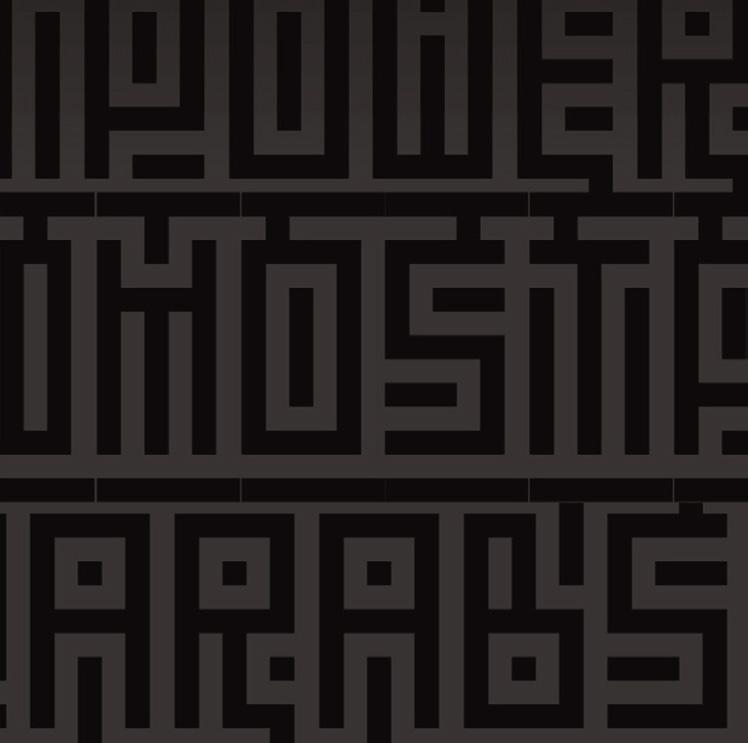

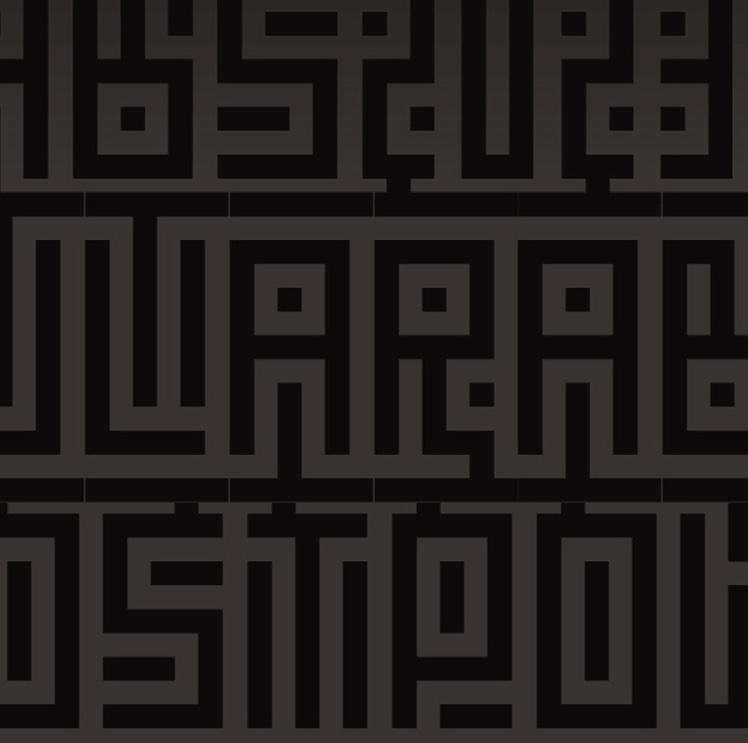



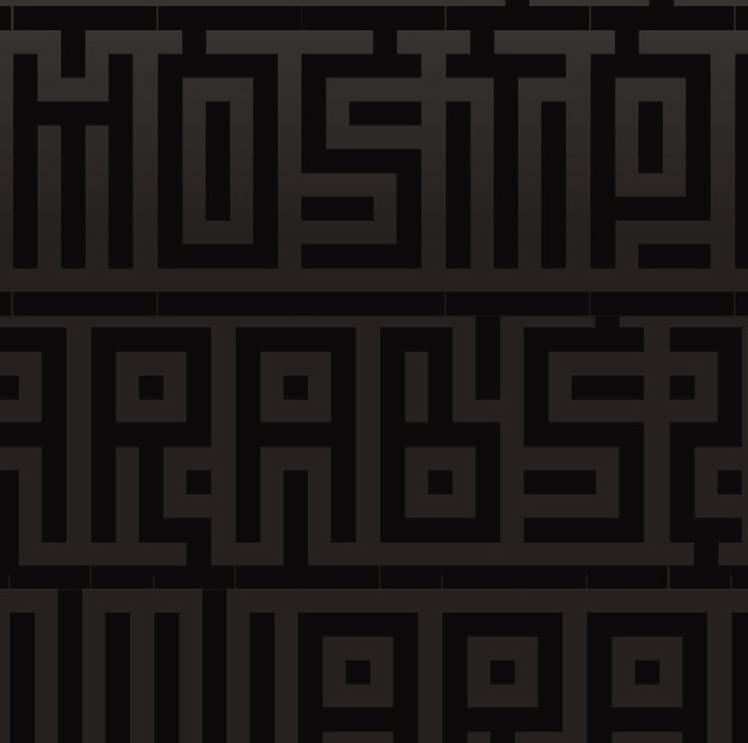

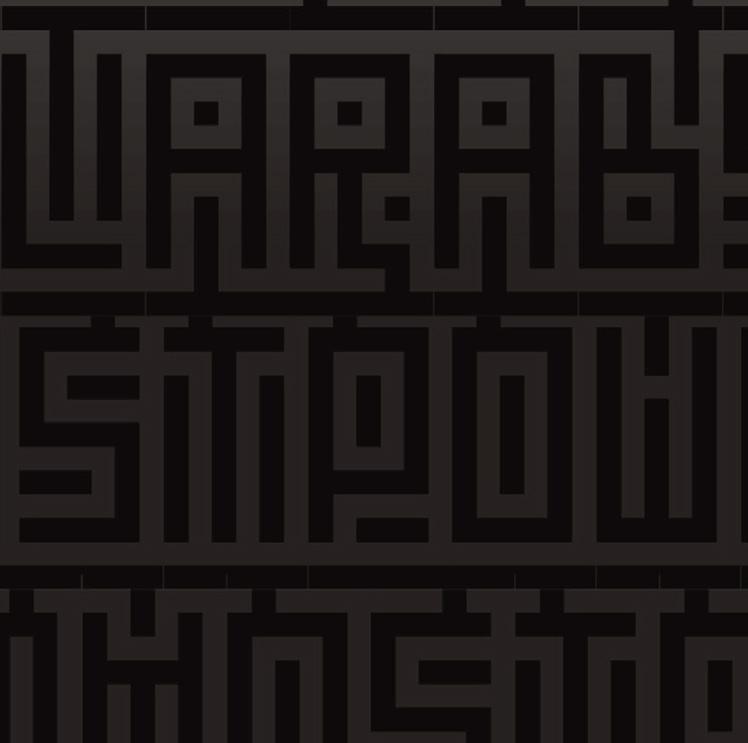



The past 12 months have been truly momentous for the Arab world, from the building of some of the world’s most ambitious infrastructure projects to the hosting of two consecutive UN Climate Change Conferences (COPs) and a listing boom that saw Middle East IPOs fetching more than $18bn.
The Gulf region remains relatively insulated from the confluence of a slowing global economy, geopolitical tensions and volatility in the financial markets, with real GDP growth expected to moderate from 6.1 per cent in 2022 to 3.4 per cent in 2023, according to the International Monetary Fund.
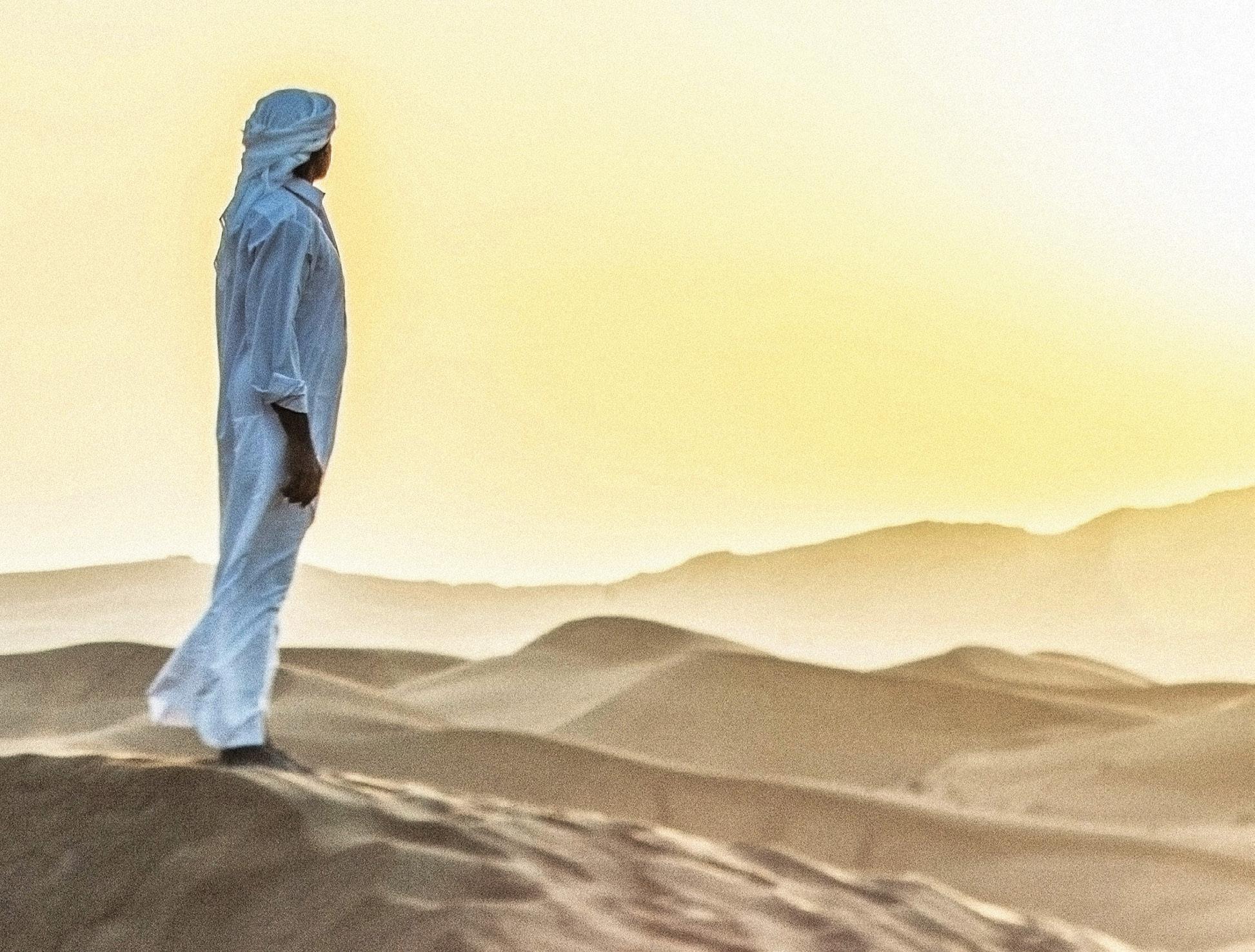
The region is expected to deliver its strongest economic growth in a decade, underscoring the performance of sovereign wealth funds and accelerated investments in
technology, sustainability, advanced industrial manufacturing and tourism.
This year’s power list honours Arab leaders driving and shaping this growth. They range from astute business leaders to notable personalities in industry, sports, entertainment, and culture from across the region and beyond.
Arabs reached new heights in 2022 from space exploration to summiting the tallest mountain in the world and topping entertainment charts. Our female power listers continue to shatter the glass ceiling in the boardroom and beyond. This year, we welcome 12 new entrants to the list – they have made their mark with exemplary contributions across various fields. We also have upward and downward shifts among the honour roll, with a few exiting the list.
Read on to discover who made it to our list...
METHODOLOGY Gulf Business looked at the events of 2022-23 and rated each individual case on the basis of four criteria: financial capital, human capital, expansion plans and level of personal fame. In general, Gulf Business has excluded politicians and royalty, unless the contenders have a strong leaning towards business activity. We have included Arabs from across the world.
28 SPECIAL REPORT
Origin: Saudi Arabia Residence: Saudi Arabia Sector: Diversified 2022 rank: 1
Yasir Al-Rumayyan Chairman, Aramco/governor, Public Investment Fund
Yasir Al-Rumayyan, governor of Saudi Arabia’s Public Investment Fund, has had an enterprising year, steering the sovereign wealth fund’s strategy to diversify the kingdom’s economy and investment in growth sectors. The fund launched several companies to develop the local economic landscape, as well as established investment firms to seek opportunities across the MENA region. Besides its giga-projects, the fund set up Ceer, the kingdom’s first electric vehicle brand by virtue of a JV with Foxconn. Meanwhile, oil giant Aramco, of which Al-Rumayyan is chairman, is targeting to increase its production capacity to 13 million barrels a day by 2027. It also aims to build a petrochemical complex in the kingdom, in partnership with French company TotalEnergies. Al-Rumayyan, who serves on the boards of Uber and Reliance Industries Limited, will also chair new national carrier Riyadh Air.
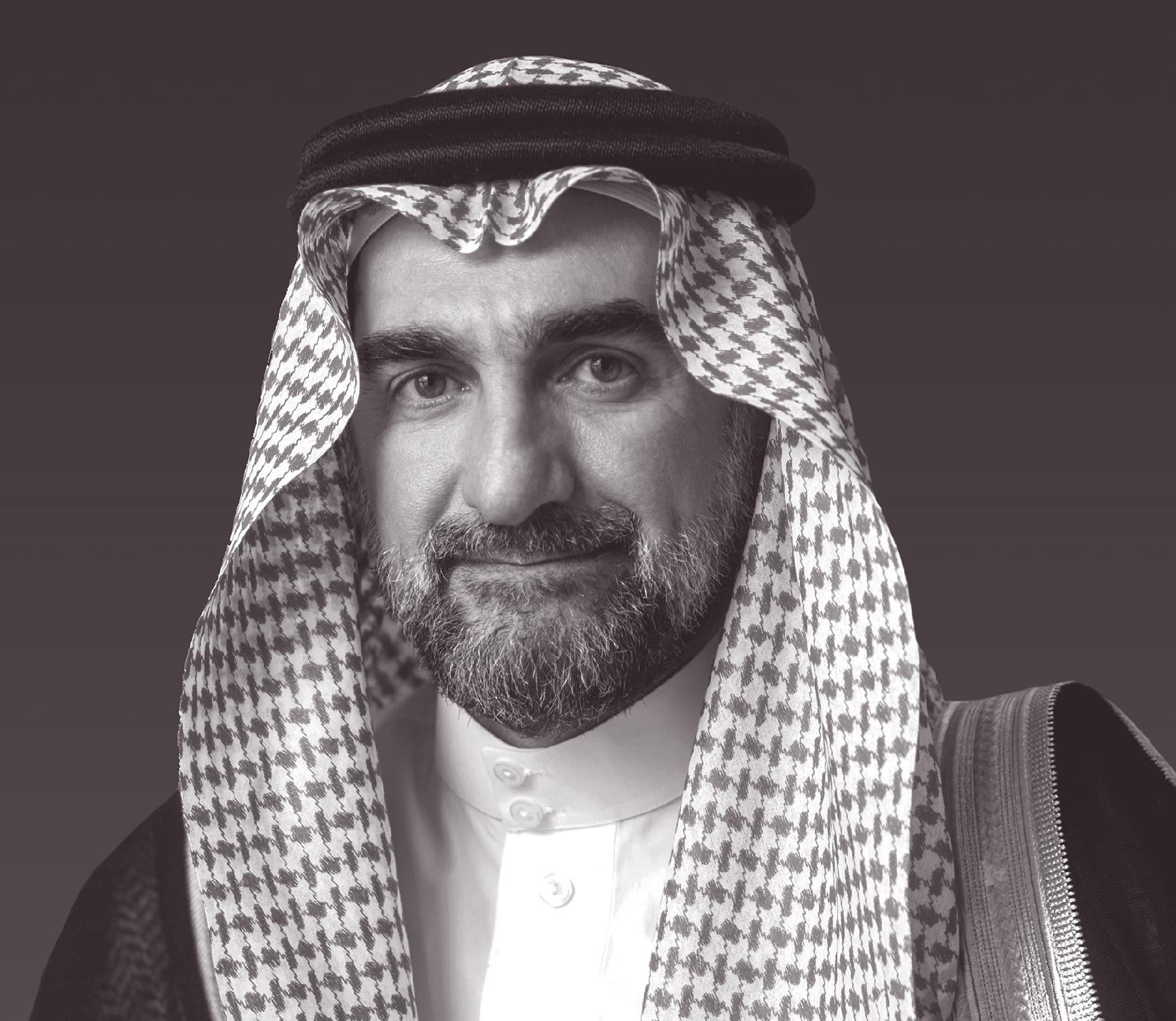
29 SPECIAL REPORT
01
Photo courtesy: Aramco
Origin: UAE Residence: UAE
Sector: Energy 2022 rank: 2
Dr Sultan Al Jaber
Managing director and group CEO, ADNOC
Having led state-owned Abu Dhabi National Oil Company (ADNOC) through key initiatives and achievements, Dr Sultan Al Jaber has retained the second slot on our list. The energy giant announced the discoveries of offshore natural gas resources, awarded contracts to expand production capacity and dispatched its first shipment of low-carbon ammonia to Germany in 2022.
The UAE’s Minister of Industry and Advanced Technology, Dr Al Jaber was named President-Designate of the COP28 climate summit to be held in the UAE later this year, following ADNOC’s announcement that it has earmarked a total of $15bn for decarbonisation projects by 2030.
The company also delivered the first-ever liquefied natural gas (LNG) cargo from the Middle East to Germany in February. Dr Al Jaber also chairs clean energy company Masdar as well.
Origin: UAE Residence: UAE Sector: Diversified 2022 rank: 3
HH Sheikh Ahmed bin Saeed
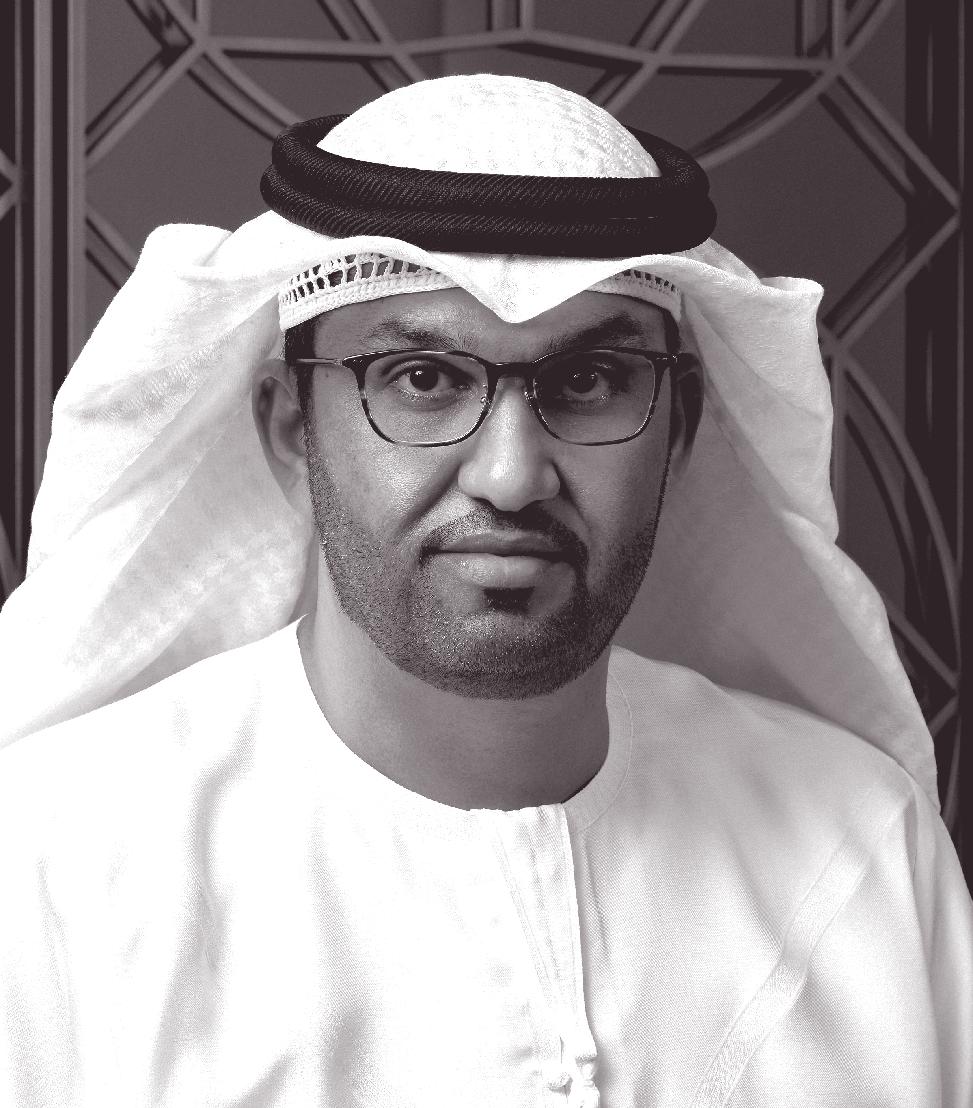
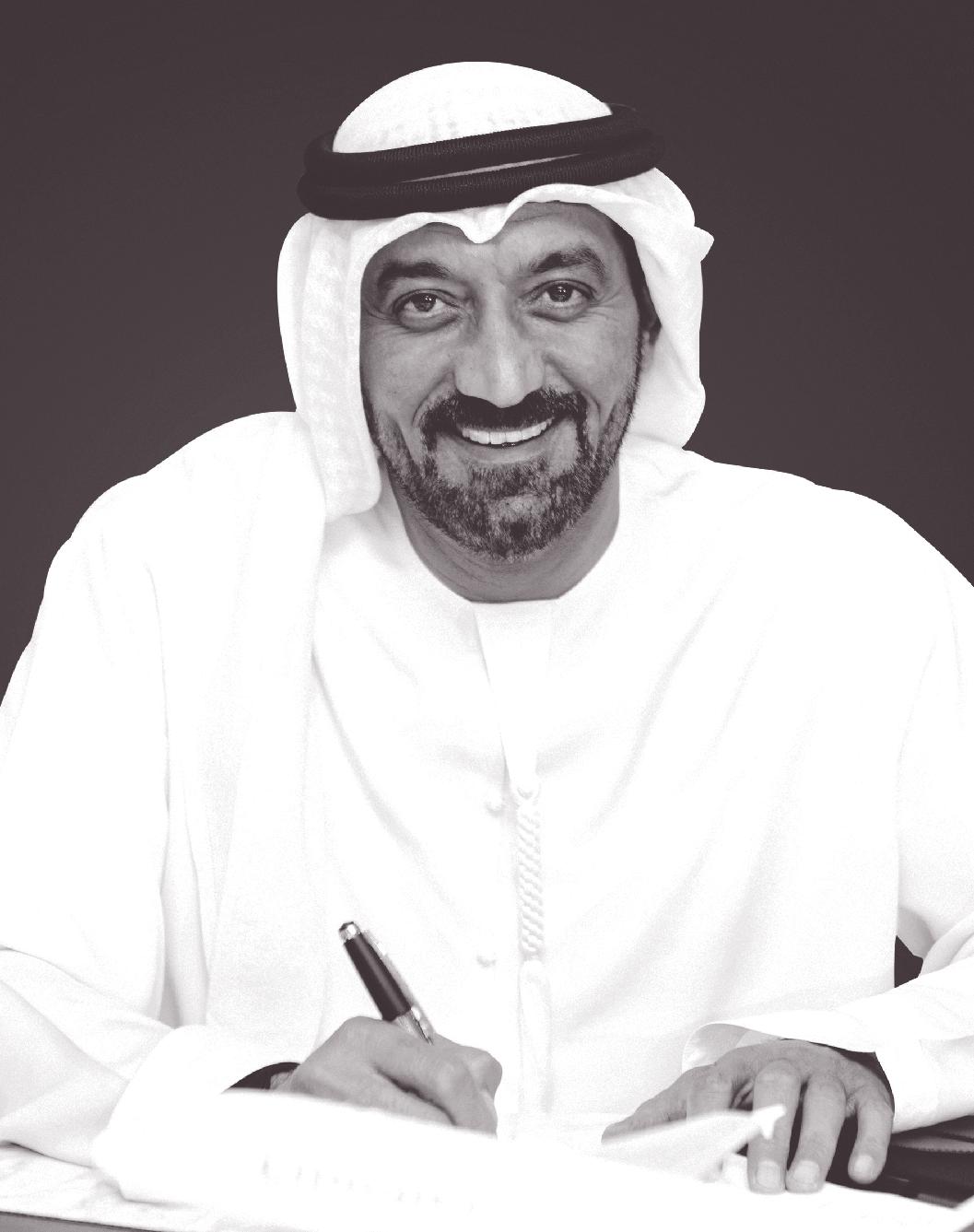
Al Maktoum
Chairman and chief executive, Emirates Group/ chairman, Emirates NBD
Sheikh Ahmed is a man of many roles, all of which he fulfills with remarkable ease. As chairman of Dubai carrier Emirates, he oversaw the group swing to a halfyear net profit of $1.2bn for FY 2022-23. In a year that was filled with hope for the aviation sector, Emirates flew 20 million passengers between April 1 and September 30, 2022, unveiled its Premium Economy cabin on select routes as well as ramped up flights last year. Meanwhile, Dubai-based lender Emirates NBD, of which Sheikh Ahmed is chairman, reported a 40 per cent rise in net profit last year. Besides chairing Dubai Airports and Expo City Dubai Authority, Sheikh Ahmed is also the president of Dubai Civil Aviation Authority.
30 SPECIAL REPORT
03
02
Spearheading state-owned QatarEnergy’s growth strategy and developments, Saad Sherida Al-Kaabi continues to play a critical role in the country’s economic growth. The energy giant roped in international partners for its North Field Expansion project, which aims to raise Qatar’s liquefied natural gas (LNG) production capacity.
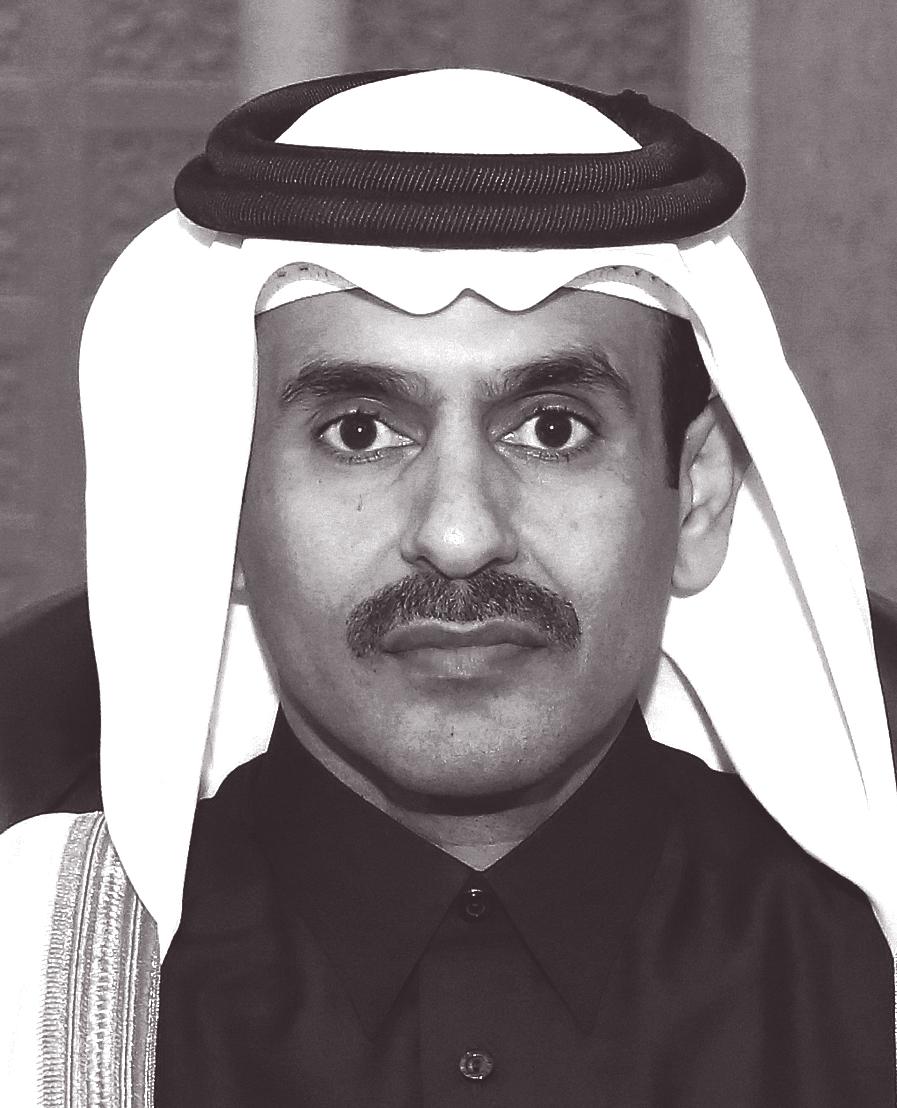
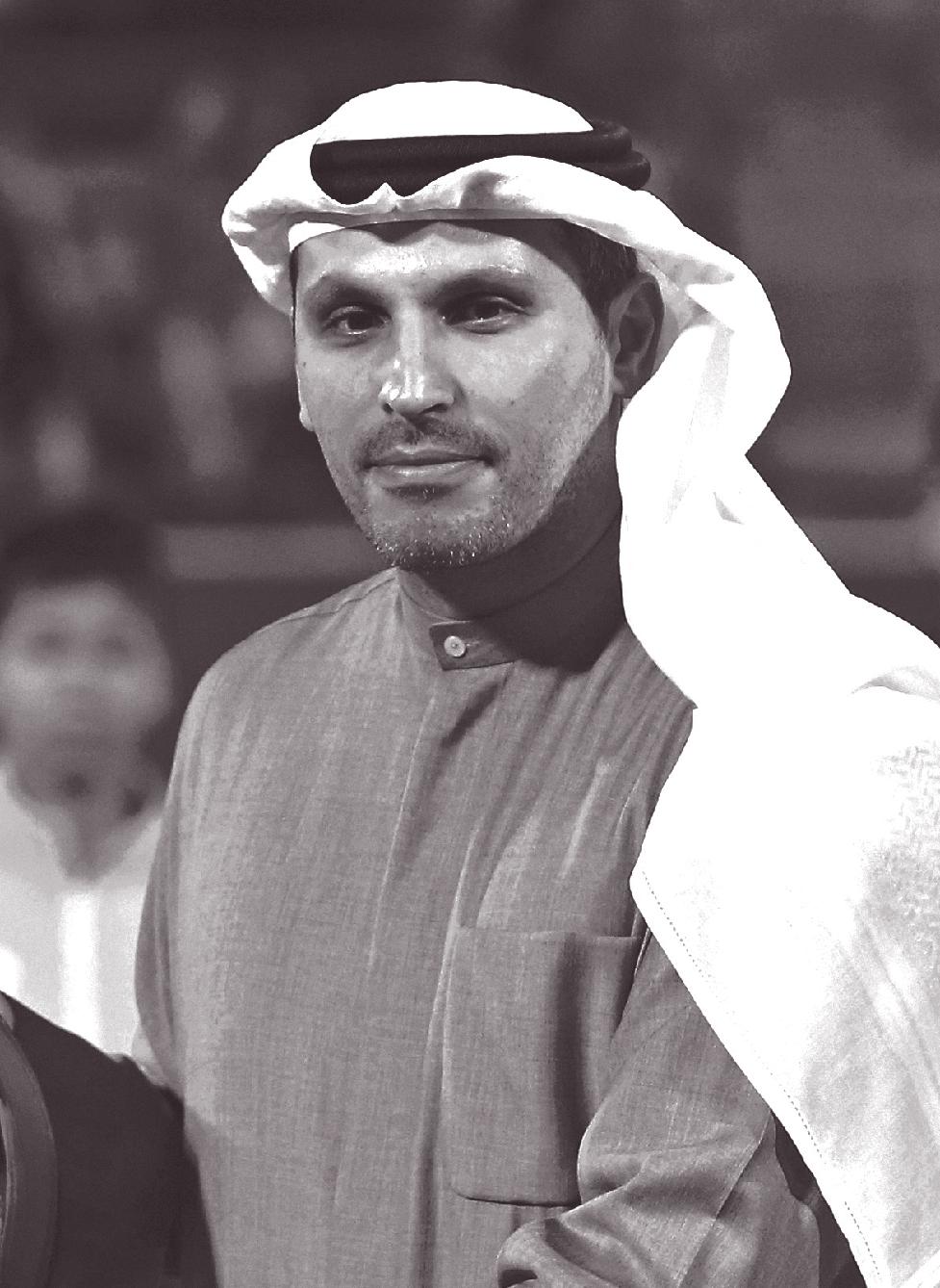
It inked a 27-year deal to supply LNG to China as well as acquired a 30 per cent interest in two offshore exploration blocks in Lebanon. Al-Kaabi was appointed president and CEO of QatarEnergy in 2016, and additionally, as Minister of State for Energy Affairs in 2018. Al-Kaabi, who is also the chairman and MD of Industries Qatar, sits on the board of Qatar Investment Authority.
With $284bn in assets under management and interests spanning multiple sectors and asset classes, Mubadala Investment Company, led by Al Mubarak, is championing Abu Dhabi’s economic diversification agenda.
In 2022, Mubadala acquired a stake in Skyborn Renewables, the world’s largest private offshore wind developer, as well as inked a MoU to advance sustainable mobility in Abu Dhabi and the Middle East region.
In February, it signed an agreement with Oman and Etihad Rail Company to develop the 303km railway network connecting the UAE with Oman. In addition to spearheading Mubadala, Al Mubarak chairs the Emirates Nuclear Energy Corporation, Abu Dhabi Commercial Bank and Emirates Global Aluminium. Al Mubarak is also a member of the Abu Dhabi Executive Council.
31 SPECIAL REPORT
05 04
Origin: UAE Residence: UAE Sector: Diversified 2022 rank: 5
Origin: Qatar Residence: Qatar Sector: Energy 2022 rank: 4
Khaldoon Khalifa Al Mubarak
Managing director and group CEO, Mubadala Investment Company
Saad Sherida Al-Kaabi
President and CEO, QatarEnergy/chairman and MD, Industries Qatar
Origin: Saudi Arabia Residence: Saudi Arabia
Sector: Energy 2022 rank: 6
Amin Naseer
President and CEO, Aramco
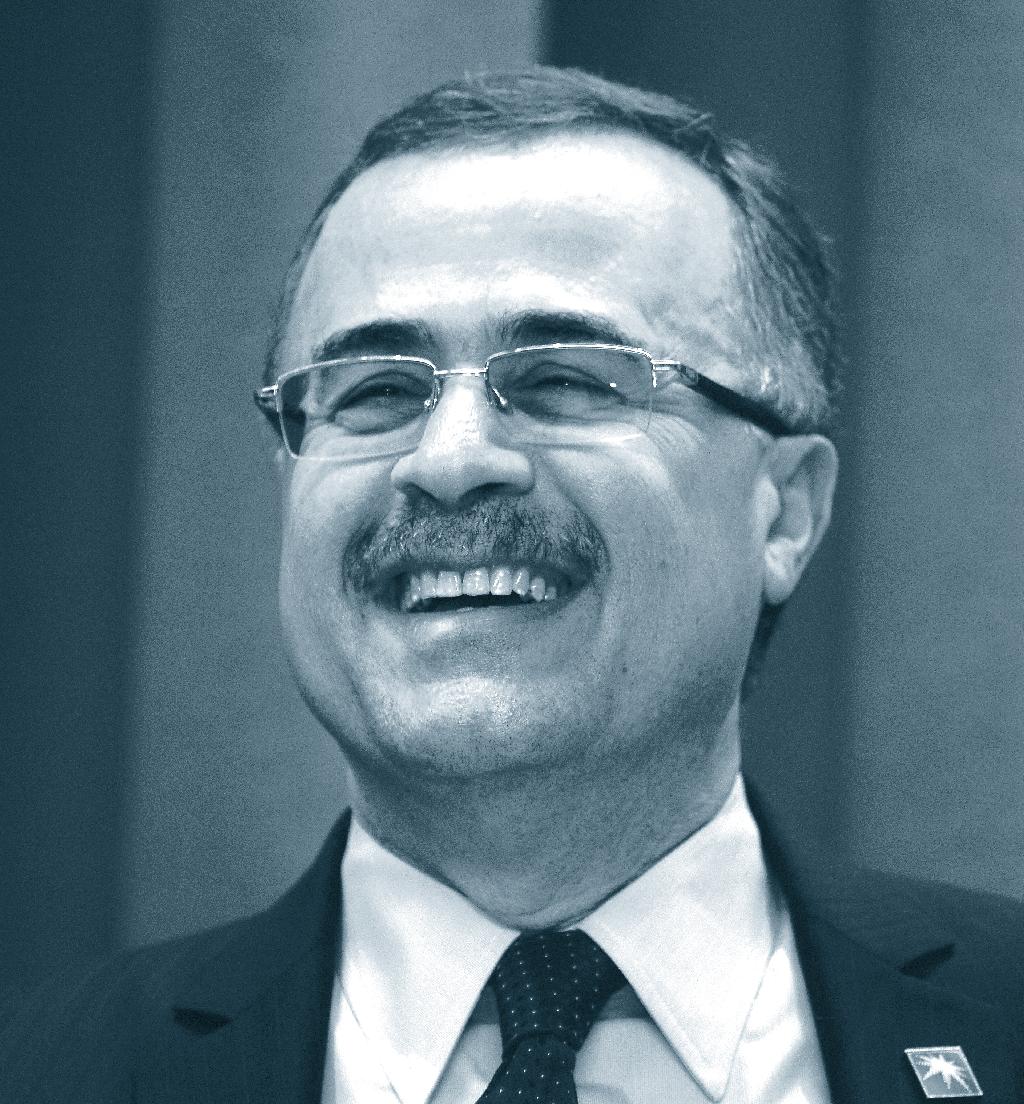
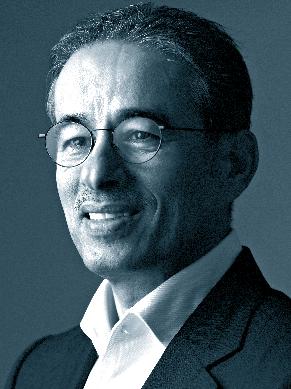
“All of us have a vested interest in climate protection. And investing in conventional sources does not mean that alternative energy sources and technologies should be ignored,” Amin Nasser, CEO of oil giant Aramco, said at the Schlumberger Digital Forum 2022. In October last year, the company announced a $1.5bn sustainability fund to invest in technology that would support an inclusive energy transition, as well as unveiled plans to establish an innovation hub in Riyadh alongside tech company IBM. Aramco also reported a 46.5 per cent rise in net profit for 2022, totalling $161bn – its highest annual profit as a listed company.
08
Origin: Lebanon/ Mexico
Residence: Mexico
Sector: Telecoms
2022 rank: 7
The son of Lebanese immigrants, Helú incorporated his first venture Inversora Bursátil, a stock brokerage, in 1965. With an estimated net worth of around $85.3bn, the octogenarian business magnate and philanthropist is the founder of Grupo Carso, which is involved in the industrial, retail, energy and construction sectors. He is also an honorary chairman of América Móvil, the Mexican telecom giant, which reported $744.8m in net profit and $11.74bn in revenue for the fourth quarter of 2022. Helú has served as the vice president of the Mexican Stock Exchange and as president of the Mexican Association of Brokerage Houses.
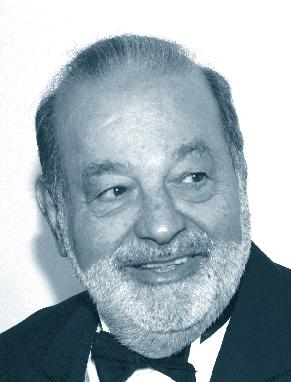
Origin: UAE
Residence: UAE
Sector: Real Estate/ Retail
2022 rank: 8
Mohamed Alabbar Founder, Emaar/noon.com
Alabbar founded Emaar in 1997 and under his direction, the company has grown tremendously. In 2022, Emaar group property sales stood at $9.5bn, while its net profit rose 80 per cent year-on-year to reach $1.9bn. Besides proving his mettle on Dubai’s real estate landscape, Alabbar’s business interests range from e-commerce platform noon.com to digital lender Zand Bank, of which Alabbar is chairman. He received as much as $900m from Americana’s IPO in December 2022 and his remaining stake is now valued at $1.98bn, based on the offer price. He also heads Alabbar Enterprises, through which he holds a stake in the Yoox Net-A-Porter Group.
Origin: Saudi Arabia
Residence: Saudi Arabia
Sector: Finance 2022 rank: 10
HRH Prince Alwaleed bin Talal bin Abdulaziz
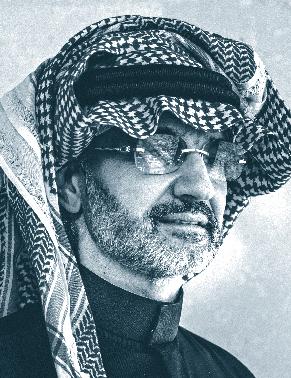
Al Saud
Chairman, Kingdom Holding Company
In 2022, Saudi Arabia’s PIF purchased a 16.87 per cent stake in Kingdom Holding Company (KHC) from billionaire businessman and chairman Prince Alwaleed for $1.51bn. Meanwhile, KHC announced an investment of £232.9m ($276m) in UK’s Phoenix Group in 2022, and led a Series C funding round for Saudi grocery delivery startup Nana earlier this year.
Alwaleed Philanthropies, the humanitarian organisation that Prince Alwaleed chairs, has spent more than $4.4bn on social welfare, and has initiated over 1,000 projects in more than 189 countries for over four decades.
32 SPECIAL REPORT
07
Carlos Slim Helú
Honorary chairman, América Móvil
09
06
Origin: UAE
Residence: UAE
Sector: Energy
2022 rank: 11
Sarah bint Yousif Al Amiri Chairwoman,
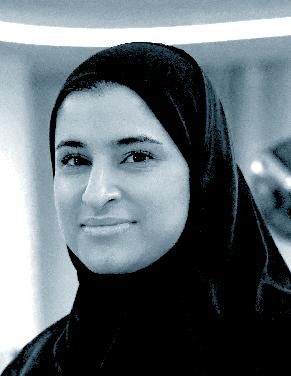
UAE Space Agency
Origin: UAE
Residence: UAE
Sector: Space
2022 rank: 9
Emirates Nuclear Energy Corporation (ENEC), headed by Al Hammadi, is not only contributing to the country’s net zero by 2050 target, but is also delivering energy security and powering sustainable growth.
In February, ENEC announced that unit 3 of the Barakah plant started commercial operations, adding 1,400MW of clean electricity to the national grid. The Barakah plant is the first peaceful nuclear energy plant to be developed in the Arab world, and when fully operational, will prevent 22.4 million tonnes of carbon emissions every year.
Origin: Qatar
Residence: Qatar
Sector: Diversified 2022 rank: 16
The UAE Space Agency aims to support and foster the country’s space capabilities and drive progress. At its helm is chairperson Al Amiri, who is steering its growth and missions. Last year, the agency signed a MoU with the Philippine Space Agency to enhance cooperation in scientific research, space exploration and knowledge exchange. It also inked an agreement with Bayanat to develop a geospatial analytics platform for the space data centre.
Al Amiri, who is the Minister of State for Public Education and Advanced Technology, will be a driving force in enhancing advanced sciences and their contribution to the national economy.
Origin: UAE
Residence: UAE
Sector: Logistics
2022 rank: 12
In November last year, Sulayem announced that DP World would invest up to $500m to cut carbon emissions from its operations over the next five years. The state-owned ports operator ranked fifth in the world in 2022 by total value of direct investments allocated to the overseas logistics services sector.
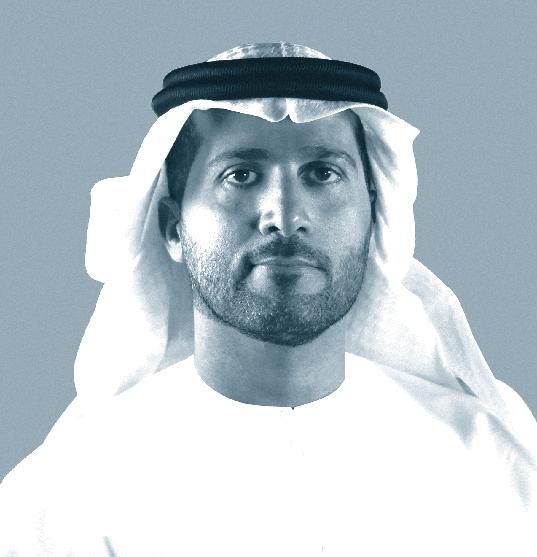
DP World has invested more than $10bn (Dhs37.3bn) in the global logistics sector since 2012, making it one of the top five overseas investors in this period.
The company also teamed up with shipping services provider Maersk to improve operational efficiencies and collaborate on decarbonising. Meanwhile, DP World was named as an official partner of McLaren Formula 1 Team in February this year. Sulayem, who is leading the company’s growth and expansion, is also the chairman of Dubai’s Ports, Customs and Free Zone Corporation.
Al-Mahmoud was appointed CEO of Qatar Investment Authority (QIA) in 2018 and has since overseen one of the world’s largest sovereign wealth funds, which currently manages $475bn in assets, according to the Sovereign Wealth Fund Institute.
QIA continues to grow its involvement overseas. In Q1 2023, QIA participated in the inaugural $1.5bn private equity fund of Ariel Alternatives, Project Black. The US-based fund will invest in consumer retail, energy and infrastructure, financial services, tech and healthcare. It also invested $150m in The North Road Company, the global, multi-genre studio based out of Los Angeles.
He has helped steer the fund’s strategy to focus more on diversification and investments with ESG goals, as well as guided the adoption of a new operating model. Prior to his appointment at QIA, Al-Mahmoud was the CEO of Qatar Museums. He is also the vice chairman of Qatar Stock Exchange and national carrier Qatar Airways. Additionally, he is a member of the supervisory board of Volkswagen as well as a board member of Qatar National Bank.
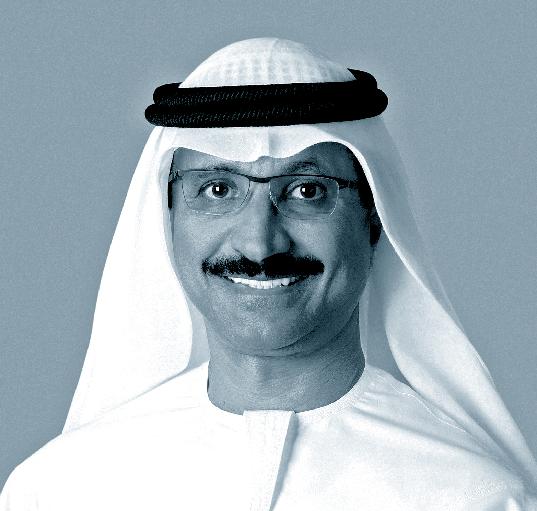
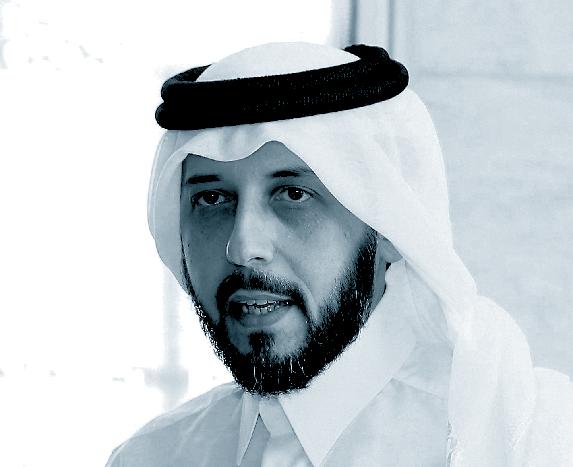
33 SPECIAL REPORT
12
10 13 11
Mohamed Al Hammadi
Managing director and CEO, Emirates Nuclear Energy Corporation
Mansoor Ebrahim Al-Mahmoud CEO, Qatar Investment Authority
Sultan Ahmed bin Sulayem Group chairman and CEO, DP World
Origin: UAE Residence: UAE
Sector: Finance
2022 rank: 17
Dubai-headquartered Mashreq, of which Al Ghurair is chairman, posted $1bn in net profit for 2022, while its operating profit at $1.19bn grew 39.2 per cent compared to the previous year. Stepping beyond the traditional realm of finance, Mashreq became the first regional bank sponsor for the Argentinean national football team in the Middle East and Egypt, by virtue of an agreement signed in December 2022.
Earlier this year, the lender announced that it had received an NOC to commence digital banking operations in Pakistan.
Outside of Mashreq, Al Ghurair is also the chairman of Dubai Chambers and Abdulla Al Ghurair Foundation for Education.
Origin: UAE
Residence: UAE
Sector: Finance
2022 rank: 19
Origin: Qatar Residence: Qatar Sector: Finance
2022 rank: 18
Abdulla Mubarak Al-Khalifa
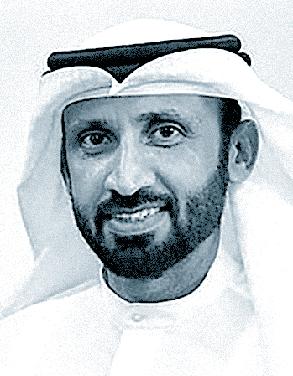
Group CEO, Qatar National Bank
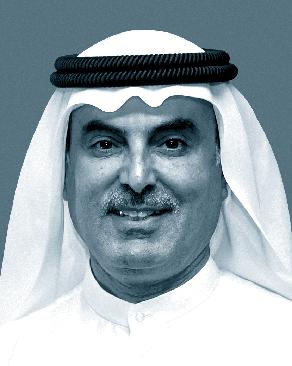
Qatar National Bank reported QAR1.189tn ($327bn) in total assets for 2022, posting a 9 per cent rise on the previous year-end figure, and staying above the trillion-riyal mark for the third consecutive year. The lender also reported a 9 per cent rise in net profit last year, totalling $3.9bn.
Helming the bank is Al-Khalifa, who has risen through the ranks to become the lender’s group CEO, and will play a key role in positioning it for future growth opportunities. Al-Khalifa also serves on the board of telecom operator Ooredoo Qatar.
First Abu Dhabi Bank posted a group net profit of $3.64bn for 2022, up 7 per cent year-on-year, with total assets topping $302bn as of December-end. Its total income, however, rose 10 per cent to reach $6.5bn. Al Rostamani, the lender’s first female and incumbent group CEO, is propelling it to future growth, with the bank’s international network spanning five continents.
Prior to being appointed to her current role, Al Rostamani served as the lender’s deputy group CEO and group head of personal banking. Al Rostamani is also a board member of UAE-based AW Rostamani Group.
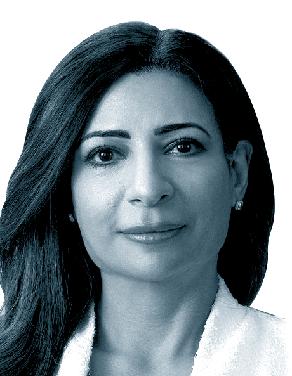
Group CEO, First Abu Dhabi Bank 17
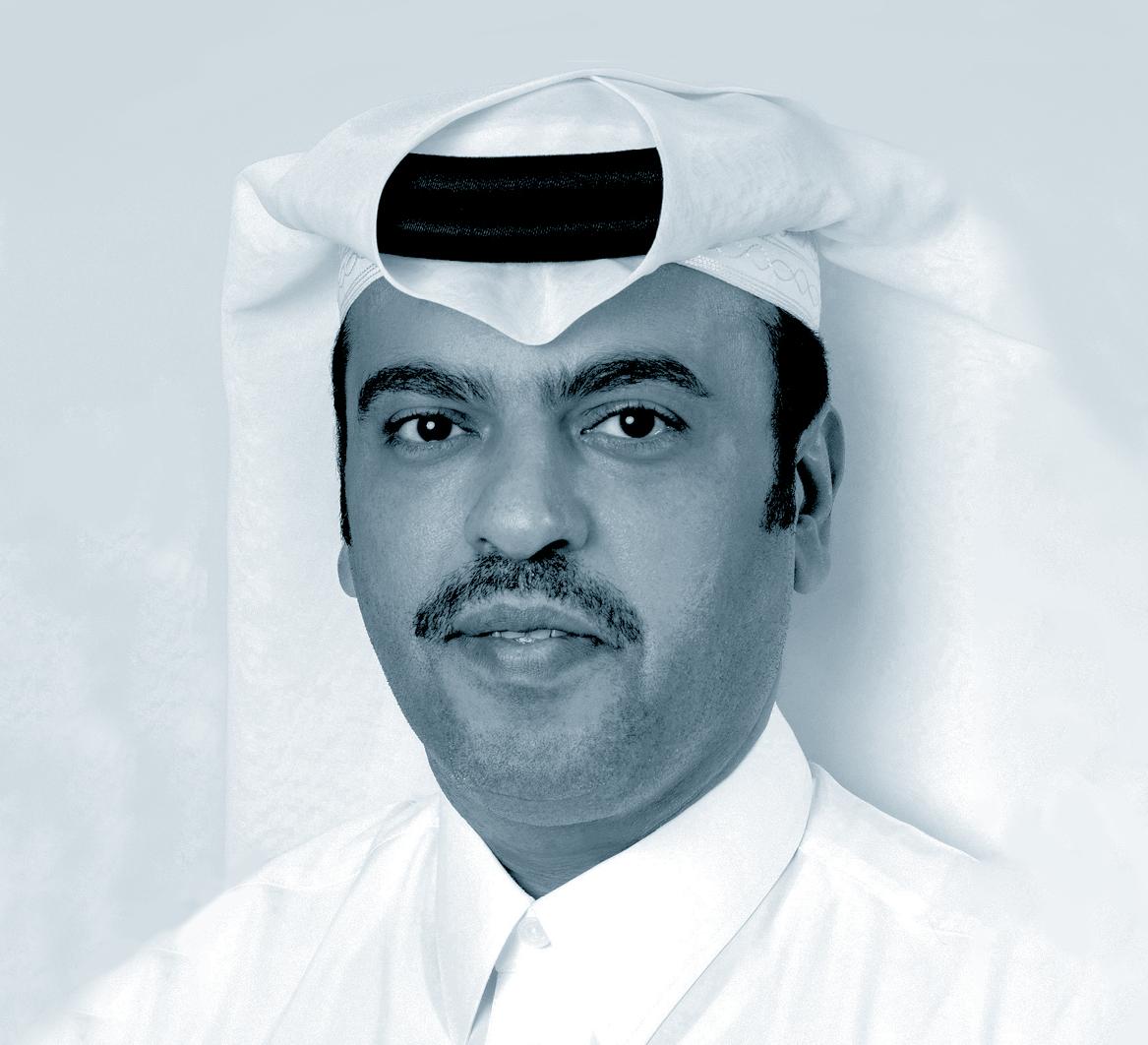
Origin: UAE
Residence: UAE
Sector: Diversified
2022 rank: 20
Managing director, Investment Corporation of Dubai
The Investment Corporation of Dubai (ICD), of which Al Shaibani is managing director, generated revenue of Dhs121.1bn ($32.9bn) for the first half of 2022, while its first-half net profits of Dhs14.8bn ($4bn) rose more than 10 times compared to the same period during the previous year. The principal investment arm of Dubai government, ICD has holdings in major entities such as Emaar, Emirates, Dubai Duty Free, Emirates NBD and Dubai World Trade Centre. Outside of ICD, Al Shaibani is also the chairman of Dubai Islamic Bank and Nakheel.
34 SPECIAL REPORT
15
Abdul Aziz Al Ghurair Chairman, Mashreq
Hana Al Rostamani
16 14
Mohammed Ibrahim Al Shaibani
Origin: UAE Residence: UAE Sector: Science and Technology 2022 rank: 31
Salem Humaid Al Marri
Director general, Mohammed Bin Rashid Space Centre
Al Marri, who was promoted to the position of director general of the Mohammed Bin Rashid Space Centre (MBRSC) in January 2022, entered the year on solid footing with the launch of Zayed Ambition 2 – the longest Arab space mission in history – with Emirati astronaut Sultan AlNeyadi in March.
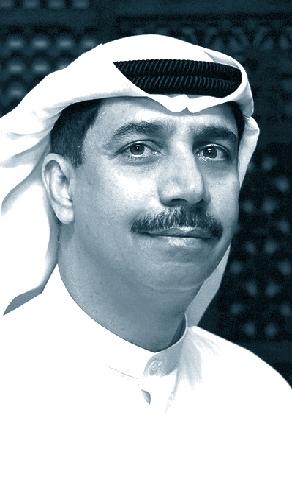
Under his stewardship, MBRSC announced in March that the HAKUTO-R lander, carrying aboard the Rashid Rover, is now in the moon’s orbit ahead of the first Emirati mission to the moon’s surface later this month.
Al Marri has overseen the expansion of MBRSC into new scientific and technical fields over the years while ensuring continuous developments in the global space sector. In addition, he is immensely contributing to the UAE National Space Programme by ensuring that the vision and mission of the nation are attained, including Mars 2117, the Emirates Mars Mission, UAE Astronaut Programme, and the UAE Satellite Programme.
Origin: Saudi Arabia
Residence: Saudi Arabia
Sector: Finance
2022 rank: 21
Chairperson,
Saudi British Bank (SABB) registered a 52 per cent rise in net profit for 2022, totalling $1.29bn, while its operating income soared 26 per cent year-on-year.
Charting the lender’s growth is Olayan, one of the region’s most distinguished businesswomen. Olayan is a formidable supporter of women empowerment, with a third of the bank’s senior management consisting of females.
In January, SABB announced it had reappointed Olayan as chairperson for a three-year term. Meanwhile, the World Economic Forum appointed Olayan to its board of trustees last year. She is also chair of the Saudi Swedish Business Council.
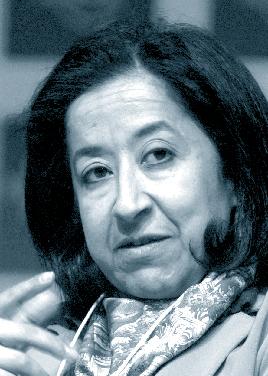
Origin: UAE Residence: UAE Sector: Finance 2022 rank: 23
Essa Kazim
Governor, DIFC
The Dubai International Financial Centre (DIFC) posted its highest ever revenue, totalling Dhs1.06bn ($288m) in 2022.
A total of 1,084 new companies registered in DIFC last year, exceeding the annual milestone of 1,000 for the first time. It also posted a 19 per cent year-on-year rise in operating profit to reach $184.8m in 2022.
With Kazim at its helm, the centre continues to contribute to Dubai’s economic growth and pursue its vision to drive the future of finance.
He is also the vice chairman of telecoms operator e& as well as a board member of Nasdaq Dubai.
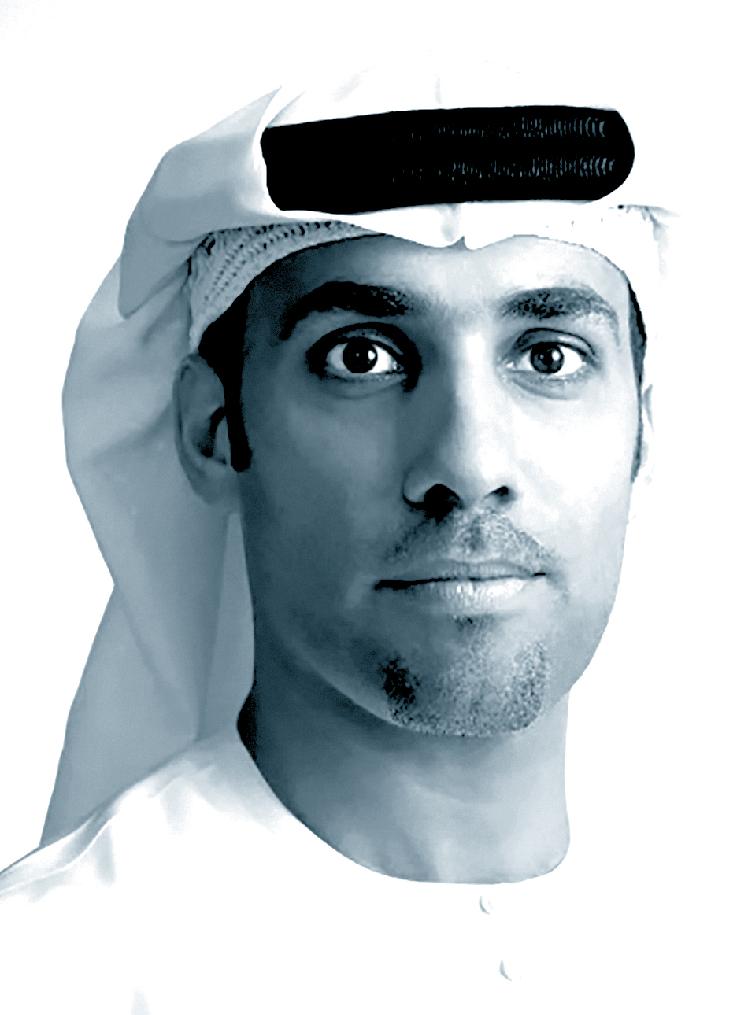
Origin: UAE
Residence: UAE
Sector: Tourism/ Real Estate
2022 rank: 24
Mohamed Khalifa
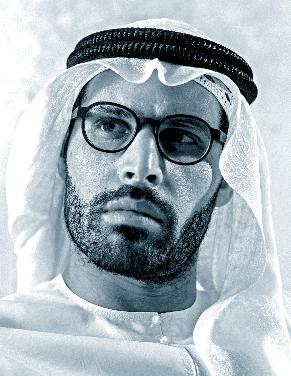
Al Mubarak
Chairman, Department of Culture and Tourism - Abu Dhabi/Aldar Properties
Overseeing some of Abu Dhabi’s key institutions across the culture, real estate, and tourism sectors, Al Mubarak is playing a significant role in advancing the emirate’s economic growth. Al Mubarak is the chairman of the Department of Culture and Tourism – Abu Dhabi, which aims to propel the emirate’s status as a cultural and tourist destination. He chairs Abu Dhabi-based Miral as well.
Al Mubarak is also the chairman of Aldar Properties, which recorded $840m in net profit for 2022, up 35 per cent year-on-year, as well as marked its debut in Dubai’s real estate market via a strategic partnership with Dubai Holding earlier this year.
35 SPECIAL REPORT
19
21
18
Lubna Suliman Olayan
Saudi British Bank
20
Origin: Saudi Arabia
Residence: Saudi Arabia
Sector: Tourism 2022 rank: 25
Fahd Hamidaddin
CEO, Saudi Tourism Authority
As CEO of Saudi Tourism Authority, Fahd Hamidaddin has been entrusted with delivering the mandate to build the kingdom’s domestic and inbound visitation. In January, Saudi Arabia launched a new stopover visa, allowing visitors to stopover in the country for up to 96 hours. The new freeof-charge visa aims to contribute to the kingdom’s vision of becoming a global tourist destination.
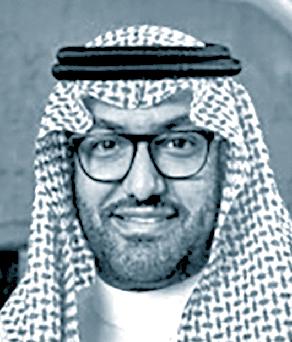
Prior to becoming the authority’s CEO, Hamidaddin served as chief of investment, strategy and tourism marketing for Saudi’s Ministry of Tourism. Previously, he also served as the chief commercial officer at King Abdullah Economic City.
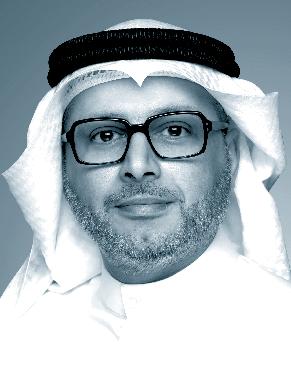
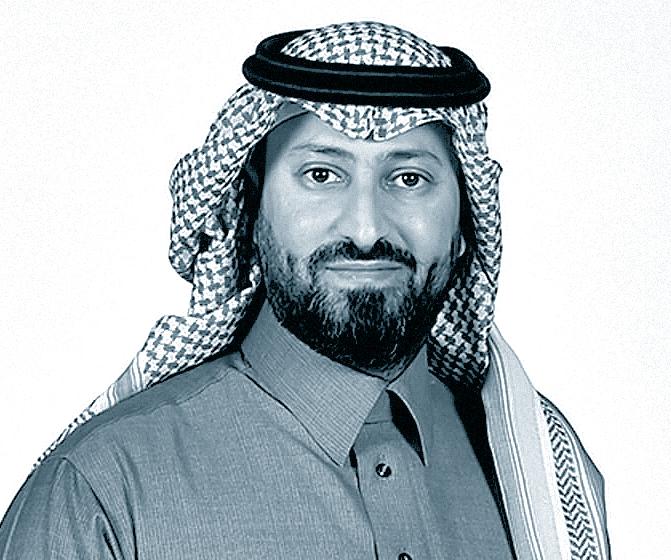
Origin: Saudi Arabia
Residence: Saudi Arabia
Sector: Finance
2022 rank: 22
Sarah Al Suhaimi
Chairperson, Saudi Tadawul Group
Sarah Al Suhaimi is an influential business figure in Saudi Arabia and as the chairperson of Saudi Tadawul Group, she is leading efforts to integrate the kingdom’s capital market with global systems. In 2022, the group inked a MoU with Boursa Kuwait to exchange information and increase diversity and inclusion in both GCC markets. Last year, Al Suhaimi was appointed chair of Lazard’s financial advisory business in the Middle East and North Africa. She is also a board member of telecom operator stc.
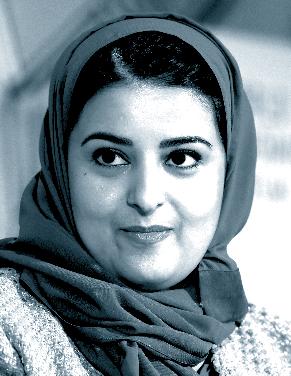
Origin: Kuwait
Residence: Kuwait
Sector: Finance
2022 rank: 27
Mohammad Saud
Al-Osaimi
CEO, Boursa Kuwait
Origin: Saudi Arabia Residence:Saudi Arabia
Sector: FMCG 2022 rank: 26
HH Prince Naif bin Sultan bin
Mohammed bin Saud Al Kabeer
Chairman, Almarai
Prince Naif bin Sultan led Saudi dairy company Almarai to post SAR1.759bn ($468m) in consolidated profit attributable to shareholders for the year 2022, rising 12.6 per cent from SAR1.563bn ($416.3m) recorded during 2021. In November last year, the company also announced an investment of SAR4.5bn ($1.19bn) to expand poultry production across the country. Prince Naif, who has played a prominent role in enhancing food security across the kingdom, was reappointed as chairman of Almarai’s board for a three-year term last August. He also chairs telecom provider Zain KSA.
Al-Osaimi, who joined Boursa Kuwait in 2015, has played a prominent role in its growth, and will be navigating the exchange to further its contribution to the overall national economy. The bourse continues to pursue its strategy to create a thriving capital market. In 2022, it reported a net profit of $58.6m, up 13.3 per cent year-on-year, with total market capitalisation increasing 12.9 per cent to reach $152.2bn. The bourse attracted substantial institutional international investors as well, with total foreign turnover activity soaring 29 per cent last year. It also signed a MoU with Saudi Tadawul Group in 2022 to bolster the growth of capital markets in Kuwait and Saudi Arabia.
36 SPECIAL REPORT
23
22 25
24
Origin: Saudi Arabia
Residence: Saudi Arabia
Sector: Finance
2022 rank: 28
Saudi National Bank – which was created after the merger of National Commercial Bank and Samba Financial Group – reported a net income after Zakat and income tax of $4.94bn for 2022, up 46.67 per cent compared to the previous year.
Driving the lender forward is Al Ghamdi, a banking and finance veteran, who was appointed to the role in 2021. He has previously served as an advisor to the governor of Saudi Central Bank, and is also the chairman of Saudi-based developer Jabal Omar Development Company.
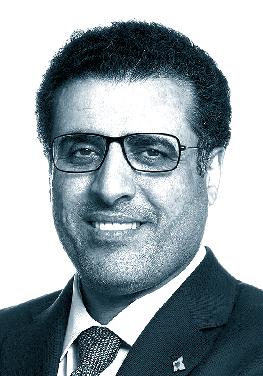
Origin: UAE
Residence: UAE
Sector: Diversified 2022 rank: 15
Reem Al Hashimy CEO, Expo City Dubai Authority
Expo City Dubai Authority, of which Al Hashimy is CEO, kicked off the sale for two residential communities in March with the completion of the projects scheduled for January 2026.
Building on the legacy of Expo 2020 Dubai, Al Hashimy was appointed CEO in June 2022. In her capacity as head of Expo City, she is overseeing the transformation of the technologically advanced and people-centric city ahead of the UN Climate Change Conference (COP 28) in November 2023.

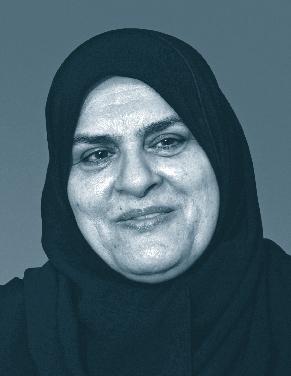
Under Al Hashimy’s guidance, the city’s objectives are aligned with Dubai’s vision to attract foreign investments, businesses and institutions into the local market.
As one of the young leaders from the UAE, Al Hashimy gained prominence following the speech she delivered at the 77th session of the United Nations General Assembly. She is also the UAE Minister of State for International Cooperation and chairs the UAE’s National Committee on Sustainable Development Goals and Dubai Cares.
Origin: UAE
Residence: UAE
Sector: Diversified 2022 rank: 29
Dr Al Gurg succeeded her late father last year to become the chairperson of one of UAE’s most eminent family businesses: Easa Saleh Al Gurg Group. With 27 companies in its portfolio, the group has interests in retail, building and construction, and real estate. Meanwhile, National Bank of Fujairah, of which Dr Al Gurg is deputy chairperson, recorded a 195.3 per cent rise in net profit for 2022. She is the founder of Dubai Business Women Council, and a board member of Dubai Chamber of Commerce and Industry and Dubai Academic Health Corporation. She was named pro-chancellor of Heriot-Watt University Dubai last year.
Origin: Egypt Residence: UK Sector: Sports 2022 rank: 30
Mohamed Salah, nicknamed the ‘Egyptian King’, scored two goals for Liverpool FC against Manchester United last month, propelling him to become the club’s top scoring Premier League player. With 129 goals, the Egyptian forward moved past Robbie Fowler as the club’s leading scorer in the history of the league. Salah joined Liverpool in the summer of 2017 and became the club’s first player ever to pick up the FIFA Puskas Award in 2018. He inked a new contract last July, committing his future to Liverpool until 2025.
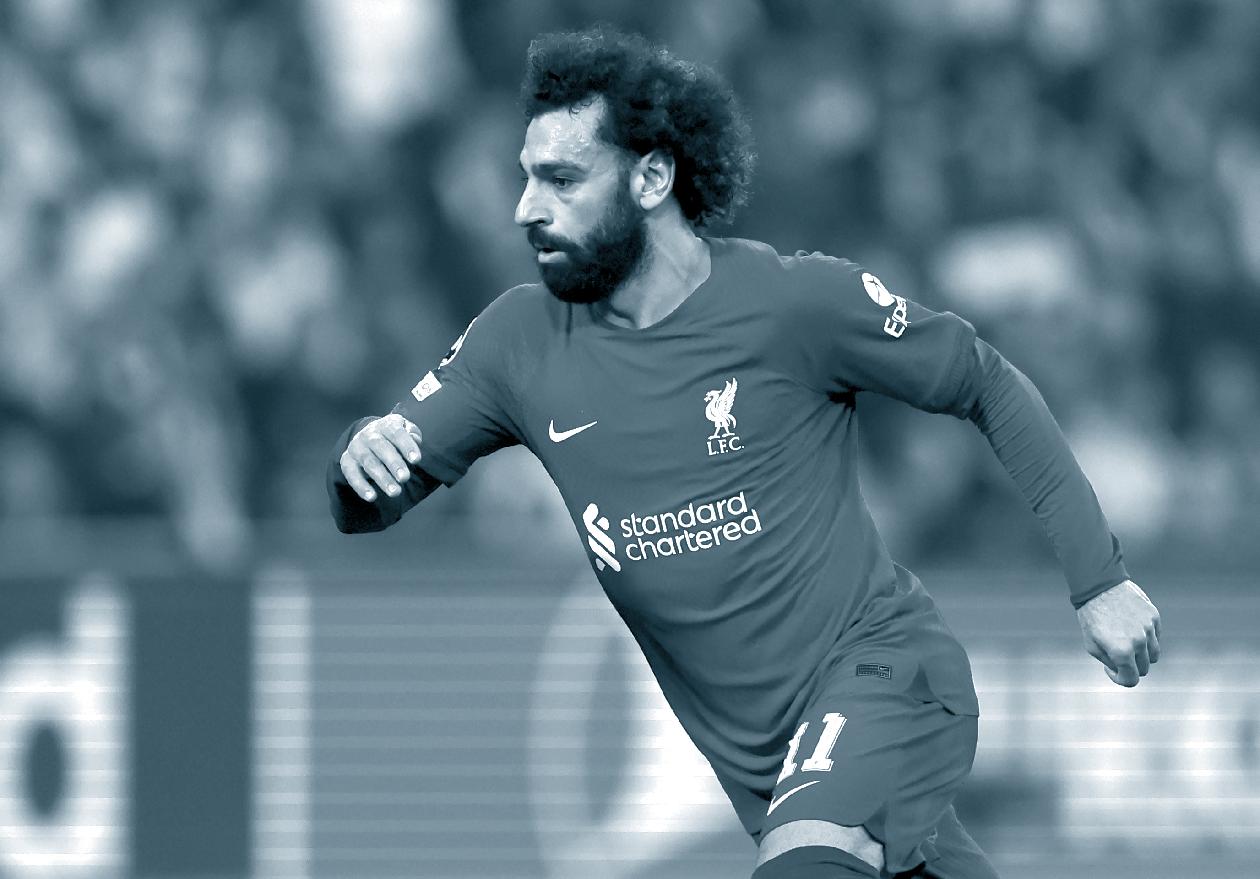
37 SPECIAL REPORT
27 29 28 26
Saeed Mohammed
Al Ghamdi
Chairman, Saudi National Bank
Dr Raja Easa Al Gurg Chairperson and managing director, Easa Saleh Al Gurg Group
Mohamed Salah Footballer, Liverpool FC
Origin: Saudi Arabia
Residence: Saudi Arabia
Sector: Industry
Al-Fageeh was appointed as the new CEO of the petrochemicals major in March, having served in an acting capacity since September 2022. Al-Fageeh’s mandate is to take SABIC, one of the world’s biggest petrochemical companies, forward.
SABIC’s revenues jumped by 13 per cent to SAR198.5bn and declared an annual dividend of $3.4bn, up 6.25 per cent. Under Al-Fageeh’s stewardship, the company signed an agreement with Aramco and China’s Sinopec in December 2022 to build a refinery and a petrochemical plant in China.
He is also the chairman of SABIC Agri-Nutrients Company and the Nusaned Investment Company.
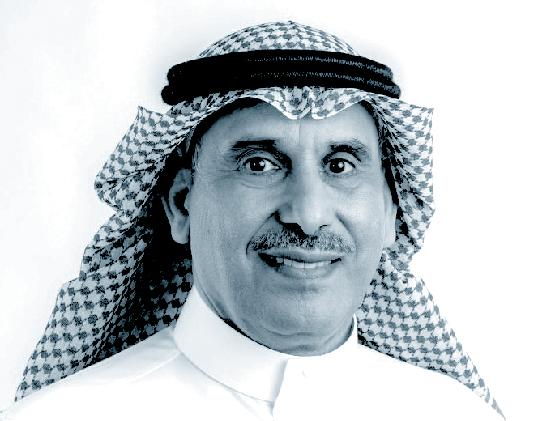
Al-Fageeh sits on the boards of the Royal Commission for Jubail and Yanbu and the Saudi General Authority of Foreign Trade.
Origin: UAE
Residence: UAE
Sector: Tourism/ Diversified 2022 rank: 35
Under Al Marri’s stewardship, the Department of Economy and Tourism said Dubai welcomed 14.36 million international visitors in 2022, a 97 per cent increase from 7.28 million a year earlier. He also oversaw the opening of new attractions and initiatives to spur tourism, including the Museum of the Future and Atlantis The Royal, a mega-resort located on Palm Jumeirah.
Al Marri is spearheading the implementation of new initiatives in Dubai that aligns well with the UAE 2031 Tourism Strategy, which seeks to attract 40 million visitors by 2031 and increase the sector’s contribution to the emirate’s GDP to Dhs450bn. The Dubai Department of Economy and Tourism contributes to Dubai’s D33 strategy by attracting foreign investment, raising exports, nurturing SMEs and formulating plans for the emirate’s economic sectors.
Al-Marri is a member of the Executive Council of Dubai, he chairs the Dubai Financial Market and sits on the boards of Emaar Properties, Taaleem and the Dubai Chamber of Commerce and Industry. Al-Marri also serves as director general of the Dubai World Trade Centre Authority.
Sheikha Al Mayassa bint
Hamad bin Khalifa Al Thani Chairperson, Qatar Museums
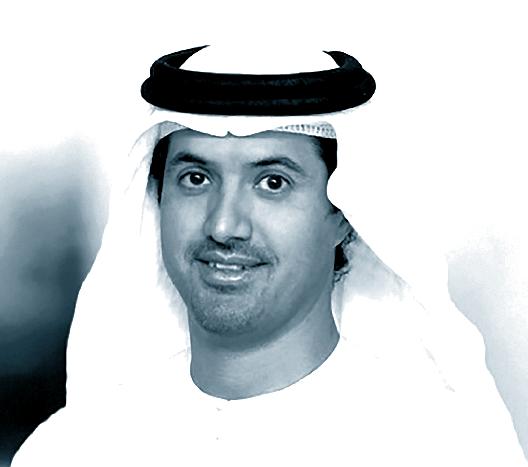
Origin: UAE Residence: UAE Sector: Space
Sultan AlNeyadi
Astronaut
In March, Sultan AlNeyadi arrived at the International Space Station, marking the beginning of his six-month mission. Al Neyadi, who was part of the first batch of the UAE Astronaut Programme, became the second Emirati astronaut to travel to space, following Hazza Al Mansoori’s voyage in 2019.
AlNeyadi, part of NASA’s SpaceX Crew-6, will collaborate with multiple space agencies on the mission to conduct scientific studies across a range of topics. Additionally, the mission includes educational outreach efforts to inspire the next generation of scientists.
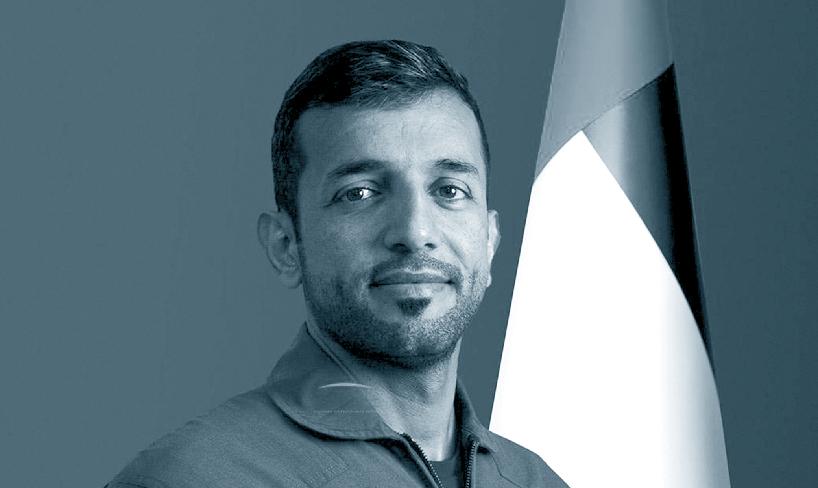
Origin: Qatar
Residence: Qatar Sector: Culture and Society 2022 rank: 33
Sheikha Al Mayassa bint Hamad bin
Khalifa Al Thani is the sister of the Emir of Qatar and one of Qatar’s leading voices in art and culture. In March 2022, she unveiled the country’s plans to expand its cultural offerings over the next seven years, including three additional art institutions – Lusail Museum, the Art Mill Museum and the Qatar Auto Museum.
Under Sheikha Al Mayassa’s leadership, Qatar’s architecturally striking museums, including the Museum of Islamic Art and the National Museum of Qatar, have cemented the country’s position as a vibrant centre for arts and culture in the Middle East and beyond. She also chairs the Doha Film Institute, Reach Out to Asia and Qatar Leadership Centre.
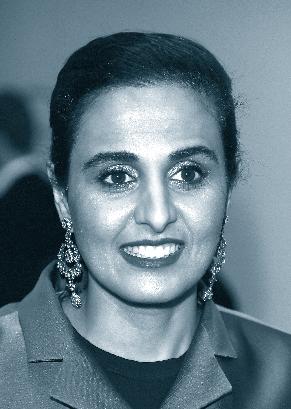
38 SPECIAL REPORT
33
30
32
Abdulrahman Saleh Al-Fageeh
CEO, SABIC
Helal Al Marri
31
Director general, Dubai’s Department of Economy and Tourism
NEW NEW
Origin: Saudi Arabia
Residence: Saudi Arabia
Sector: Finance
Ayman Mohammed Alsayari
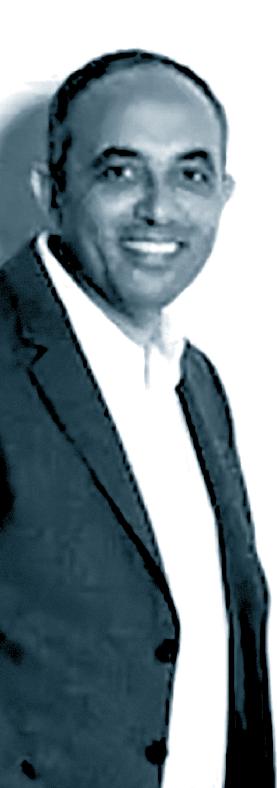

Governor, Saudi Central Bank (SAMA)
Alsayari, who took over from Fahad al-Mubarak, was appointed central bank governor in February, having served in a deputy capacity since 2019. Under his guidance, SAMA’s mandate includes supporting economic growth and the kingdom’s finance sector under Vision 2030. His mandate includes the digitalisation of the financial services sector following the launch of the kingdom’s ‘Open Banking Lab’ in January.
Alsayari has played an instrumental role in formulating Saudi Arabia’s sovereign debt strategy. He joined SAMA in 1999 and sits on the boards of Saudi Fund for Development, the Public Pension Agency and the Saudi Federation for Cybersecurity, Programming and Drones.
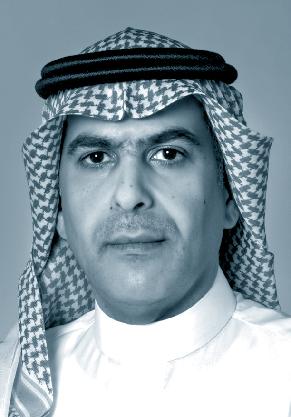
Origin: Lebanese Residence: UAE
Sector: Culture and Society 2022 rank: 32
Elie Habib and Eddy Maroun
Co-founders, Anghami
From humble beginnings in Lebanon, Anghami has grown into a thriving business with 1.52 million paying subscribers in 2022 and $48.1m in unaudited revenues, up 35.6 per cent compared to 2021.
Anghami partnered with Mashreq Bank in October 2022 to give the bank’s clients in the UAE free access to Anghami Plus for up to 12 months. The partnership will also deliver exclusive regional content through podcasts and bespoke music creation. The streaming platform has 47 telco partnerships to facilitate acquisition and subscription payments. Its catalogue has more than 75 million Arabic and international songs and around 100,000 podcasts.
Anghami has grown its verticals since its listing on Nasdaq to include Anghami Studios, Vibe Music Arabia, Spotlight Live and Anghami Lab. In addition, its streaming service recently expanded into the US, Canada and Europe, adding to the 16 countries it already serves in the MENA.
Origin: Saudi Arabia
Residence: Saudi Arabia
Sector: Diversified 2022 rank: 36
Mohammed Abdul Latif Jameel
Chairman and CEO, Abdul Latif Jameel
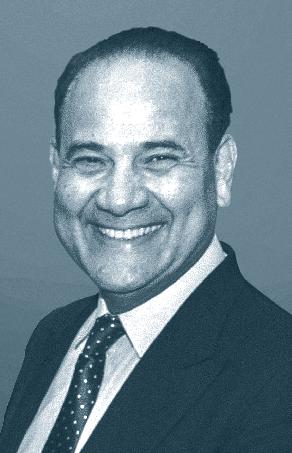
Abdul Latif Jameel has grown into a multinational company with interests in real estate, energy, media, health and financial services. Jameel is leading the business’ global expansion. He is spearheading the expansion of Fotowatio Renewable Ventures’ global portfolio with the commissioning of a solar farm in Spain in March and the acquisition of the company’s tenth solar farm in Australia in December 2022. The company advanced its sustainability credentials through a partnership with Voluntary Carbon Market in November 2022 and is expanding its clean energy business in the UK and Germany. It is electric truck maker Rivian’s third-largest shareholder via its subsidiary Global Oryx Group Holding, which owns 113.9 million shares valued at $3.64bn as of November 2022.
Origin: UAE
Residence: UAE
Sector: Diversified 2022 rank: 37
Habtoor Group
Al Habtoor unveiled his conglomerate’s three new mega residential projects in Al Habtoor City, the Habtoor Grand Resort in JBR and Habtoor Tower in November 2022. The projects are being built at a total cost of Dhs9.5bn. AHG partnered with solar energy solutions provider SirajPower in March to deliver large-scale solar installations, with a combined capacity of 5.7MWp, across the group’s eight projects. As a result, under Al Habtoor’s astute entrepreneurial leadership, the group’s revenues surged by 19 per cent in H1 2022 from a year earlier, while its EBITDA jumped by 36 per cent.
Al Habtoor is the chairman of the Dubai National Insurance and Reinsurance Company. He runs a conglomerate with businesses spanning the hotel, automotive, real estate and education sectors.
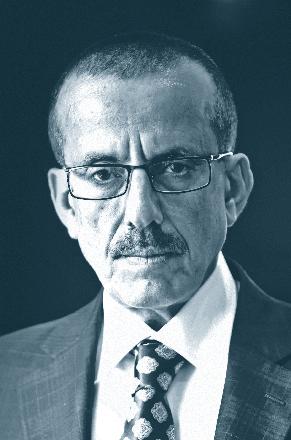
39 SPECIAL REPORT
36
37
Khalaf Al Habtoor
Founding chairman, Al
35
NEW 34
Origin: Swiss
Residence: Switzerland
Sector: Retail
2022 rank: 39
Mohamed Ali Al Shorafa
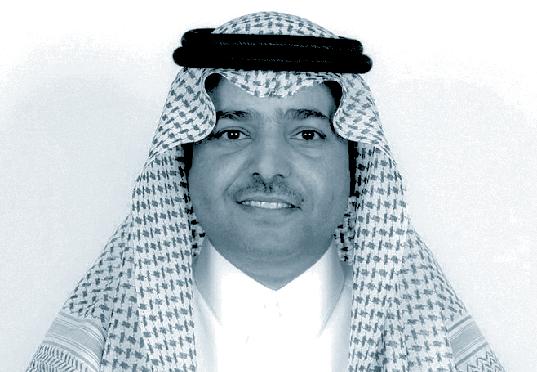
Al Hammadi
Origin: UAE
Residence: UAE
Hayek heads one of the world’s biggest luxury goods makers, which had CHF10.4bn in assets at the end of 2022, a 75 per cent year-on-year increase from CHF10.1bn a year earlier.
Swatch Group has 17 brands in its portfolio, including Omega, Breguet and Harry Winston and has a global workforce of 32,000 employees in over 50 countries. The group is central to the functioning of the Swiss watch industry, as it supplies key components to several external brands as well.
Hayek, who doubles as the president and CEO of Harry Winston, heads Dubai-based Swatch Group Middle East, chairs the board of the Rivoli Group and is a member of the World Arabian Horse Organisation. She also sits on the boards of Belenos Clean Power Holding and Hayek Holding.
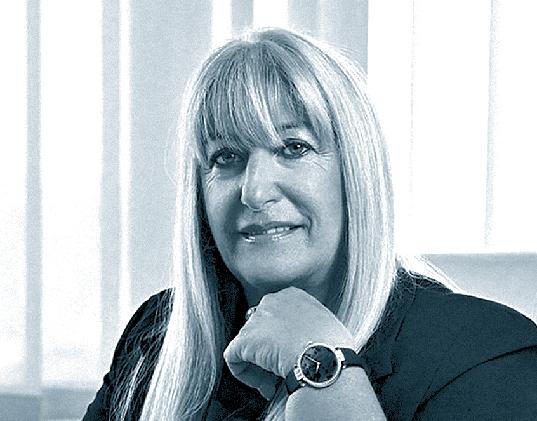
Origin:Saudi Arabia
Residence: Saudi Arabia
Sector: Finance 2022 rank: 40
AlRajhi Bank, the financial institution that was co-founded by Sheikh Sulaiman in 1957, raised more than SAR5bn from the sale of some of its real estate loans to the Saudi Real Estate Refinance Company (SRC) in March. The SRC said the deal is the largest of its kind in Saudi Arabia. The bank’s fullyear net profit surged by 16 per cent to SAR17.15bn in 2022 from SAR14.75bn the previous year. With SAR762.4bn in assets and a paid-up capital of SAR40bn, AlRajhi Bank is the world’s largest shariah-compliant bank with a distribution network of 514 branches in Saudi Arabia, 16 branches in Malaysia, 10 in Jordan and two in Kuwait.
Sheikh Sulaiman announced in 2011 that he would donate the bulk of his fortune to charity, funding anti-hunger efforts and education in Saudi Arabia and transferred his nearly 20 per cent stake in the AlRajhi Bank to a charitable endowment that bears his name. Earlier in his life, he worked several odd jobs to make ends meet, including being a porter, collecting palm dates and being a wholesale seller of imported kerosene.
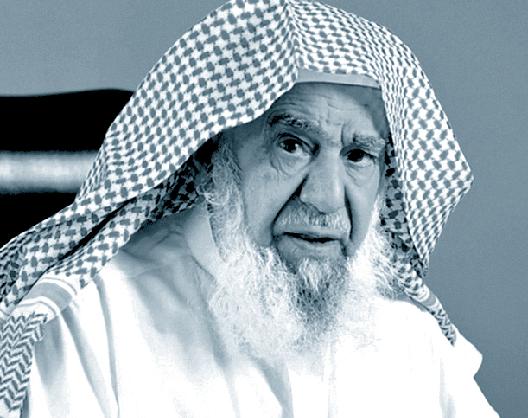
Chairman, Abu Dhabi Department of Economic Development (ADDED)
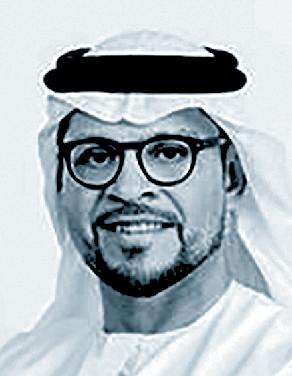
Sector: Diversified 2022 rank: 41 Al Hammadi’s distinguished and dynamic leadership has placed him in a unique position to contribute actively to Abu Dhabi’s economic success. Under his stewardship, ADDED launched Abu Dhabi SME Champion in February, a programme that is being backed by four state-owned firms with procurement opportunities worth Dhs30m. In November 2022, ADDED-backed ‘Abu Dhabi SME Hub’ expanded its offering, which saw the platform’s user base soaring by more than 17,000. Al Hammadi heads the Abu Dhabi Investment Office and is a member of the Abu Dhabi Executive Council. He is also the chairman of the boards of the Khalifa Fund, Hub71 as well as the Securities & Commodities Authority, Free Zones Council – Abu Dhabi, the Etihad Aviation Group and vice-chair of the Abu Dhabi Global Market.
Origin: Saudi Arabia
Residence: Saudi Arabia
Sector: Telecoms 2022 rank: 42
Alwetaid leads one of the largest telecom companies in the Arab world, whose brand value has increased by almost twofold to $12.3bn in 2022 from $6.2bn in 2017. With his astute guidance, stc Group’s total revenue exceeded SAR67.4bn for the first time in 2022 while its operating profit surged by 15 per cent to SAR15.1bn.
In addition to the $500m stc Group allotted to the digital transformation in the kingdom, the company invested $300m in venture capital firm, STV, in October 2022. The telecom giant has more than 47.16 million mobile telecom subscriptions across four countries in the Middle East and Southeast Asia. Alwetaid headed stc Bahrain before he was appointed group CEO in 2021 and under his leadership, the company unveiled plans to invest $1bn in data centres in October 2022. The Public Investment Fund made a non-binding offer to acquire 51 per cent of Telecom Towers Company (TAWAL) from stc Group, a deal that is valued at SAR21.9bn.
40 SPECIAL REPORT
40 38
41 39
Nayla Hayek
Chairperson Swatch Group/ president and CEO of Harry Winston
Olayan Mohammed Alwetaid Group CEO, stc Group
Sheikh Sulaiman bin Abdulaziz AlRajhi
Co-founder AlRajhi Bank
Origin: Kuwait
Residence: Kuwait
Sector: Retail 2022 rank: 38
Mohammed Alshaya
Executive chairman, Alshaya Group
Alshaya oversaw the family-owned business’ successful launch of Alo in Kuwait last November ahead of the opening of the global premium lifestyle brand’s first-ever retail store in the MENA region.
The group officially opened doors to the region’s first-ever standalone Disney Store in November 2022 in partnership with the Walt Disney Company Middle East. Alshaya has been instrumental in the development of the Kuwait-based conglomerate, driving its rapid growth and expansion across MENA and Europe.
Today, the group, which goes as far back as 1890, operates over 70 brands, including Mothercare, Starbucks, Cheesecake Factory and Victoria’s Secret that are spread across the MENA region and Europe. The company joined hands with the Starbucks Foundation and Starbucks Corporation to donate $1m to help victims of the earthquake in Türkiye.
Apart from his role at the Alshaya Group, Mohammed chairs the board of Mabanee, one of Kuwait’s largest real estate developers, he is a member of the board of trustees at the Arab Thought Foundation and the leadership council at Harvard Kennedy School.
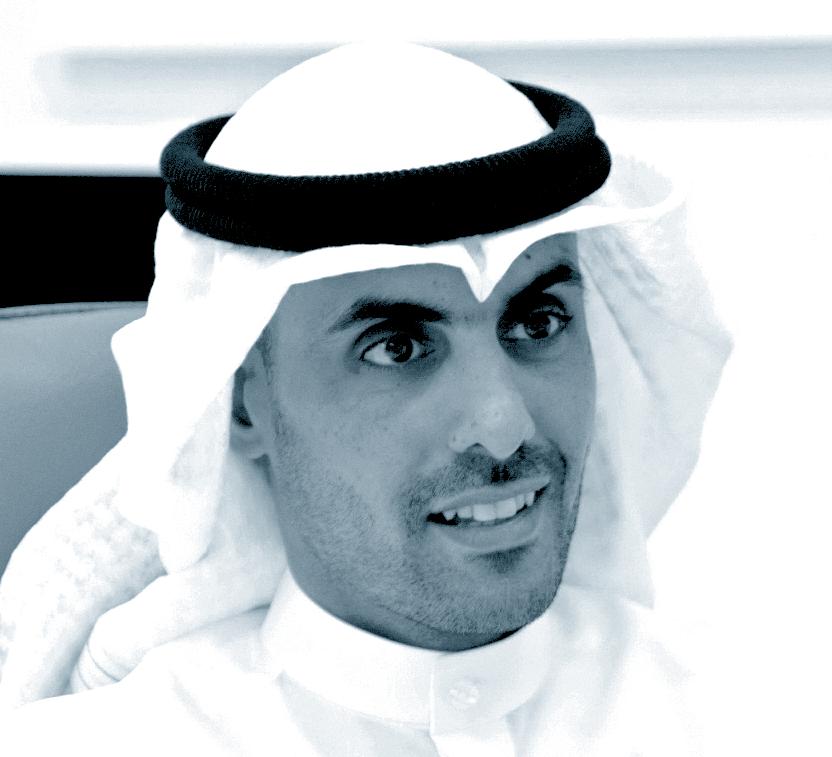
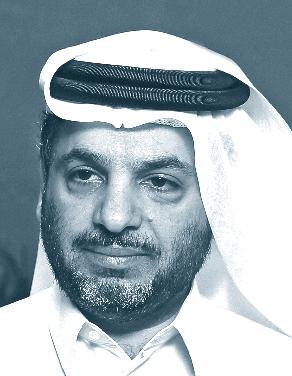
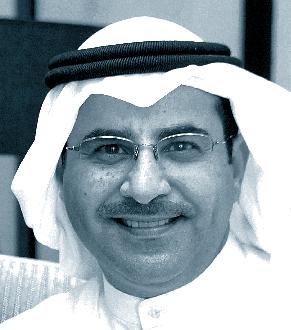
Origin: Egypt
Residence: Egypt
Sector: Diversified 2022 rank: 43
The Egyptian conglomerate, which was founded by Mansour’s father in 1952, has exclusive distribution rights for Caterpillar and General Motors (GM) in Egypt and seven other African countries. In December 2022, Mansour said his group was in talks with Peugeot, GM and MG about manufacturing in Egypt. Mansour wants the group to be at the forefront of electrical vehicle investments in Egypt and plans to announce a potential deal in 2023. In December, the tycoon said he was considering investing in the English league to build on his majority stake in the Danish side FC Nordsjaelland.
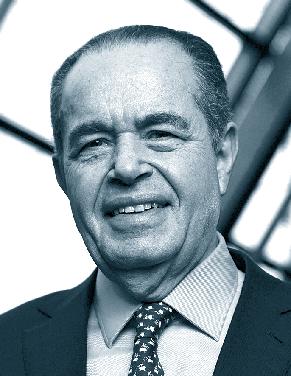
Origin: Kuwait
Residence: Kuwait
Sector: Telecoms
2022 rank: 44
Bader Nasser
Al-Kharafi
Vice chairman and CEO, Zain Group
Al-Kharafi oversees Zain Group’s operations in seven Middle East and African countries. The company registered a 6 per cent increase in net profit to $640m in 2022 while revenues soared 14 per cent to $5.6bn. He also managed the completion of Zain Saudi Arabia’s SAR3.02bn tower assets deal with Golden Lattice Investment in January. Al-Kharafi is championing the digital transformation of enterprises and government entities in the Middle East. Zain’s ICT solutions provider, ZainTech, partnered with global cloud service providers in 2022, including Amazon Web Services and Oracle, to accelerate cloud adoption.
With more than 20 years of industrial experience across the financial, banking, industrial and telecoms sectors, he manages Zain Group’s global workforce of more than 7,100 employees that caters to the company’s 52 million active individual and business customers. He sits on the boards of Gulf Bank Kuwait, Coca-Cola (Kuwait), United Stainless Steel Company (Bahrain), Foulath Holding (Bahrain) and UNHCR’s sustainability board.
Origin: UAE
Residence: UAE
Sector: Science and technology
2022 rank: 46
Under Al Bannai’s astute vision, EDGE unveiled 14 new products at IDEX 2023 and signed new contracts and deals worth Dhs18.6bn, including a landmark EUR1bn export deal with the Angolan Navy. The group marked its third anniversary in November 2022 with over 20 major export deals, 60 strategic partnerships signed and over $5bn in orders for 2022.
Al Bannai is spearheading the modernisation of the global defence industry through the use of advanced technology following the consolidation of more than 25 UAE entities under one brand.
41 SPECIAL REPORT
44 42 43
Mohamed Mansour Founder and board member, Mansour Group
45
Faisal Al Bannai Chairman, EDGE Group
Origin: Egypt
Residence: UAE
Sector: Telecoms
2022 rank: 47
Dowidar leads e& Group, a company with a brand portfolio that exceeds $14bn and a global workforce of more than 46,000 people. The company’s full-year net profit surged by 7.4 per cent to Dhs10bn in 2022 while its revenues dropped by 1.7 per cent to Dhs52.4bn.
Under his stewardship, e& is the largest shareholder in the UK’s Vodafone Group, with a 14 per cent stake as of March 2023. Today, the group is one of the world’s largest telecom operators, with five brands under its name and a presence in 16 countries across the Middle East, Asia and Africa.
Origin: Egypt Residence: Egypt Sector: Finance 2022 rank: 49
Group CEO and chairman of the Executive Committee, EFG Hermes Holding
Under Awad’s leadership, EFG Hermes has advised on two IPOs since the beginning of 2023, adding to a growing list of landmark transactions that the investment bank closed in 2022, which are valued at $12.8bn.
The banking group’s Q3 2022 net profit soared by 70 per cent y-o-y to $23.2m (EGP716m), revenues almost doubled to EGP2.3bn while assets stood at EGP97bn.
EFG Hermes’ success under Awad has made the bank a target for several takeover bids over the past decade, including from Qatar-based Q Invest in 2013, billionaire Naguib Sawiris in 2014 and First Abu Dhabi Bank in 2022.
Since he was appointed as group CEO in 2013, EFG Hermes’ frontier and emerging markets footprint has expanded across four continents to 14 countries.
Origin: UAE
Residence: UAE
Sector: Logistics 2022 rank: 54
AD Ports Group debuted on the Abu Dhabi bourse last year, and its fullyear revenues rose by 41 per cent to $1.5bn in 2022. The ports operator also signed a 30-year concession deal worth $200m to develop and operate Egypt’s Port Safaga in March.
Under Al Shamisi’s leadership, AD Ports is expanding its trade corridors connecting the UAE with the Middle East, the subcontinent, Africa and other international markets. Major acquisitions, including a 70 per cent stake in International Associated Cargo Carrier, Spanish logistics firm Noatum’s $680m deal and the 80 per cent stake in Global Feeder Shipping, played a vital role in the company’s 2022 growth story.
Origin: Oman Residence: Oman Sector: Finance 2022 rank: 50
Investcorp has grown its global presence extensively to 14 offices – across the US, Europe, GCC and Asia – as of February 2023. With Alardhi at the helm, the company opened 2023 by announcing plans to invest $1bn in the GCC real estate market over the next five years.
The investment management firm disbursed $1.2bn to GCC investors in 2022, and under Alardhi’s leadership, it has grown its assets under management (AUM) to $50bn. Investcorp became the first asset manager to launch an institutional blockchain-focused fund in the GCC region in April 2022.
The Bahrain-based asset manager is one of the Gulf region’s largest private investors in North America, and investments in the region comprise $21bn of its overall AUM. Alardhi, a former chief of the Oman Air Force, is the author of three books and chairs the boards of Sohar International Bank and Muscat Stock Exchange.
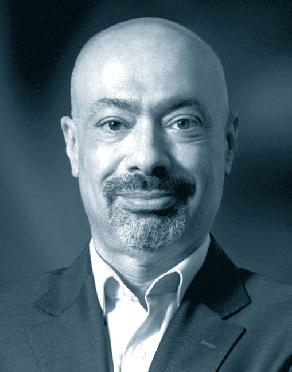
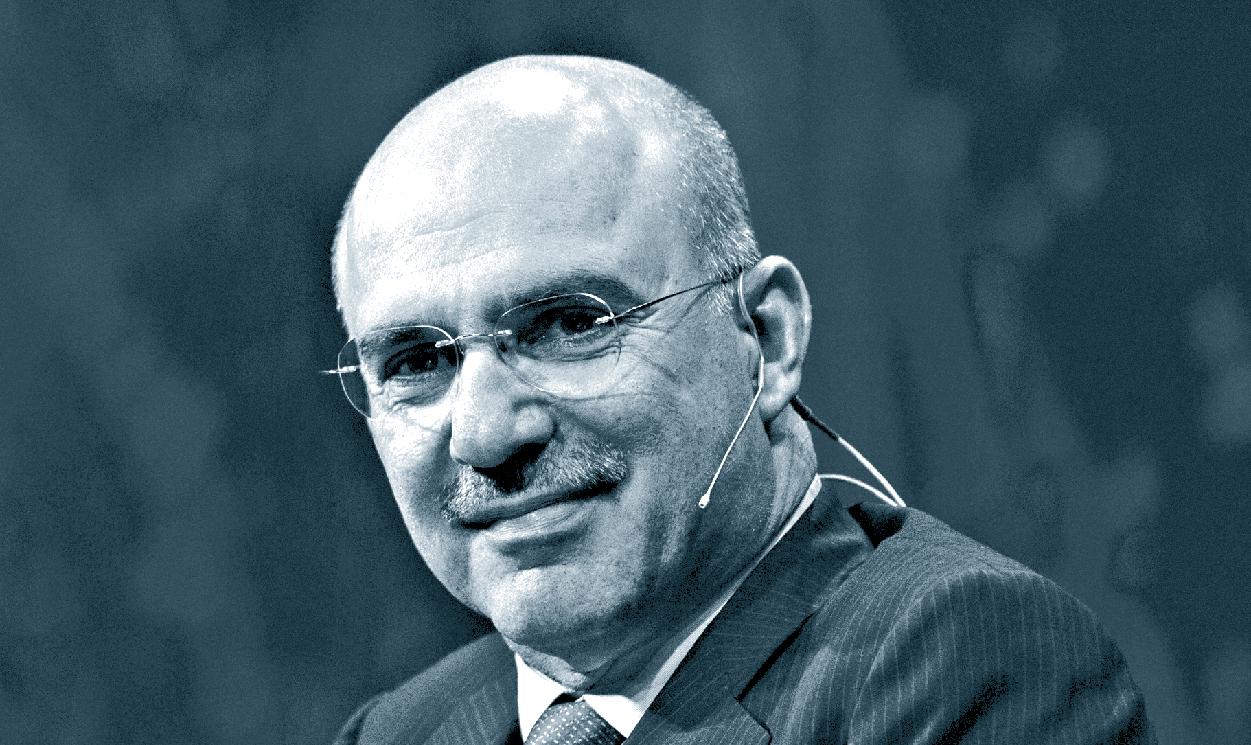
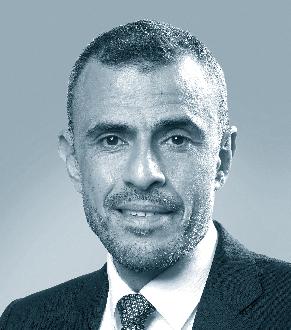
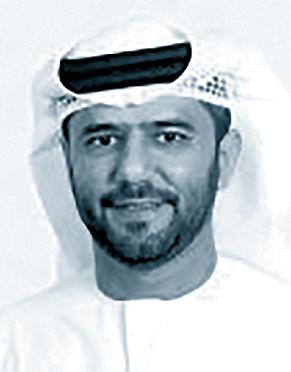
42 SPECIAL REPORT
Karim Awad
47 49 48 46
Hatem Dowidar CEO, e& Group
Mohamed Juma Al Shamisi
Managing director and CEO, AD Ports Group
Mohammed bin Mahfoodh Alardhi
Executive chairman, Investcorp
Origin: Bahrain Residence: Bahrain
Sector: Diversified 2022 rank: 48
Khalid Al Rumaihi
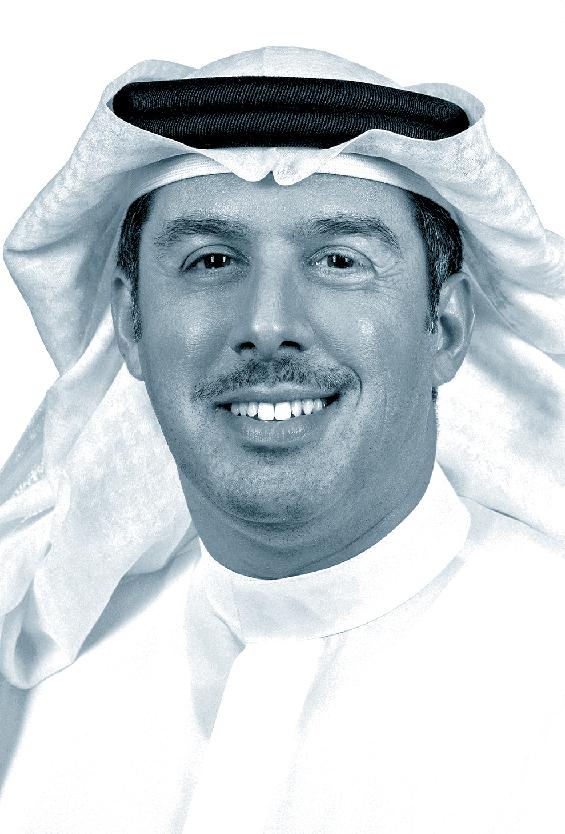
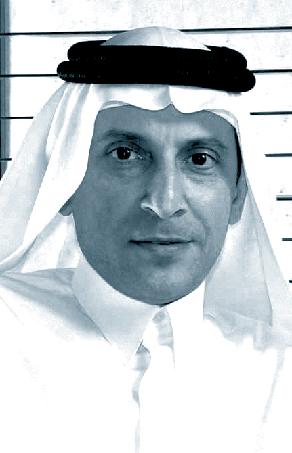
CEO, Bahrain Mumtalakat Holding Company
Leading the 11th largest sovereign wealth fund in the Middle East with more than $18bn in assets under management, Al Rumaihi has a career that spans more than three decades.
Under his guidance, Mumtalakat registered a record full-year net profit of BHD45.6m in 2021, while its revenues surged by 34 per cent to BHD2.2bn. He oversees Mumtalakat’s portfolio of more than 50 companies that comprises strategic investments, global asset management, local impact investments and government holdings. The state investor accounts for 18 per cent of Bahrain’s GDP and supports over 12,000 jobs. Al Rumaihi serves on the boards of several entities, including the Bahrain Economic Development Board, the National Bank of Bahrain, McLaren Group, the National Oil & Gas Authority and Arcapita. He also chairs the boards of Bahrain Real Estate Investment (Edamah) and the Bahrain Development Bank.
Origin: Egypt
Residence: UK
Sector: Diversified
2022 rank: 51
Origin: Qatar
Residence: Qatar
Sector: Aviation/ Tourism 2022 rank: 55
Group chief executive, Qatar Airways
Sawiris’ V Sports, the holding company of Aston Villa, and Wes Edens are set to acquire a 46 per cent stake in Portuguese club Vitoria SC in a deal valued at EUR5.5m. With investment interests ranging from sports to industry, Sawiris owns a 39 per cent stake in Euronext-listed chemical producer OCI. The company, which was formed out of a demerger from his family’s business, Orascom Construction, reported a net profit of $1.3bn while its revenues soared by 54 per cent to $9.7bn in 2022.
Fertiglobe, a joint venture between Abu Dhabi National Oil Company and chemical producer OCI, raised $795m via an IPO in October 2021. The tycoon’s other assets include 7 per cent of Adidas and a stake in Arkema, a French producer of speciality materials.
Origin: Egypt
Residence: Egypt
Sector: Diversified 2022 rank: 53
Qatar Airways reported a record net profit of $1.54bn for FY2021-22, as well as carried 18.5 million passengers, up 218 per cent over the previous year. Piloting the carrier ahead is Al Baker, who is looking to build on the carrier’s existing momentum. The airline will add over 655 weekly flights to its summer 2023 schedule compared to last year, and announced seven new destinations planned for launch this year. As chairman of Qatar Tourism, Al Baker has also played a pivotal role in promoting the country as a prominent tourism hub.
Managing director and CEO, Orascom Investment Holding
Naguib is Nassef Sawiris’ elder brother. He owns stakes in gold mines, including Endeavour Mining, Golden Star Resources and Altus Strategies through his closely held company, La Mancha Resources. Under his guidance, La Mancha made a series of investments in 2022, including $25m in Horizonte Minerals, $69m in G Mining Ventures and the acquisition of an $8.5m stake in Elemental Royalties. La Mancha has invested $1.3bn as of December 2022.
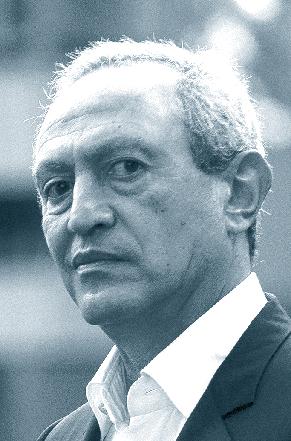
The tycoon is the executive chairman of Orascom TMT Investments, which has stakes in an asset manager in Egypt and Italian internet company Italiaonline, among others. He also chairs Orascom Investment Holding, La Mancha Holding – a private natural resource investment vehicle and Ora – a real estate developer investing in several prime locations worldwide.
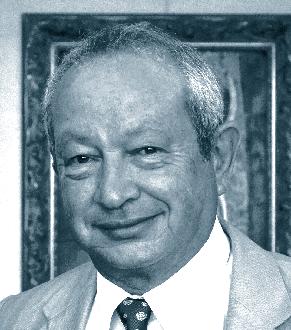
43 SPECIAL REPORT
Naguib Sawiris
53
52
Akbar Al Baker
51
Nassef Sawiris
50
Executive chairman, OCI/co-owner, Aston Villa FC
DOWN TO THE DETAILS

























44 SPECIAL REPORT
Our power list recognises the Arab world’s most influential figures. Where do they reside and which sectors do they operate in? SECTORS Aviation Diplomacy Energy FMCG Logistics Retail Sports Tourism Culture and Society Diversified Finance Industry Real Estate Science and Technology Telecoms RESIDENCE RANKS 52 16 12 20 NEW DESIGNATIONS CEO / MD CHAIRPERSON FOUNDER PRESIDENT OTHERS 33 31 10 03 23 03 10 01 06 24 21 02 02 04 03 06 02 05 05 04 GENDER Male Female 02 Bahrain 05 Egypt 16 Saudi Arabia 06 Kuwait 49 UAE 01 Tunisia 01 Switzerland 06 Qatar 01 Palestine 03 Oman 03 Morocco 01 Mexico 01 Lebanon 02 UK 03 US
Origin: Bahrain
Under Ali’s leadership, the Air Arabia Group reported a 70 per cent increase in net profit to Dhs1.2bn in 2022 and carried 12.8m passengers, up 90 per cent compared to 6.8m a year earlier. The airline added 24 new routes to its global network and 10 new aircra t to its fleet in 2022. Today, the budget carrier flies its fleet of 68 Airbus A320 and A321 aircra t to more than 190 destinations across the Middle East, Africa, Asia and Europe. The group launched operations of its new joint venture, Fly Arna and Fly Jinnah, in June and October 2022, respectively. It announced that it is setting up Air Arabia Sudan based in Khartoum in partnership with DAL Group in September 2022.
With a career spanning more than 28 years, Ali has transformed Air Arabia as the carrier has grown exponentially over the years. It operates a multi-air operator certificates business model from its hubs in the UAE, Morocco, Egypt, Armenia and Pakistan.
Origin: Qatar
Fakhroo’s Ooredoo Group reported full-year revenues of $6.2bn in 2022 and has a global customer base of more than 55 million customers as of December 31, 2022.
The telecoms firm sold its Myanmar business for an enterprise value of $576m in September 2022 and is preparing to carve out its portfolio of 20,000 towers. Ooredoo o ers customers mobile, fixed, broadband internet and corporate-managed services in over 10 countries across MENA and Southeast Asia.
Fakhroo was appointed managing director and CEO of Qatarbased telecoms major Ooredoo Group in November 2020, having served on the company’s board of directors since 2011.
He also serves on the boards of multinational hospitality companies Accor, Qatar Museums and Katara Hospitality. Previously, he was the co-head of mergers and acquisitions at Qatar Investment Authority and the former deputy undersecretary for Budget, Treasury and Financial A airs at the Ministry of Finance.
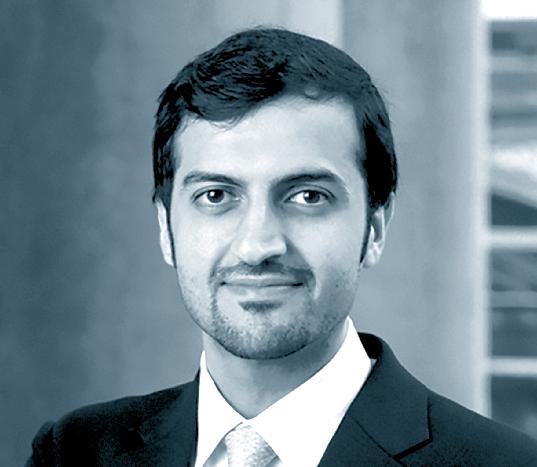
 Mohammad A Baker Deputy chairman and CEO, GMG
Mohammad A Baker Deputy chairman and CEO, GMG
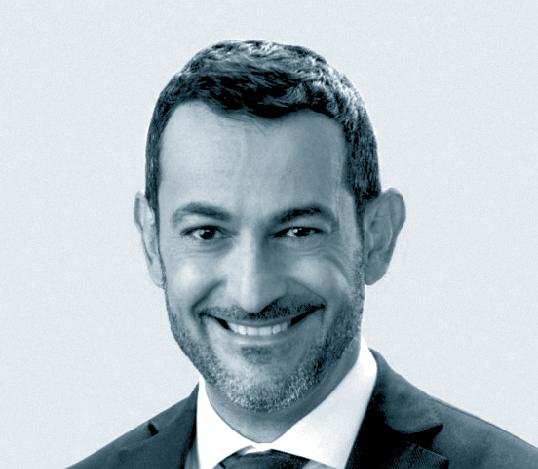
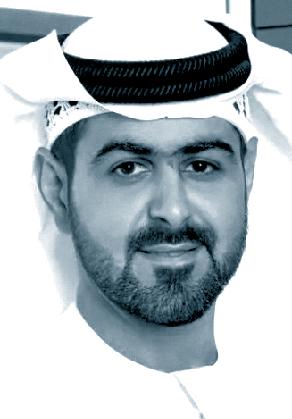
Origin: UAE
Alseddiqi, who assumed a board position as MD last June, remains SHUAA’s biggest shareholder with a 29.9 per cent stake in the investment firm. Under him, SHUAA closed several transactions in 2022; it acquired a controlling stake in Souqalmal and listed a $100m SPAC on Nasdaq. From leading ADFG since its creation in 2011 to its merger with SHUAA in 2019, Alseddiqi is credited for creating an investment powerhouse with $13.1bn assets under management as of December 2022. He has also expanded its portfolio across more than eight countries. He is also the chairman of SALAMA Insurance Company and Esraq Investments. He’s on the board of Dana Gas and is an advisor at San Francisco-based venture fund 500 Startups.
Origin: UAE Residence: UAE
Sector: Retail 2022 rank: 59
Under Baker’s visionary leadership, GMG acquired aswaaq from the Investment Corporation of Dubai in February, a deal that added 11 community malls and 22 supermarkets to the conglomerate’s expanding retail portfolio. It plans to open 100 sports retail stores in Egypt by 2026 and another 100 in Southeast Asia by 2025. GMG also acquired Géant operations in the UAE from Urban Foods by Dubai Holding in April 2022, adding 18 outlets to its rapidly expanding retail footprint. The UAE-based retailer unveiled four new factories to produce value-added food products in March. The group’s most recognisable retail brand is Sun & Sand Sports, which has over 550 stores, over 90 brands, and more than 9,000 employees. Other homegrown concepts of GMG include Farm Fresh, Supercare Pharmacy and Emirates British Nursery.
45 SPECIAL REPORT
57
Residence:
Sector: Aviation 2022 rank: 57
UAE
Residence:
Sector: Telecoms 2022 rank: 58
Qatar
Residence:
Sector:
2022 rank: 52
UAE
Finance
54 56 55
Adel Abdulla Ali Group CEO, Air Arabia
Aziz Aluthman Fakhroo Managing director and CEO, Ooredoo
Jassim Alseddiqi
Board managing director, Shuaa Capital
Origin: UAE Residence: UAE Sector: Diversified
Mohammad Ali bin Rashed Lootah President and CEO, Dubai Chambers
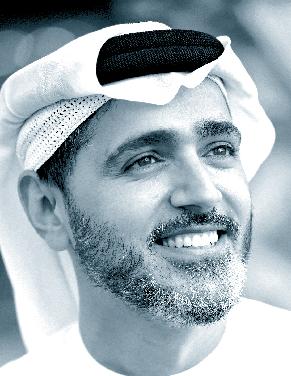
Lootah was appointed as the president and CEO OF Dubai Chambers in October 2022 to replace the outgoing Hamad Buamim. Lootah hit the ground running and under his leadership, the Dubai Chambers has launched 29 new business groups, bringing the current total to 105, covering various areas of the city’s economy. The chamber also expanded its bilateral relationships by opening new offices in Hong Kong, Turkiye, Egypt and Israel.
Lootah is spearheading the growth of Dubai’s startup ecosystem with more than $2bn in funding raised by the end of October 2022. In support of D33, the Dubai Chamber of Digital Economy, one of the three units operating under Dubai Chambers, projected in January that the city’s digital economy will grow to more than $140bn in 2031 from $38bn currently.
Origin: UAE
Residence: UAE
Sector: Tourism 2022 rank: 72
Issam Kazim
CEO, Dubai Corporation for Tourism and Commerce Marketing
Kazim has been on a mission to promote Dubai as the most sought-after destination. The emirate welcomed 14.36 million international overnight visitors last year, growing 97 per cent year-on-year. More so, the city closed in on its pre-pandemic visitation figures of 16.73 million recorded in 2019. As the emirate continues to grow in line with the Dubai Economic Agenda – D33, to consolidate its position as one of the world’s top three cities for tourism and business, Kazim is expected to play a pivotal role in realising that vision.
Origin: Kuwait
Residence: Kuwait
Sector: Diversified 2022 rank: 60
Kutayba Yusuf Alghanim
Executive chairman, Alghanim Industries
Origin: UAE Residence: UAE Sector: Finance 2022 rank: 63
Ala’a Eraiqat
Group CEO, Abu Dhabi Commercial Bank
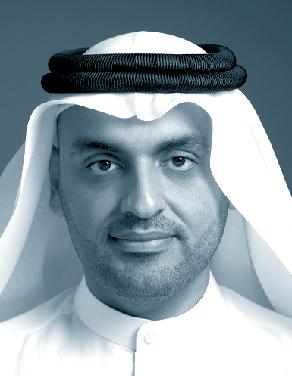
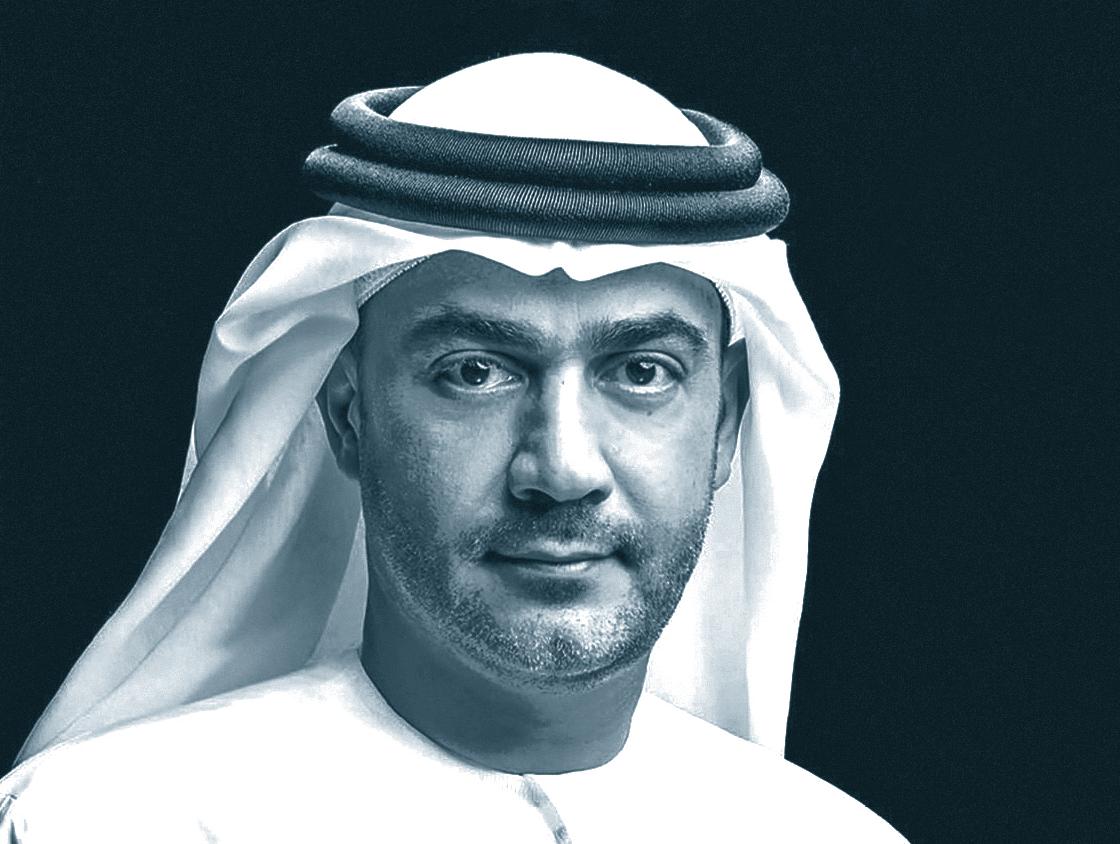
Eraiqat joined Abu Dhabi Commercial Bank (ADCB) in 2004 and rose through the ranks to become the lender’s chief executive officer in 2009. Under his guidance, ADCB reported a full-year net profit of Dhs6.434bn for 2022, up 23 per cent year-on-year, while its total assets at year-end stood at Dhs498bn. The lender, which has embedded ESG into its corporate strategy, issued its inaugural $500m green bond to drive investments into low-carbon initiatives last year. Eraiqat is a board member of Abu Dhabi National Hotels and Abu Dhabi Chamber.
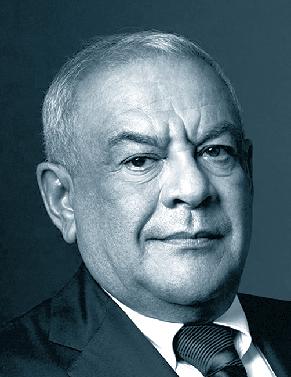
Alghanim is credited for transforming the group from a family to a privatelyowned business with a global workforce of more than 14,000 and operations that cover the Middle East, India and Asia across automobiles, retail and construction. During an interview in August 2022, he said he was considering listing a minority stake in the company on the local exchange.
Alghanim is one of the biggest sponsors of several education-focused initiatives in Kuwait. Under his guidance, the group has maintained a close connection with the youth in Kuwait. The company sponsored the 10th biannual Takween Charity Reading Marathon in December 2022.
46 SPECIAL REPORT
59
58
NEW
61 60
Origin: Lebanon
Residence: Lebanon
Sector:Culture and Society
2022 rank: 61
Elie Saab
Fashion designer
The famed Lebanese designer brought a vibrant collection to the Paris catwalk in January 2022 after nearly two years.
In July 2022, Saab dazzled attendees at the Paris Haute Couture Week, as he debuted a line-up of striking menswear pieces among his signature collection of red carpet-ready dresses for women.
Since the founding of his label in 1982, Saab’s ELIE SAAB house has cemented its position in the haute couture category globally with ateliers in Paris and Beirut.
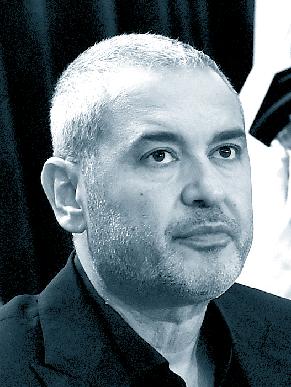
He expanded his Elie Saab Maison, a lineup of furniture, lighting and home accessories, into Southeast Asia – bringing high-fashion comfort to luxury homes in Vietnam. Saab also has a partnership with Emaar.
Origin: Palestine
Residence: UAE
Sector: Retail 2022 rank: 62
Mona Ataya
Founder and CEO, Mumzworld
Ataya, alongside co-founder Leena Khalil established Mumzworld in 2011. The platform has secured more than $50m in funding since its launch. In June 2021, Saudi-based company Tamer Group acquired Mumzworld and Ataya assumed the role of group CEO for all digital assets within the group. To keep up with the increasing demands, the platform expanded its operations by joining EZDubai, an e-commerce free zone in Dubai last year. Currently, Mumzworld provides access to over 350,000 products from 6,500 global brands, serving 2.5 million customers.
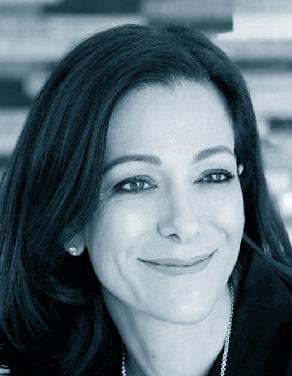
Origin: UAE
Residence: UAE
Sector: Aviation 2022 rank: 69
Ghaith Al Ghaith
CEO, flydubai
Origin: UAE Residence: UAE Sector: Industry 2022 rank: 64
Abdulla Jassem Kalban
Managing director, Emirates Global Aluminium (EGA)
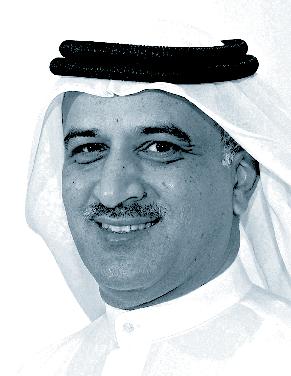
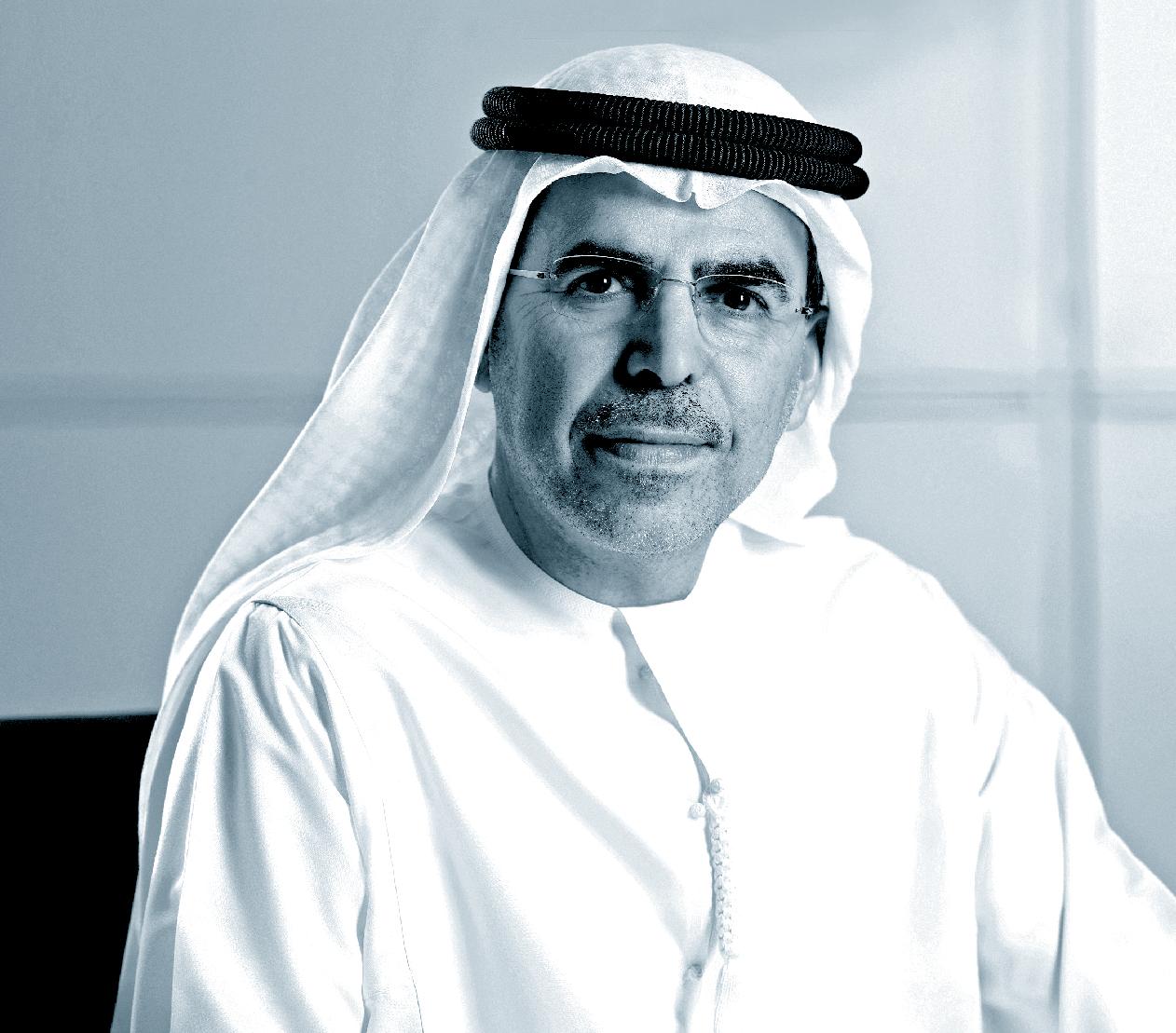
Kalban is responsible for achieving EGA’s strategic objectives and projects. The company reported a net profit of $2bn for 2022, up 34 per cent from $1.5bn posted in 2021, while its revenue increased 36 per cent to reach $9.4bn. Meanwhile, Dubal Holding, of which Kalban is vice chairman, reported Dhs3.7bn in net profit last year, rising 37 per cent from the previous year’s figure of Dhs2.7bn.
On the back of robust measures and optimisation strategies, Dubai carrier flydubai fared strongly in 2022, having carried 10.6 million passengers, 89 per cent higher than the previous year. The airline netted $327m in net profit, rising 43 per cent compared to 2021. At its helm is CEO Al Ghaith, who has navigated the airline through a year filled with good tidings for the aviation sector. With travel expected to build on the current momentum, Al Ghaith will be instrumental in forging the carrier forward in terms of growth and expansion.
47 SPECIAL REPORT
63
62
65 64
Origin: Kuwait Residence: Kuwait Sector: Energy NEW Wadha Ahmed Al-Khateeb
CEO, Kuwait National Petroleum Company
In November 2022, state-owned Kuwait Petroleum Corporation appointed Al-Khateeb as the CEO of its subsidiary Kuwait National Petroleum Company (KNPC), which reported profits worth KD341m ($1.11bn) and revenues totalling KD10.24bn ($33.38bn) for the financial year 2021/2022. Al-Khateeb was previously the deputy CEO of Mina Abdullah refinery, which was built in 1958, fully acquired by Kuwait in 1977 and transferred to KNPC in 1978. KNPC launched its 2040 Updated Strategy in March of last year, an initiative that Al-Khateeb is now expected to drive forward.
Origin: UAE
Residence: UAE
Sector: Real Estate 2022 rank: 65
Hesham Al Qassim
CEO, wasl Asset Management
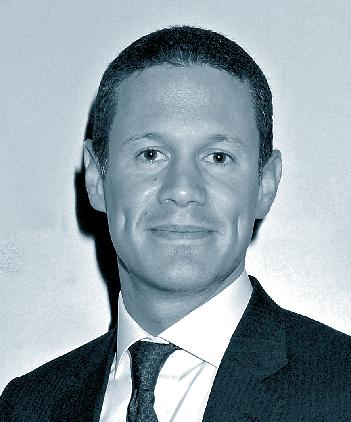
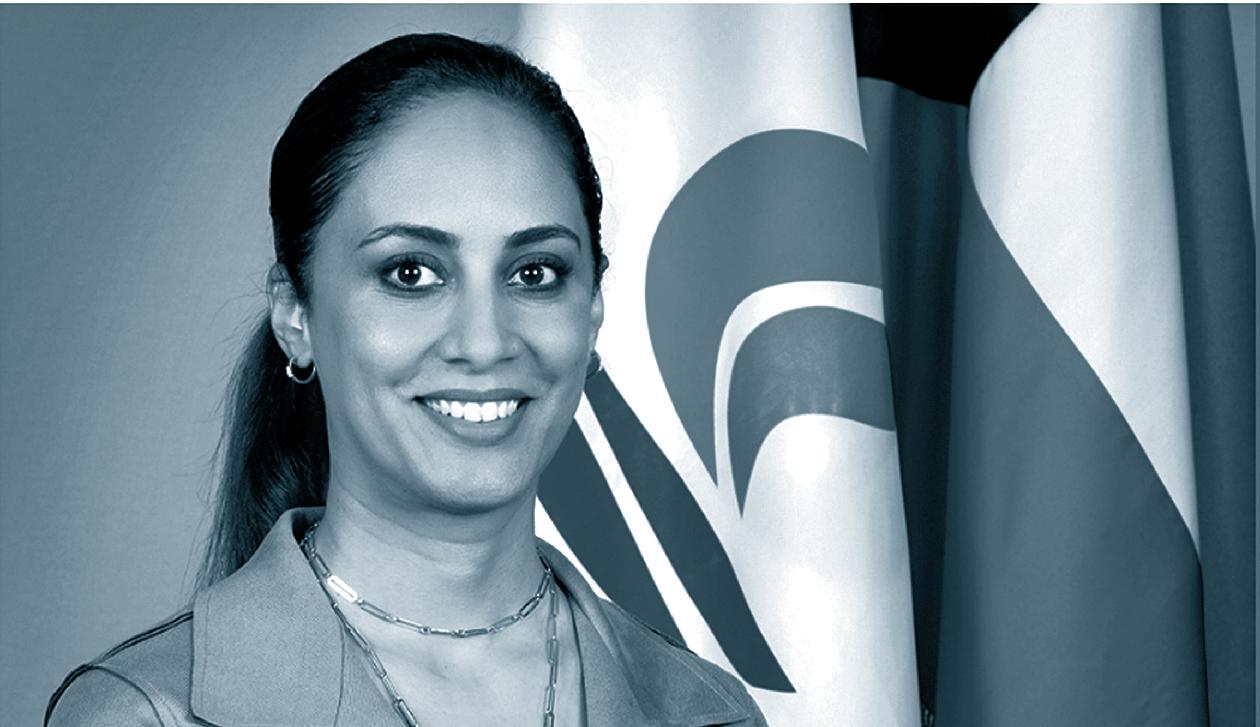
In 2022, 122,658 real estate transactions were concluded in Dubai, valued at Dhs528bn. As the CEO of wasl Asset Management, a real estate division that oversees more than 47,000 residential and commercial properties in Dubai, Al Qassim is a central figure in the property market. Beyond it, he is the vice chairman and managing director of Emirates NBD, chairman of the Emirates Islamic Bank, and on the boards of DIFC Investments as well as e&, among others.
Origin: UAE
Residence: UAE
Sector: Diversified 2022 rank: 67
Origin: Mauritania
Residence: UAE
Sector: Culture and Society
2022 rank: 66
Sheikh Abdullah bin Bayyah
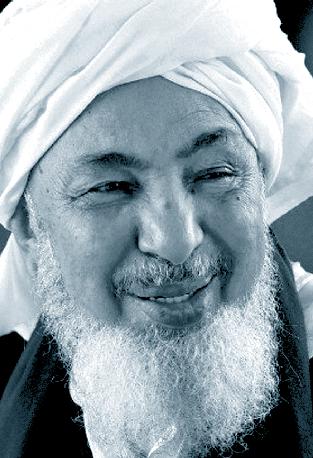
Chairman, UAE Fatwa Council
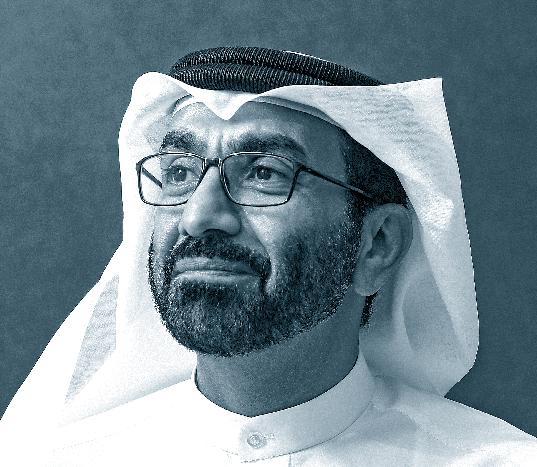
As the chairman of UAE Fatwa Council, Sheikh Abdullah is known for promoting peace and encouraging interfaith dialogue. He previously served as a judge at the High Court of the Islamic Republic of Mauritania and was also the head of Shariah Affairs at its Ministry of Justice. The head of the Abu Dhabi Forum for Peace, Sheikh Abdullah is widely respected for his views on religious tolerance and for encouraging harmony. Earlier this year, the UAE Fatwa Council signed a MoU with Mohamed Bin Zayed University for Humanities to launch a mufti training programme.
Badr Jafar
CEO, Crescent Enterprises
Jafar is at the helm of UAE-based Crescent Enterprises, which spans sectors ranging from ports and logistics, power and engineering, food and beverage to business aviation. Holding a strong view on sustainability and the climate crisis, Jafar co-hosted an event on Climate and Nature Positive Philanthropy with Prince Albert II of Monaco Foundation during the World Economic Forum’s Annual Meeting in Davos this year.
Last year, Crescent Enterprises announced its renewed partnership with Emirates Nature-WWF, to support the UAE’s environmental initiatives. Jafar is also the president of Crescent Petroleum.
48 SPECIAL REPORT
66
68
69
67
Photo courtesy: knpc
Origin: Bahrain/UAE
Residence: UAE
Sector: Diversified
2022 rank: 71
Tarek Sultan
CEO and vice chairman, Agility
Kanoo, who is the chairman of family-owned conglomerate, The Kanoo Group, took up the current role in 2015, prior to which he was the company’s deputy chairman. Speaking of the company’s expansion plans in an interview with Bloomberg TV in December last year, Kanoo said that the group is seeking opportunities to invest in the Middle East, and in markets such as India and China in 2023. The group has business activities across several industries, ranging from shipping, travel, energy, real estate, logistics to specialty chemicals, among others.
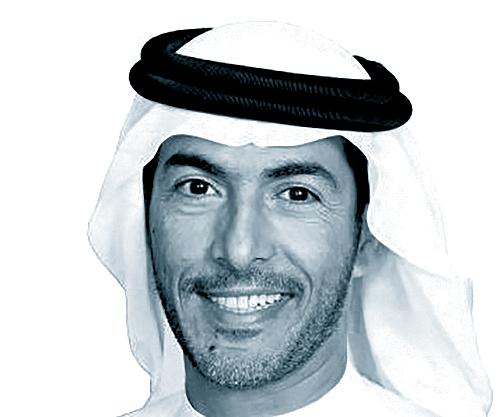
Origin: Kuwait Residence: Kuwait Sector: Supply Chain 2022 Rank: 73
Driven by Sultan’s astute leadership, Agility has risen to become one of the largest logistics companies in MENA. In Q3 2022, the company reported an increase of 48 per cent in earnings, with revenues touching KD256.3m. Helming the company for over 25 years, Sultan has expanded it from a $300m business to a global conglomerate with a market cap of over $7bn. In 2022, Agility acquired UK-based Menzies Aviation, combining the business with its National Aviation Services. Together, they make the world’s largest aviation services company by the number of countries and the second largest by the number of airports served.
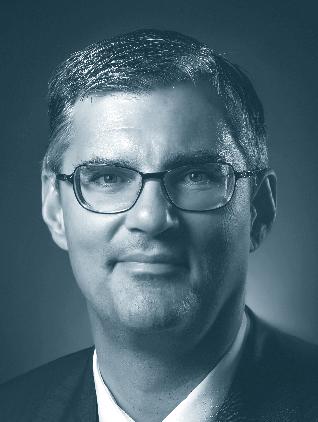
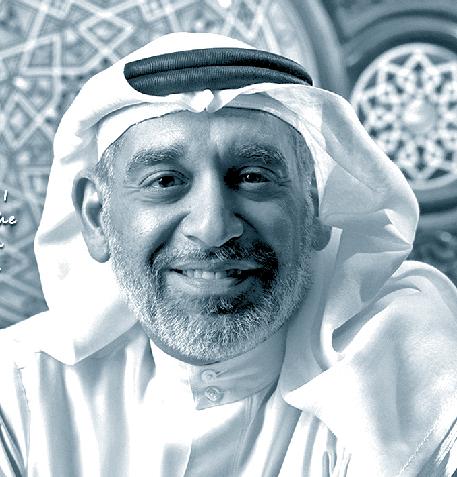
Other strategic moves by Sultan include investment in developing logistics parks and centres across the MENA region in Kuwait, Saudi Arabia and Egypt.
Origin: Oman
Residence: Oman
Sector: Diversified
Bahwan has been a board member of Suhail Bahwan Group since 2016 and currently serves as its vice chairperson. She has extensive experience in managing companies across the Bahwan Group since 1998. The group, which was founded by her father Suhail Bahwan, is one of Oman’s largest and most diverse companies with a presence in various sectors, including telecom, healthcare, travel and tourism, logistics, energy and power as well as fertilisers and chemicals, among others.
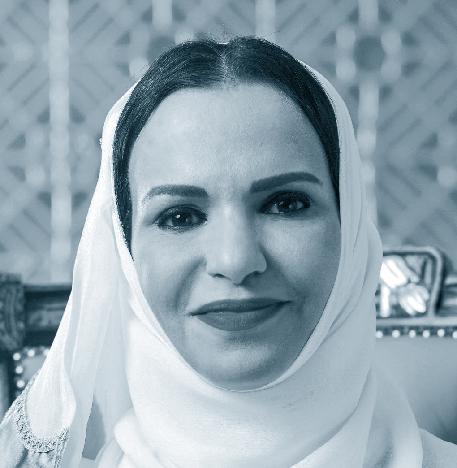
Bahwan is also the chairperson of National Bank of Oman and holds key positions in several other corporate entities, including chairperson at Al Jazeera Steel Products, chairperson at Oman International Hospital, board member at National Pharmaceutical Industries and board member at Oman Oil Marketing. Bahwan holds a bachelor’s degree in education and a master’s degree in administration from Sultan Qaboos University, Oman.
Origin: UAE
Residence: UAE
Sector: Finance
2022 rank: 76
Since Balama was appointed CBUAE’s governor in 2021, the central bank has rolled out many initiatives to sustain the UAE’s monetary and financial stability. Recently, CBUAE announced its Central Bank Digital Currency strategy, which will help accelerate domestic and cross-border payments and the move towards a cashless society. The initiative is a part of CBUAE’s Financial Infrastructure Transformation Programme (FIT Programme) that aims to expedite digital transformation across the country’s financial services sector. Under the FIT Programme, CBUAE will adopt advanced technologies and data management solutions to improve regulatory compliance, reduce operational costs and enhance innovation and customer experience. Other initiatives spearheaded by CBUAE include the issuance of new guidance to combat money laundering and terrorism financing and the development of more robust frameworks to supervise banks’ exposure to the real estate sector.
49 SPECIAL REPORT
70
73
Mishal Kanoo Chairman, The Kanoo Group
71
Amal Suhail Bahwan
Vice chairperson, Suhail Bahwan Group
Khaled Mohammed Balama Governor, Central Bank of the UAE (CBUAE)
72 NEW
Origin: Oman
Residence: Oman
Sector: Energy 2022 rank: 74
Shortly after being appointed as the CEO of Energy Development Oman (EDO), Lamki put into motion a series of strategic plans to improve the credit rating of the Sultanate and attract investment into its energy sector. The first was EDO’s achievement of a long-term credit rating with a stable outlook (BB-) by S&P’s Global Ratings and a standalone (BBB-) credit rating. Following this, EDO inked an MoU with Abraj Energy Services to develop services connected to oil and gas extraction. Lamki brings over two decades of experience in the oil and gas industry to EDO, which was established in 2020 to play a central role in Oman’s energy transition to renewables and boost economic diversification.
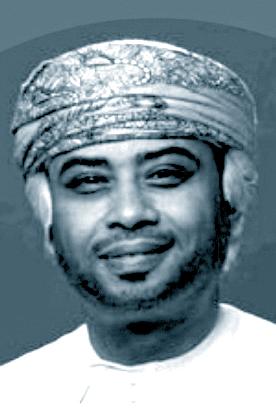
Origin: Jordan Residence: UAE Sector: Finance/Logistics
2022 rank: 75
Fadi Ghandour
Executive chairman WAMDA/co-founder, Aramex
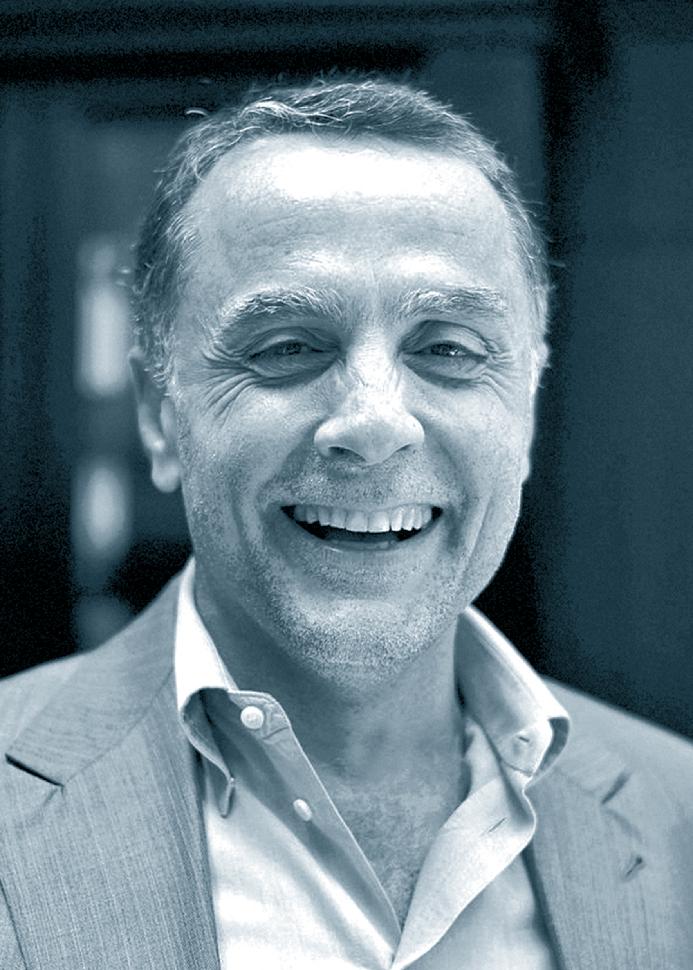
Aramex ended the year with a strong cash balance of $209m. In October 2022, the company completed the pilot phase of its drone delivery programme in Oman. This was followed by the successful testing of its drone and roadside bot deliveries in the UAE, earlier this year. The logistics provider also acquired MyUS, a global technology-driven platform, strengthening its cross-border express business.
A passionate advocate for startups, Ghandour has been the mind behind some of the region’s largest investment funds, such as MENA Venture Investments and Wamda MENA Ventures I. Wamda is recognised as one of the region’s leading venture capital investors in high-growth technology businesses. In addition, Ghandour’s non-profit Ruwwad initiative has been instrumental in helping disenfranchised communities through education, youth volunteerism and grassroots organising in Palestine, Jordan, Egypt and beyond.
76
Origin: Palestine
Residence: US
Sector: Culture and Society 2022 rank: 77
With collaborators like Cardi B, Justin Bieber, Jay-Z, Beyoncé, John Legend and Post Malone, DJ Khaled is a legend in the world of music. Born in the US to a family of Palestinian musicians, DJ Khaled started his career as a rap artist, becoming a record producer, DJ and social media star. His Khaled Khaled album went platinum in 2021 – his fourth album to bag the coveted certification. Outside of his music, DJ Khaled has emerged as a prominent personality on social media channels commanding a significant following on several platforms: 33.5 million followers on Instagram, 13.4 million on Snapchat and 4.7 million on TikTok. In March this year, he made his fashion debut walking the ramp with supermodel Naomi Campbell for Hugo Boss.
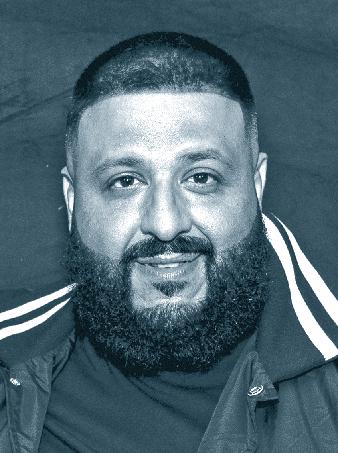
Origin: Palestine - US
Residence: US
Sector: FMCG 2022 rank: 79
Mohammed Abu Ghazaleh Chairman and CEO, Fresh Del Monte
Ghazaleh is well-versed in turning around finances for Fresh Del Monte. Starting in 1996, he transformed the company from a business keeling under a $300m debt into a globallyknown brand; in 2018, he pulled the company through falling share prices; and in 2020, he steered the company through the global pandemic. Ghazaleh’s efforts have paid off. In 2022, Fresh Del Monte reported its best-performing Q4 in recent history, led by strong net sales and margins.
The company’s net sales for Q4 increased by $22.7m; for the full fiscal year, net sales increased by $190.3m, compared with the prior-year period. For the full fiscal year 2022, gross profit was $340.2m compared with $303.8m in the prior year.
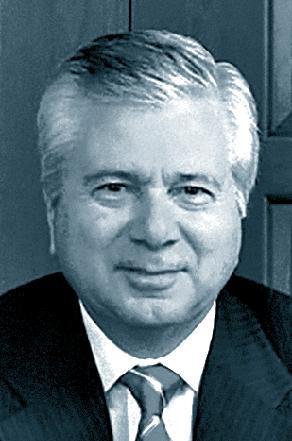
50 SPECIAL REPORT
DJ Khaled Musician
75
Mazin Rashid Lamki CEO, Energy Development Oman
77
74
Origin: UAE
Residence: UAE
Sector: Diversified 2022 rank: 78
As the COO and board member of one of the region’s most prolific privately-owned businesses, Al Rostamani wears many hats. She oversees the group’s HR, IT and Strategy functions and is the CEO of AWR Properties division. Al Rostamani has been instrumental in steering the group’s interest in automobiles, logistics and travel sectors. She is a non-executive board member at HSBC Bank Middle East Limited, Sandooq Al Watan and Al Jalila Foundation. Previously, as a strategic business enabler, Al Rostamani championed the development of Dubai Design District (d3) and was the group CEO of the TECOM group. Al Rostamani is recognised as an authority on wireless technologies and her contributions have appeared in leading global publications and journals.
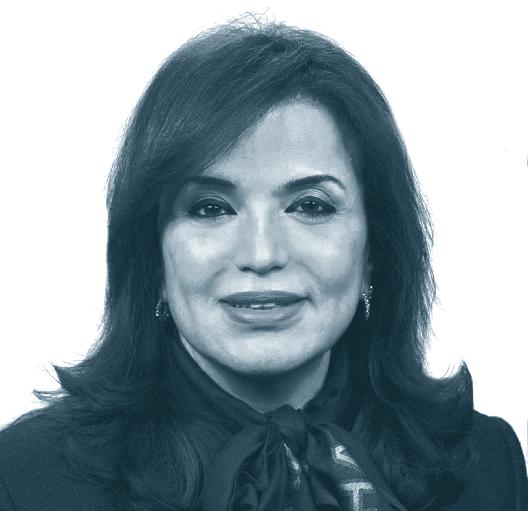
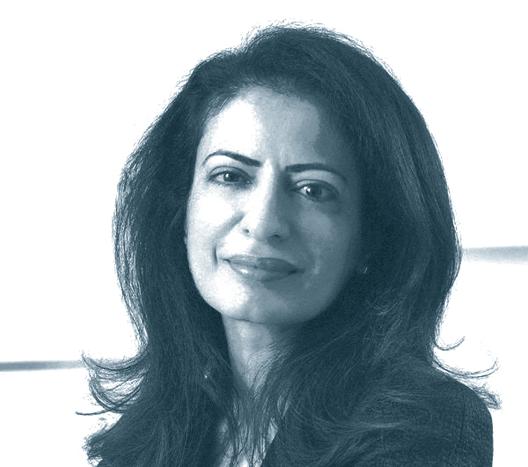
Origin: Syria
Residence: UAE
Sector: Retail 2022 rank: 81
Widely regarded as the MENA region’s “king” of e-commerce, Mouchawar continues to galvanise the region’s digital advancement. As Amazon MENA’s vice president, Mouchawar is committed to bringing Amazon’s logistics technology and innovation to support the region’s e-commerce ecosystem. In 2023, the company announced that it would host products from 100,000 businesses, including local SMBs, on its UAE website by 2026, supporting UAE’s vision to transform into a global digital economy. This was followed by the opening of a new 350,000 square feet Fulfillment Center in Dubai South. In 2022, Amazon opened its new office in Riyadh, Saudi Arabia and launched its second region in the Middle East, the AWS Middle East (UAE) Region in Abu Dhabi, UAE.
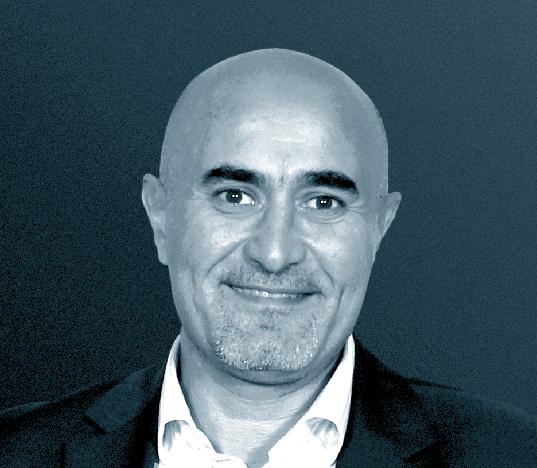
Origin: Kuwait
Residence: Kuwait
Sector: Finance 2022 rank: 80
Deputy group CEO, National Bank of Kuwait (NBK)
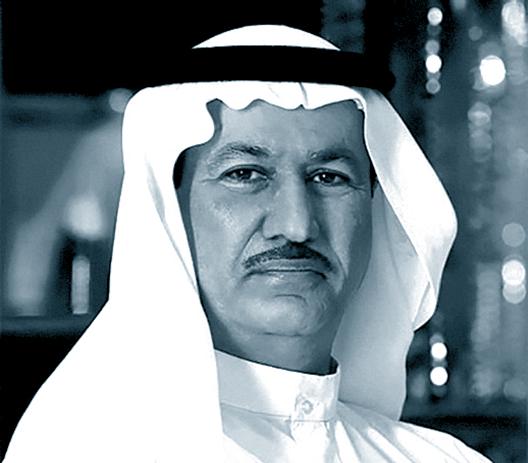
Shaikha Al Bahar is a powerful voice in the region’s banking industry. The ‘Distinguished Services to Arab Banking’ award she received from the Arab Bankers Association in November last year is a testament to her influence. Al Bahar has been with the National Bank of Kuwait for over 35 years, during which the bank has become the largest in Kuwait. In 2022, NBK recorded over $1.7bn in profit from a net operating income of $3.3bn.
The Shaikha is recognised for her crucial role in shaping NBK’s strategic vision, positioning it as the most valuable banking brand in Kuwait and among the top five banking brands regionally. In addition, she is a strong proponent of women empowerment, launched ‘NBK Rise’, a first-of-itskind global women’s leadership initiative that advocates for greater boardroom diversity.
Origin: UAE
Residence: UAE
Sector: Real Estate 2022 rank: 82
After building world-class communities across the world, Damac Properties’ Sajwani has now set his sights on the metaverse. In 2022, Damac established its D-Labs division dedicated to its metaverse initiative, where the company plans to invest $100m to build digital cities. The initiative forms part of a larger push by the group towards digital assets and non-fungible tokens. The conglomerate also announced plans to explore tech-related opportunities in Germany with an estimated spend of up to EUR1bn. As part of Damac’s diversification efforts, Sajwani acquired the famous Swiss jeweller de Grisogono and iconic Italian fashion powerhouse Roberto Cavalli. Most recently, the Group won a $120m bid to acquire land in the Miami neighbourhood of Surfside, where it plans to build an ultra-luxurious, Cavalli-branded condominium project.
51 SPECIAL REPORT
78 80 81 79
Dr Amina Al Rostamani COO, AW Rostamani Group
Ronaldo Mouchawar Co-founder, Souq.com and VP, Amazon MENA
Hussain Sajwani
Founder and chairman, Damac Properties
Shaikha Khaled Al Bahar
Origin: Saudi Arabia
Residence: Saudi Arabia
Sector: Space
Rayyanah Barnawi
Astronaut
In May, Barnawi will take a huge leap for all women in the Arab world as the first female Arab astronaut in space. Barnawi is part of the four-member crew of the Axiom-2 (Ax-2) space mission set to blast off from the Kennedy Space Center in Florida in May. She will serve as a mission specialist on the 10-day Ax-2 mission at the International Space Station, conducting scientific experiments and outreach activities. Barnawi holds a master’s degree in biomedical sciences from Alfaisal University and a Bachelor of Biomedical Sciences from Otago University.
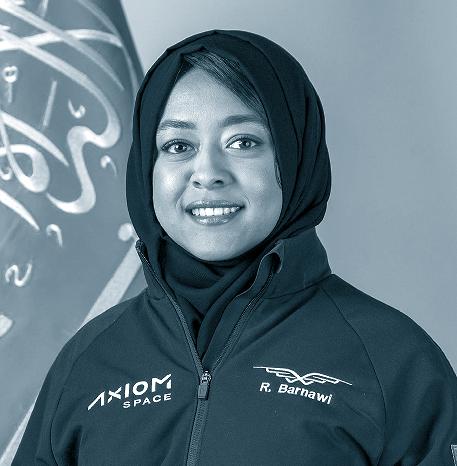
She is also a research laboratory technician with nine years of experience in breast cancer and stem cell cancer research.
Munib Al Masri
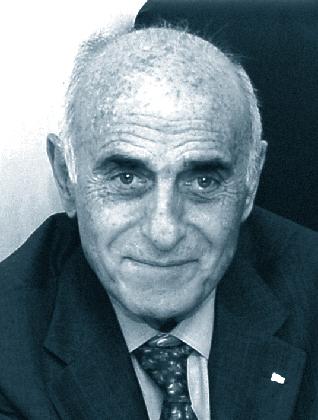
Chairman and founder, Edgo Group
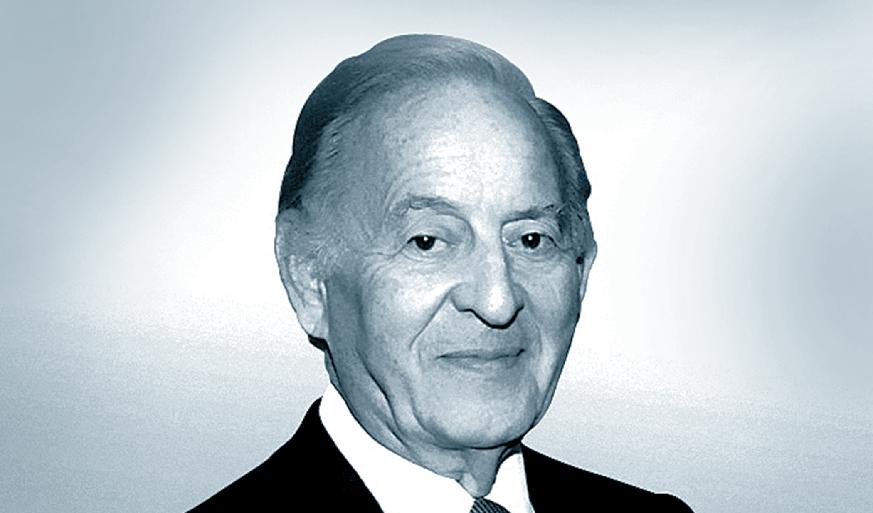
Origin: Palestine
Residence: Palestine
Sector: Diversified 2022 rank: 84
The billionaire spearheads energy conglomerate Edgo, known for delivering integrated service solutions to crucial energy markets across the MENA region. Starting with oil, gas and water exploration, Edgo’s portfolio now includes construction, telecommunications, technology, real estate development, and project financing. Through Edgo, Al Masri has cast his entrepreneurial net wide but remains committed to his Palestinian roots. PADICO, the company he chairs, accounts for up to 27 per cent of the Palestinian economy, employing thousands of people through his Jerusalem Development and Investment Company and PALTEL.
Origin: Morocco Residence: Morocco
Sector: Finance 2022 rank: 88
Othman Benjelloun
Chairman and CEO, Bank of Africa
Origin: Tunisia Residence: Tunisia
Sector: Sports 2022 rank: 85
Jabeur continued her winning streak in 2022, walking away with the Mubadala World Tennis Championship (MWTC) trophy for the second time in a row. The Tunisian tennis player made history in 2021 when she became the first Arab to participate in and win the MWTC and when she played in a Wimbledon quarter-final, again the first Arab to do so. Moreover, she is the first Arab and African woman to reach a Slam final in 2022. Jabeur is credited with paving the way for establishing the Jasmin Open in Tunisia after a chance conversation with IMG Tennis Events’ director in Abu Dhabi.
Despite grappling with worrying levels of debt servicing, strong inflationary pressure and a host of unfavourable political situations, the Bank of Africa exceeded its 2022 targets, both commercially and financially. The bank reported a 19 per cent increase in gross operating income and an improvement in the cost of risk (-12 per cent); the net income group share rose by 29.5 per cent to EUR136m. In addition, the total balance sheet grew by 9.3 per cent in 2022 to EUR10,279m. Performance was mainly driven by the strong rise in outstanding customer loans, exceeding EUR5bn. Under Benjelloun’s leadership, the Bank of Africa Group is currently present in 18 countries and boasts a network of 18 commercial banks, a global holding company, two regional holding companies, an investment company, two technical support subsidiaries, two processing and IT support companies and a representative office.
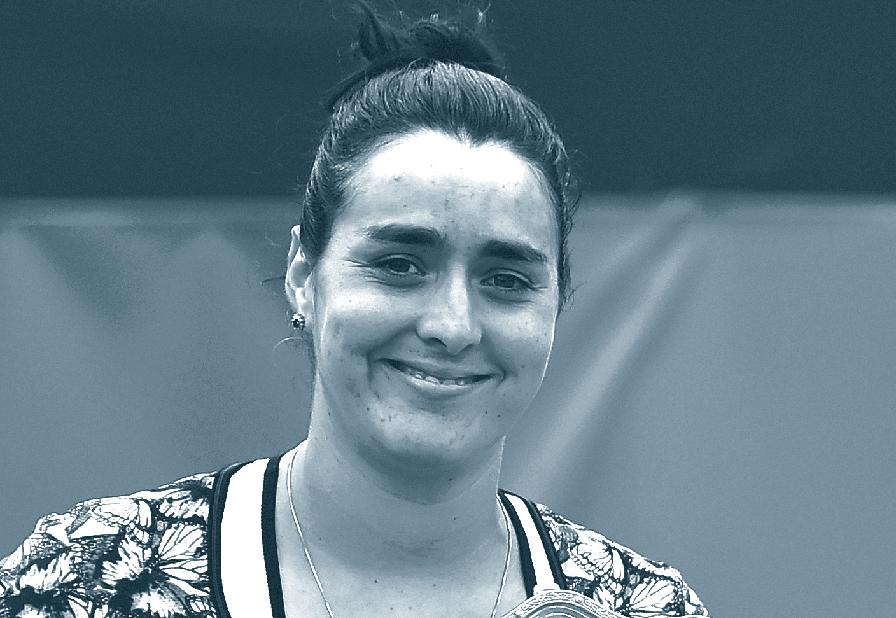
52 SPECIAL REPORT
82
85
83
Ons Jabeur Tennis player
84 NEW
Origin: UAE
Residence: UAE
Sector: Diversified 2022 rank: 86
Al Majid is one of the UAE’s visionary businessmen. In 1950, he set up the Juma Al Majid Holding Group, which has become one of the most reputed organisations in the country. The group’s verticals include real estate, travel and tourism, investments, automobiles, contracting and commercial, to name a few. Across a distinguished career, Al Majid has held key positions in governmental and semi-governmental organisations including chairman of the Dubai Economic Council, vice chairman for the UAE Central Bank, vice chairman for Emirates Bank International, director for the Dubai Chamber of Commerce & Industry, and board member for AI Nisr Publishing and others.
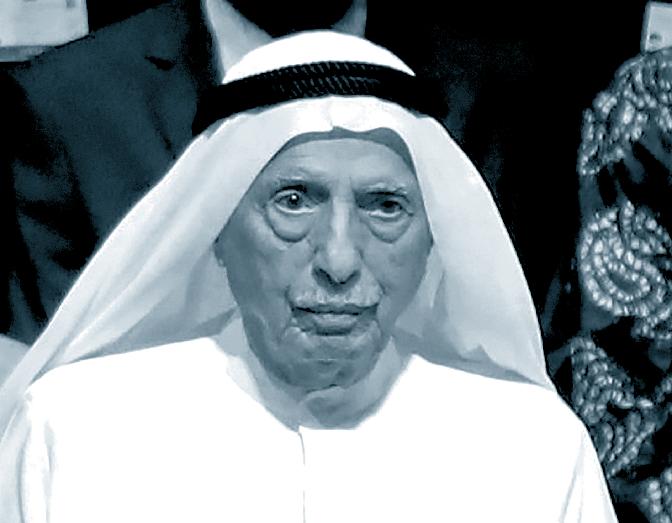
Origin: Saudi Arabia/ Ethiopia
Residence: Saudi
Arabia
Sector: Diversified 2022 rank: 89
Mohammed Al Amoudi Owner, MIDROC
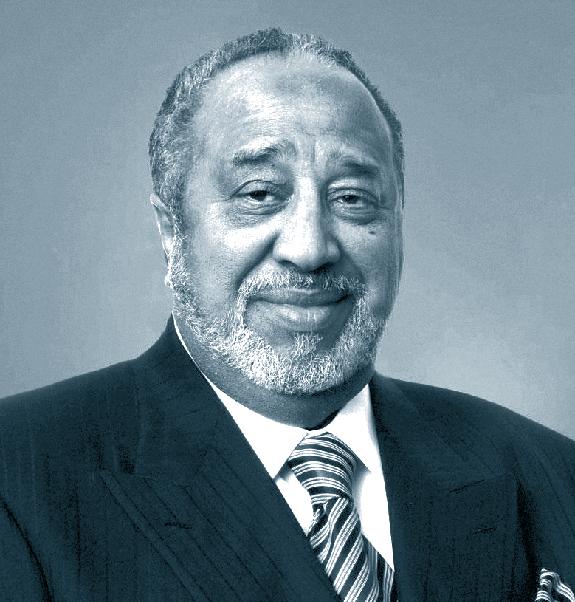
Origin: UAE Residence: UAE
Sector: Diplomacy 2022 rank: 93
Lana Nusseibeh
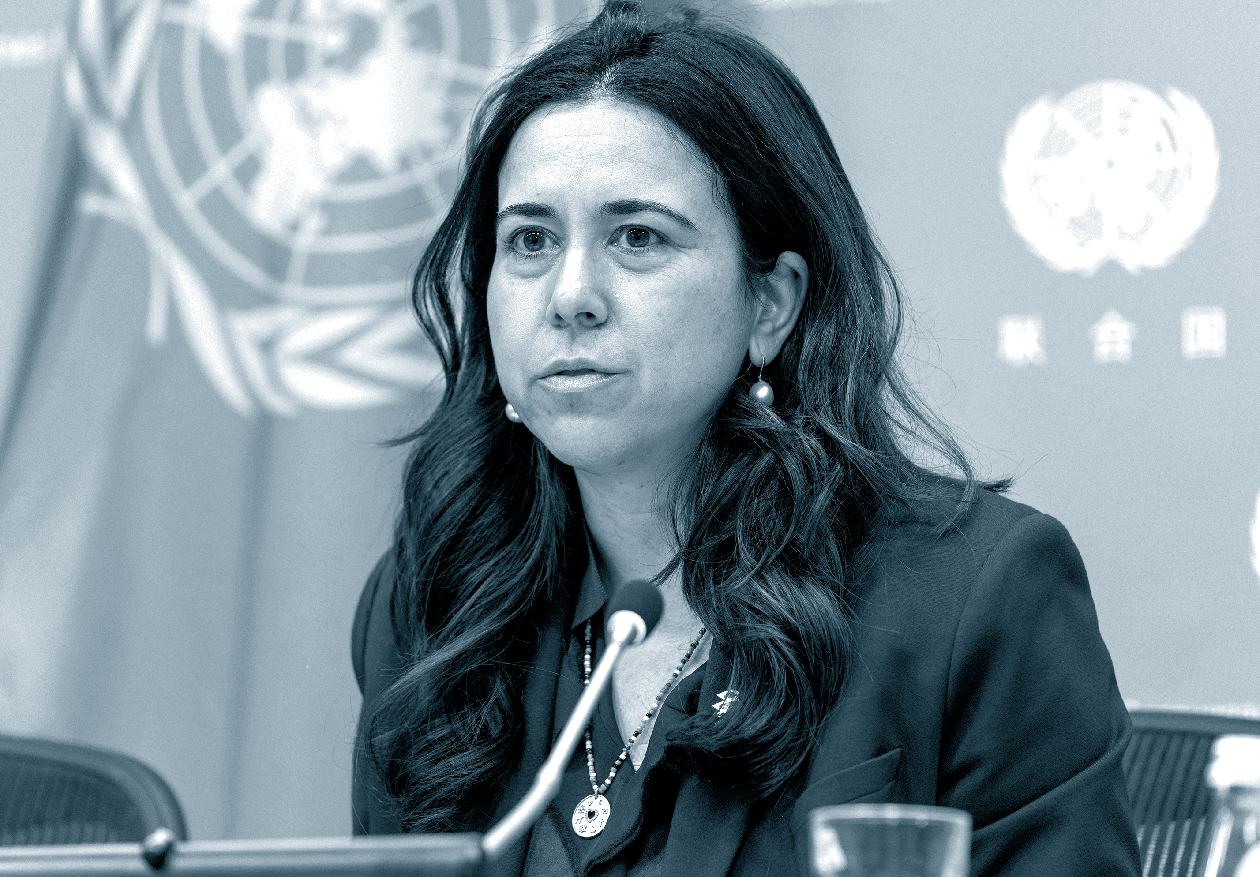
UAE Ambassador and permanent representative to the United Nations
A seasoned diplomat, Nusseibeh was recently named as the chair of the United Nations Terrorism Committee. Nusseibeh’s newest appointment follows a long list of key diplomatic positions she has held over the past decade. She serves as the UAE’s Ambassador and has been the Permanent Representative of the United Nations (UN) since 2013. A 2021 federal decree established her as the Assistant Minister of Foreign Affairs and International Cooperation for Political Affairs. Nusseibeh was instrumental in the launch of the Arab Women Military and Peacekeeping Programme in the UAE in 2019. She has also served as the UAE Co-Special Envoy to Afghanistan and Pakistan and the Head of the International Renewable Energy Agency (IRENA) Campaign Task Force at the Ministry of Foreign Affairs.
Ethiopian industrial behemoth, MIDROC Investment Group, is the brainchild of Al Amoudi. The astute entrepreneur established MIDROC in 1996 to contribute to the revitalisation and development of the Ethiopian economy. In 2022, MIDROC announced an ETB50bn residential development scheme in Ethiopia’s capital, Addis Ababa. The 250,000 square metres mixed-use community development will encompass villas, apartments, a mall, a hotel, a gym, a theatre and a supermarket. Eighty companies operate under MIDROC’s umbrella in diverse sectors such as agriculture, cement, mining and fuel.
53 SPECIAL REPORT
87
88
86
Juma Al Majid
Founder, Juma Al Majid Group
Through Al Khayyat Investments (AKI), Al Khayyat is driving regional investment as a trusted business partner for local and global corporations. Credit is due to the managing director for driving AKI’s digital transformation in recent times. Earlier this year, the company broke ground on its new fulfillment centre, its largest to date, supporting AKI’s next expansion phase in the UAE and the wider region. The 48,000 square metre hub will serve more than 8,000 business customers, and half a million consumers of home delivery services, processing over three million orders per year. AKI’s operations span across eight core business units within four business lines: retail, distribution, contracting and automotive. The conglomerate currently has a footprint in eight countries in the broader Middle East and Africa region, including Saudi Arabia and Egypt.
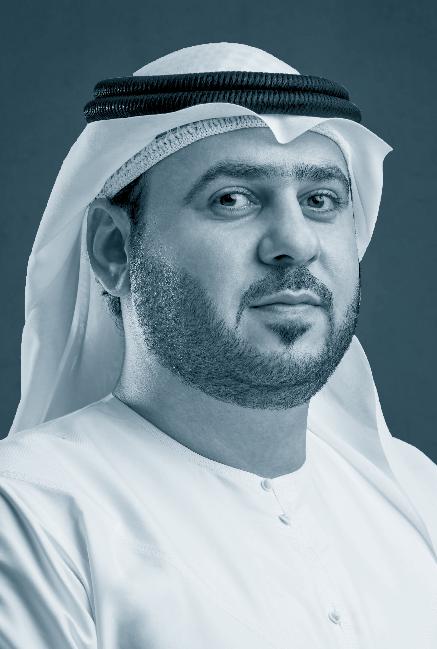
Origin: Iraq/US
Residence: UAE
Sector: Culture and Society
2022 rank: 90
90 91
Huda Beauty, one of the world’s biggest beauty brands, celebrates its 10th anniversary this year. Helmed by Kattan, it’s hard to believe that this billion-dollar global success story started as a humble beauty blog. Huda Beauty now boasts a 140-product strong make-up line, a makeup collection called GloWish, the Wishful skincare range, and the Kayali perfume line. Kattan also launched HB Investments to support startups from around the world and has sponsored Nascar’s first female Arab driver. With more than 52 million followers on Instagram, Kattan is recognised as one of the most powerful influencers on the Internet.

Al Ameri and Mohamed are the UAE’s favourite Emirati couple. With their social media following running into millions, the duo is known for their entertaining and inspirational videos. A 2022 collaboration with social media app TikTok saw their video being projected on Burj Khalifa, the world’s tallest tower. Al Ameri, a Stanford graduate, gave up a corporate career to pursue his passion for producing videos and writing for local newspapers. Salama is also known for her Peacefull skincare range. Together they continue to make videos, sharing their views on everything from marriage and parenting to Emirati culture and entrepreneurship.
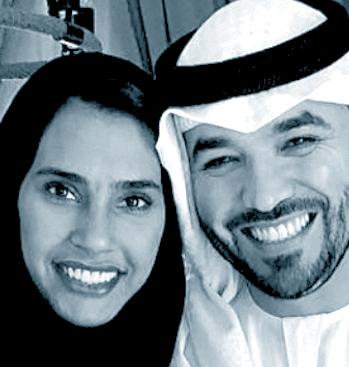
Origin: Bahrain
Residence: Bahrain
Sector: Diversified
2022 rank: 87
Origin: UAE
Residence: UAE
Sector: Culture and Society
2022 rank: 91
Social media influencers
Hailing from one of Bahrain’s most prominent entrepreneurial families, Almoayyed wears many hats. She is the managing director of Y.K. Almoayyed & Sons and the chairperson of Bahrain’s first microfinance bank, Edbaa, set up to support low-income families in the country. In September 2022, the bank extended its financing programmes to include the video game sector to cater to new forms of business in Industry 4.0 and the digital economy.
She is a board member of the Arab International Women’s Forum and the Child Care Home, a member of Bahrain Shura Council, the International Peace Institute Middle East. Almoayyed has consistently shattered the glass ceiling for the kingdom’s women: she was the first woman to be elected to the board of a publicly traded company in Bahrain (Bahrain Maritime and Mercantile International) and the board of the Bahrain Chamber of Commerce and Industry. She was a founding member of the Bahrain Businesswomen’s Society and has held positions in the Migrant Workers Protection Society and Al Muntada Society, a society for promoting liberal thinking, equality and transparency.
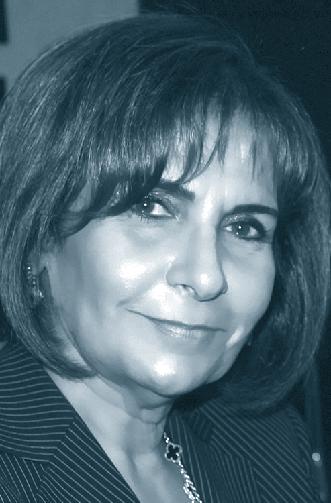
54 SPECIAL REPORT
Huda Kattan Founder, Huda Beauty
Khalid Al Ameri and Salama Mohamed
92
Mona Almoayyed
Managing director, Y.K. Almoayyed & Sons, Chairperson, Edbaa Bank
89 Origin: UAE Residence: UAE Sector: Diversified NEW
Zaid S Al Khayyat Managing director, Al Khayyat Investments
Origin: Egypt Residence: Egypt Sector: Sports
The reigning queen of the Women’s PSA World Squash Rankings, 25-year-old Gohar is the latest squash champion to emerge from Egypt. Introduced to the sport by her dad, the athlete became world number one for the first time in 2020, just as she completed her construction engineering degree. In the 2021/2022 season, Gohar won eight out of 12 finals, cementing her position in the sport. Gohar has been crowned junior world champion twice and won her first tour title at the Prague Open in 2013.
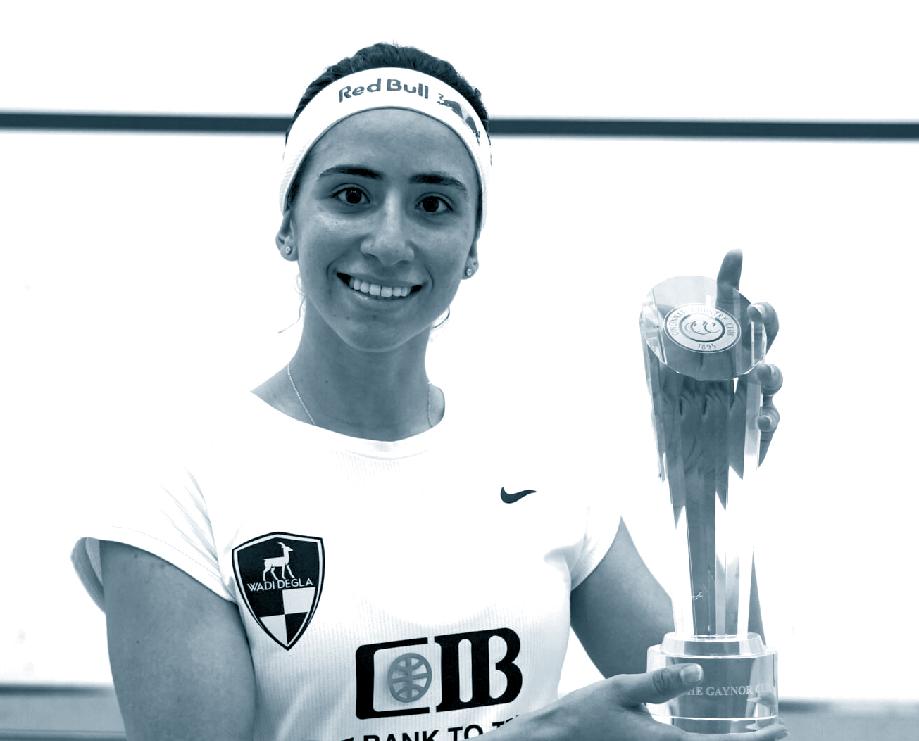
Origin: Morocco
Residence: Morocco
Sector: Finance
2022 rank: 94
Chairperson and CEO, Moroccan Capital Market Authority
In 2022, Hayat, who is the chairperson and CEO of the Moroccan Capital Market Authority (AMMC), was re-elected as chair of the Africa and Middle East Regional Committee (AMERC) for a second consecutive term. Hayat, a veteran in finance, brings years of experience and knowledge to the position. At the helm of AMMC since 2016, Hayat is a founding member and president of Club des Femmes Administrateurs d’Entreprises, a non-profit that promotes good governance and gender diversity on the boards of companies. She is a founding member and president of Club des Femmes Administrateurs d’Entreprises, a non-profit that promotes good governance and gender diversity on the boards of companies.
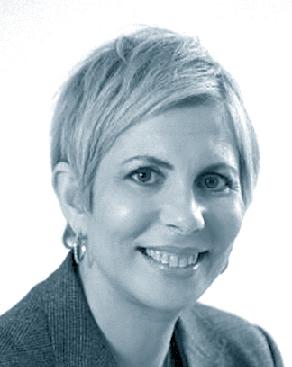
Origin: Egypt
Residence: Egypt
Sector: Culture and Society
2022 rank: 100
Aside from winning seven World Music Awards and having a Guinness World Record to his name, Egyptian music superstar Diab is also the first artist from the MENA region to have won YouTube’s Golden Play Button, an award that recognises accounts with over a million subscribers. In fact, he is also the first Arab artist to cross one billion plays on the audio-streaming platform Anghami, becoming the most-streamed Arab artist in Anghami’s history. The collaboration with Diab pushed Anghami’s revenues by 29 per cent in August 2022, reaching $21.1m, while its active user count jumped by 46 per cent to 19.5 million. Diab has also partnered with UAE-based property developer Emaar to launch his first-ever signature luxury hotel, Locanda.
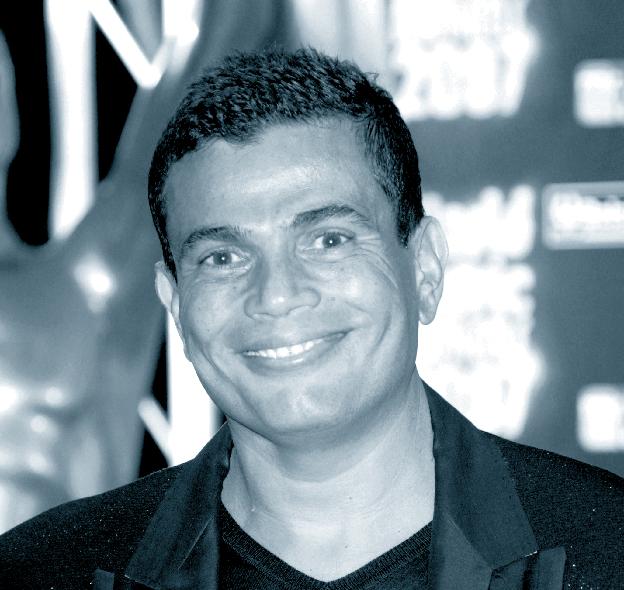
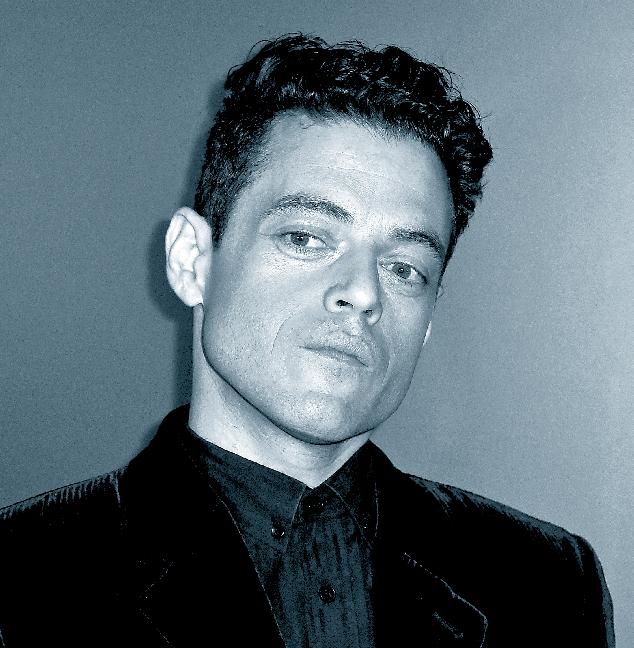
Origin: Egypt/US Residence: US
Sector: Culture and Society
2022 rank: 98
It’s a busy time for Oscar-winning actor Malek. The Egyptian American actor will portray silent film star, Buster Keaton, in an upcoming Warner Bros. series. He will also be seen in The Amateur, a new thriller in which Malek stars and serves as executive producer. Finally, in July, Malek will be seen on screen in the film Oppenheimer alongside Robert Downey Jr. Amidst all these projects, Rami Malek’s tie-up with Cartier sees him feature in the luxury brand’s latest Tank Française campaign with French screen legend, Catherine Deneuve.
55 SPECIAL REPORT
Nezha Hayat
95 96 94 93
Amr Diab Singer
Nouran Gohar Squash player
NEW
Rami Malek Actor
Photo: courtesy: PSA
Reema Juffali Racing driver 99 97
Origin: Morocco
Residence: Morocco
Sector: Retail/Real Estate
2022 rank: 97
Salwa Idrissi Akhannouch Founder and CEO, Aksal Group
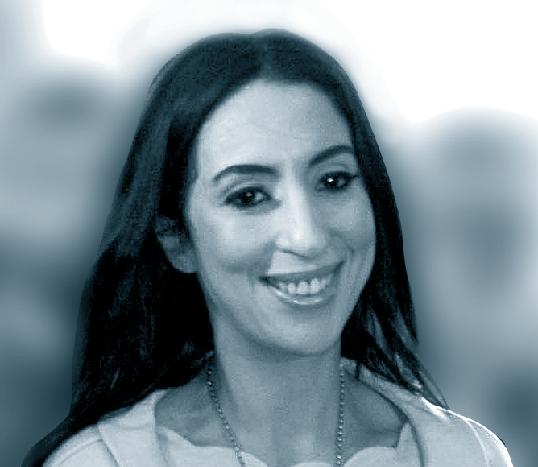
When luxury brand Bottega Veneta opens its first store in Morocco later this year, it will be another feather in the Aksal group’s cap. Steered by sagacious Akhannouch, Aksal has brought luxury fashion to Morocco as the sole franchisee for brands like Emporio Armani, Fendi, Gucci, Oysho, Ralph Lauren, Zara, Banana Republic, Massimo Dutti, Pull & Bear, Bershka and Gap since 2004. Under Akhannouch’s able guidance, Aksal has more than 30 business a liates, 45 brands, a foundation, an academy, and several malls with over 34,000 square metres of retail surface. The group also has a 50 per cent stake in Morocco Mall, Africa’s second largest mall.
Origin: Saudi Arabia
Residence: Saudi Arabia
Sector: Sports
Juffali, born on January 18, 1992 in Jeddah, is a professional racing driver and the founder of Theeba Motorsport. From a young age, Juffali developed a keen interest in cars and began her career with appearances in the TRD 86 Cup and MRF Challenge in 2018, before switching to the UK to contest the F4 British Championship in 2019. She previously joined Douglas Motorsport for the 2021 GB3 Championship. Following this, Ju ali founded Theeba Motorsport, and the team achieved victory on debut in the 2022 International GT Open series, making Ju ali the first Saudi woman to win an international race. Ju ali has established herself as a role model to female athletes in Saudi Arabia and female racing drivers across the world.
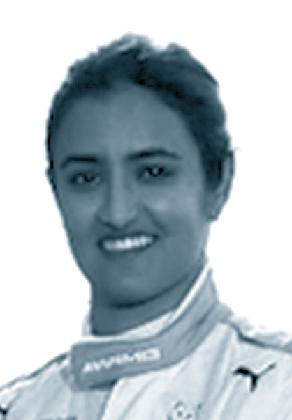
Origin: UAE
Residence: UAE
Sector: Culture and Society
Raed Barqawi
Executive editor-in-chief, Al Khaleej
At the helm of Emirati newspaper Al Khaleej, Barqawi has observed and chronicled the meteoric rise of the UAE for over three decades. His ring-side view of these developments encouraged him to author the bestselling book Dare to Dream: How Mohammed bin Rashid Made His Dreams Come True
The Arabic edition of the book was launched at the prestigious Emirates Airline Festival of Literature in the presence of HH Sheikh Ahmed bin Saeed Al Maktoum, chairman and chief executive of Emirates Airline and Group. The English edition was launched at the Abu Dhabi Book Fair 2022. The book was also well received at the Cairo International Book Fair.
Since 1985, he has covered hundreds of local, regional and international events and conferences and has interviewed numerous o cials and CEOs. He has spoken at several major events and appeared in various television shows. Barqawi has also been a board member of the Arab Journalism Award for over 15 years. He has received numerous awards and accolades during his career.
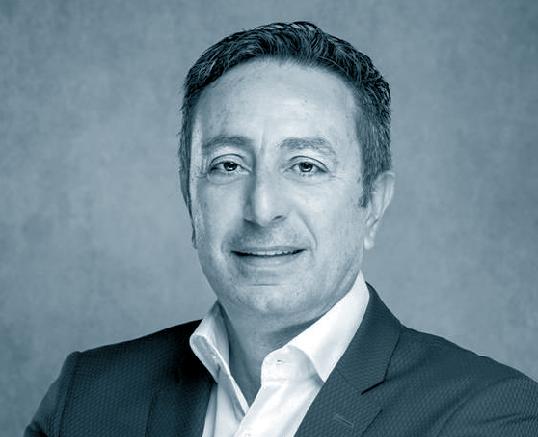
Origin: UAE Residence: UAE Sector: Sports
Nayla Al Baloushi
Mountaineer NEW
In May 2022, Al Baloushi made the UAE proud when she became the first Emirati woman to summit Mount Everest. The achievement is even more remarkable, considering that Al Baloushi decided to scale the mountain just three months prior and did not undergo any special training for this feat. However, the Emirati mountaineer is familiar with mountain climbing and has climbed Greater Ararat in Turkey/ Armenia, Mount Cameron, and Mount Hoverla in Ukraine. Al Baloushi is married to Saeed Al Memari, the first Emirati man to reach Mount Everest’s peak in 2011. Al Baloushi was motivated by her husband to take on the feat.
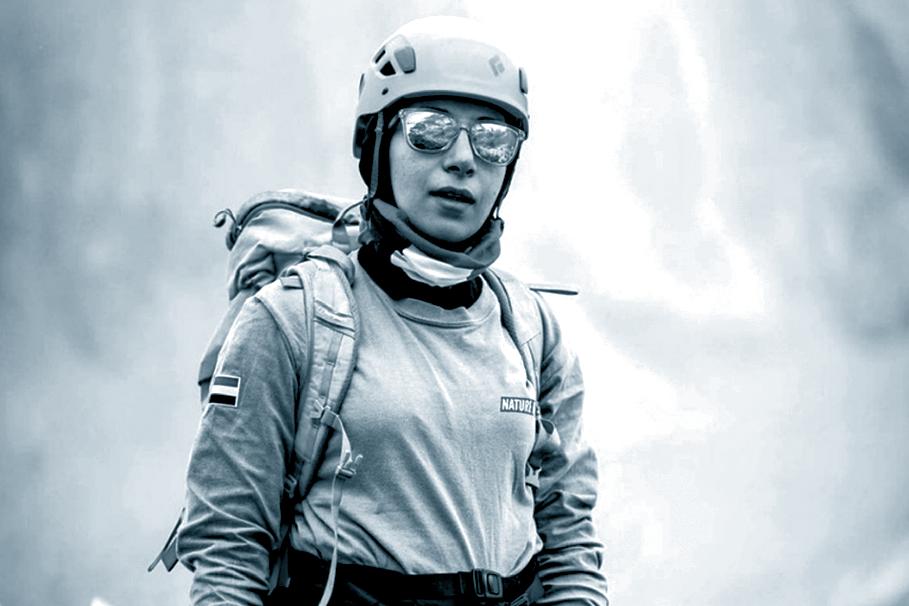
56 SPECIAL REPORT
98
NEW
100
NEW
Gulf Business Arab Power List 2023
01. Yasir Al-Rumayyan (Aramco/PIF) 1
02. Dr Sultan Al Jaber (ADNOC) 2
03. HH Sheikh Ahmed bin Saeed Al Maktoum (Emirates Group/ Emirates NBD) 3
04. Saad Sherida Al-Kaabi (QatarEnergy/ Industries Qatar) 4
05. Khaldoon Khalifa Al Mubarak (Mubadala Investment Company) 5
06. Amin Nasser (Aramco) 6
07. Carlos Slim Helú (America Movil) 7
08. Mohamed Alabbar (Emaar/noon. com) 8
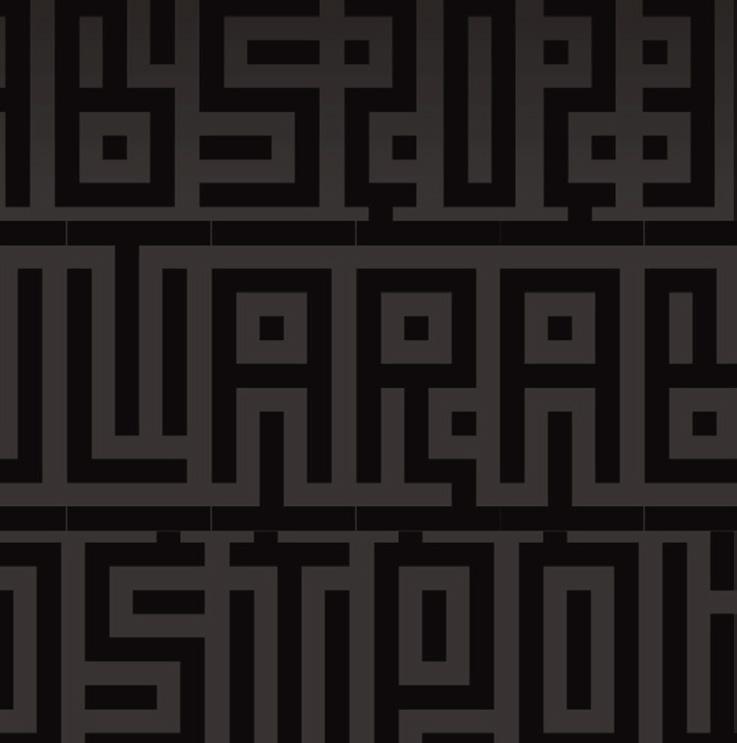


09. HRH Prince Alwaleed bin Talal bin Abdulaziz Al Saud (Kingdom Holding Company) 10
10. Mohamed Al Hammadi (Emirates Nuclear Energy Corporation) 11
11. Sultan Ahmed bin Sulayem (DP World/ Virgin Hyperloop) 12
12. Sarah bint Yousif Al Amiri (UAE Space Agency) 9
13. Mansoor Ebrahim Al-Mahmoud (Qatar Investment Authority) 16
14. Abdul Aziz Al Ghurair (Mashreq) 17
15. Abdulla Mubarak Al-Khalifa (Qatar National Bank) 18
16. Hana Al Rostamani (First Abu Dhabi Bank) 19
17. Mohammed Ibrahim Al Shaibani (Investment Corporation of Dubai) 20
18. Salem Humaid AlMarri (Mohammed Bin Rashid Space Centre) 31
19. Lubna Suliman Olayan (Saudi British Bank) 21
20. Essa Kazim (DIFC) 23
21. Mohamed Khalifa Al Mubarak (DCT Abu Dhabi/ Aldar Properties) 24
22. Fahd Hamidaddin (Saudi Tourism Authority) 25
23. HH Prince Naif bin Sultan bin Mohammed bin Saud Al Kabeer (Almarai) 26
24. Sarah Al Suhaimi (Saudi Tadawul Group) 22
25. Mohammad Saud Al-Osaimi (Boursa Kuwait) 27
26. Saeed bin Mohammed Al Ghamdi (Saudi National Bank) 28
27. Dr Raja Easa Al Gurg (Easa Saleh Al Gurg Group) 29
28. Reem Al Hashimy (Expo City Dubai Authority) 15
29. Mohamed Salah (Liverpool FC) 30
30. Abdulrahman Saleh Al-Fageeh (SABIC) NEW
31. Sultan AlNeyadi (UAE Astronaut) NEW
2023 RANKING | NAME (COMPANY) | 2022 RANKING

32. Helal Al Marri (Dubai’s Department of Economy and Tourism) 35
33. Sheikha Al Mayassa bint Hamad bin Khalifa Al Thani (Qatar Museums) 33
34. Elie Habib and Eddy Maroun (Anghami) 32
35. Ayman Mohamed Alsayari (SAMA) NEW
36. Mohammed Abdul Latif Jameel (Abdul Latif Jameel) 36
37. Khalaf Al Habtoor (Al Habtoor Group) 37
38. Nayla Hayek (Swatch Group/ Harry Winston) 39
39. Sheikh Sulaiman bin Abdulaziz Al Rajhi (Al Rajhi Bank) 40
40. Mohamed Ali Al Shorafa Al Hammadi (Abu Dhabi Department of Economic Development) 41
41. Olayan Mohammed Alwetaid (stc Group) 42
42. Mohammed Alshaya (Alshaya Group) 38
43. Bader Nasser Al-Kharafi (Zain Group) 44

44. Mohamed Mansour (Mansour Group) 43
45. Faisal Al Bannai (EDGE Group) 46
46. Hatem Dowidar (e& Group) 47
47. Mohamed Juma Al Shamisi (Abu Dhabi Ports) 54

48. Karim Awad (EFG Hermes Holding) 49
49. Mohammed bin Mahfoodh Alardhi (InvestCorp) 50
50. Khalid Al Rumaihi (Mumtalakat) 48
51. Nassef Sawiris (OCI/ Aston Villa FC) 51
52. Akbar Al Baker (Qatar Airways) 55
53. Naguib Sawiris (Orascom Investment Holding) 53
54. Adel Abdulla Ali (Air Arabia) 57
55. Jassim Alseddiqi (Shuaa Capital) 52
56. Aziz Aluthman Fakhroo (Ooredoo) 58
57. Mohammad A Baker (GMG) 59
58. Mohammad Ali bin Rashed Lootah (Dubai Chambers) NEW
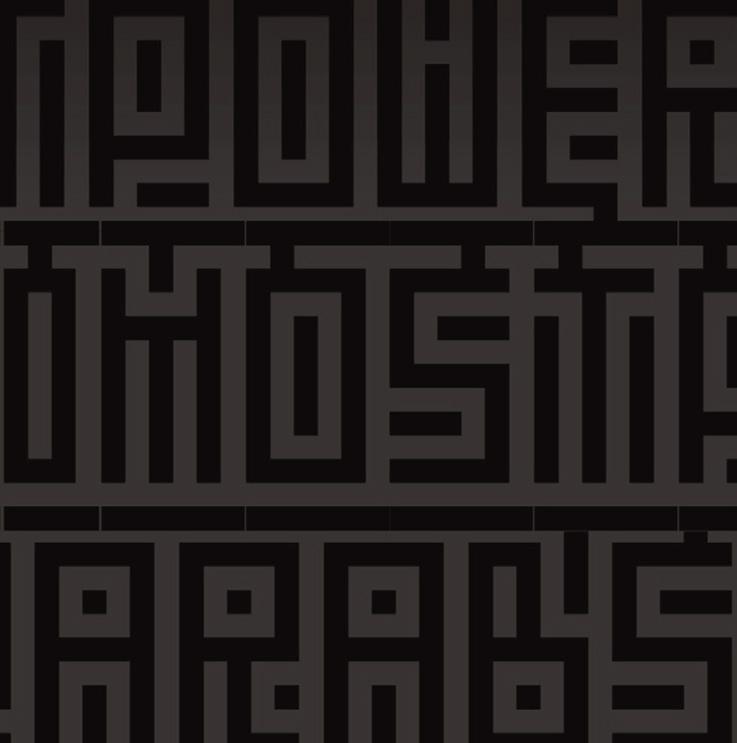
59. Ala’a Eraiqat (ADCB) 63
60 Issam Kazim (Dubai Tourism) 72
61. Kutayba Yusuf Alghanim (Alghanim Industries) 60
62. Elie Saab (Fashion designer) 61
63. Abdulla Jassem Kalban (Emirates Global Aluminium) 64
64. Mona Ataya (Mumzworld) 62
65. Ghaith Al Ghaith (flydubai) 69


66. Wadha Ahmed Al-Khateeb

(Kuwait National Petroleum Company) NEW
67. Hesham Al Qassim (wasl Asset Management) 65

68. Sheikh Abdullah bin Bayyah (UAE Fatwa Council) 66
69. Badr Jafar (Crescent Enterprises) 67
70. Mishal Kanoo (Kanoo Group) 71
71. Amal Suhail Bahwan (Suhail Bahwan Group) NEW
72. Tarek Sultan (Agility) 73
73. Khaled Mohammed Balama 76 (Central Bank of the UAE)
74. Fadi Ghandour (Wamda/Aramex) 75
75. Mazin Rashid Lamki (Energy Development Oman) 74
76. DJ Khaled (Musician) 77
77. Mohammad Abu Ghazaleh (Fresh Del Monte) 79
78. Dr Amina Al Rostamani (AW Rostamani Group) 78

79. Shaikha Al Bahar (National Bank of Kuwait) 80
80. Ronaldo Mouchawar (Souq.com/ Amazon MENA) 81
81. Hussain Sajwani (Damac Properties) 82
82. Rayyanah Barnawi (KSA Astronaut) NEW
83. Ons Jabeur (Tennis player) 85
84. Munib Al Masri (Edgo Group) 84
85. Othman Benjelloun (Bank of Africa) 88
86. Juma Al Majid (Juma Al Majid Group) 86
87. Lana Nusseibeh (Diplomat) 93
88. Mohammed Al Amoudi (MIDROC) 89

89. Zaid S Al Khayyat (Al Khayyat Investments) NEW
90. Huda Kattan (Huda Beauty) 90
91. Khalid Al Ameri and Salama Mohamed (Social media influencers) 91
92. Mona Almoayyed (Y.K. Almoayyed & Sons/ Edbaa Bank) 92
93. Nouran Gohar (Squash player) NEW
94. Nezha Hayat (Moroccan Capital Market Authority) 94

95. Amr Diab (Singer) 100
96. Rami Malek (Actor) 98
97. Salwa Idrissi Akhannouch (Aksal Group) 97
98. Raed Barqawi (Al Khaleej) NEW
99. Reema Ju ali (Racing driver) NEW
100. Nayla Al Baloushi (Mountaineer) NEW
SAVE THE DATE
DATE: Monday, 1st May 2023

TIME: 7:30 PM
DRESS CODE: Business Attire
RSVP BY BOOKING YOUR TABLE
CONTACT: chaitali.khimji@motivate.ae | murali@motivate.ae
AED 8,000 PER TABLE OF 10 OR AED 1,200 PER SEAT (exclusive of VAT)
btme.ae
Presented by Vote processing partner Sponsor
C M Y CM MY CY CMY K
#BTMEAwards
Lifestyle 23
Global ambitions, local appeal
We shine the spotlight on fast-growing lifestyle and hospitality group Ennismore and its focus on curating innovative experiences in the communities it serves p.63
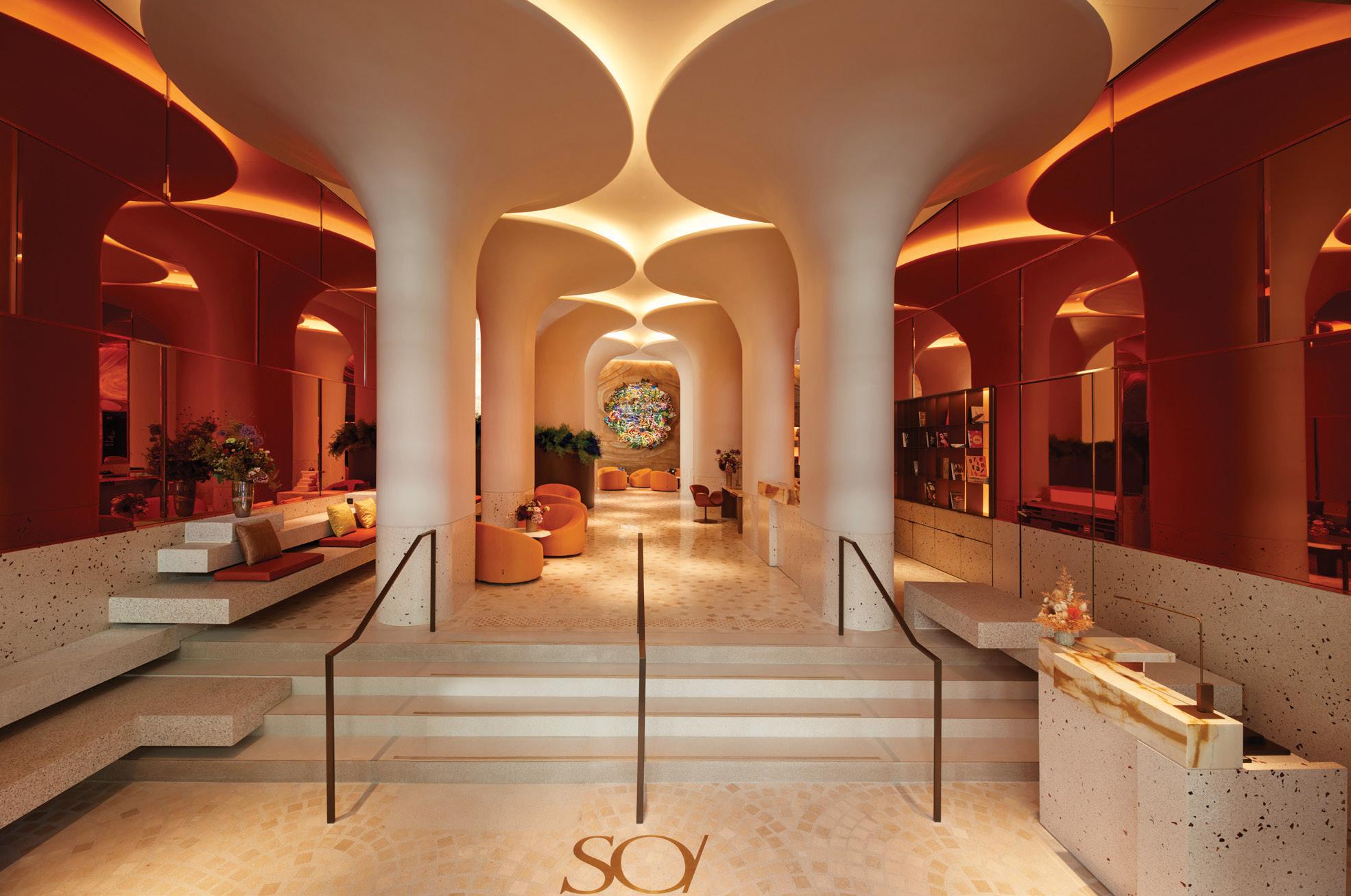
Audemars Piguet Royal Oak ‘Jumbo’ (extra-thin) edition

Audemars Piguet’s latest edition of the model comes with a new grained dial.
The limited edition 39mm timepiece comes in a white gold case and features the Calibre 7121, the latest ultra-thin movement that was introduced in January 2022 for the 50th anniversary of the Royal Oak.
gulfbusiness.com April 2023 59
APR
“Looking to the future, the regional entertainment industry is expected to continue its growth trajectory, driven by increased investment in local and regional content production, and by the rising popularity of streaming platforms”
Amanda Turnbull, chief executive officer and co-founder at Rise Studios
Where global meets local
WE LOOK AT THE CHANGING FACE OF THE ENTERTAINMENT INDUSTRY IN THE MENA REGION AND WHAT WE CAN EXPECT THIS YEAR


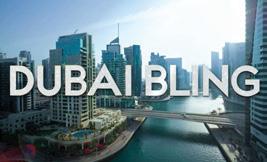
The Middle East media and entertainment industry has seen progressive change over the past few years, with the sector becoming a thriving contributor to the region’s economy and manifesting a diverse and distinctive creative voice. The Covid-19 pandemic was a turning point for the broadcasting and entertainment sector. Over-the-top digital media filled the frame, boosting viewer demand for quality content with local nuances – a demand that is likely to accelerate over the long term.

Lifestyle / Entertainment gulfbusiness.com 60 April 2023
The shi ting landscape will continue to create exciting opportunities for established and emerging content creators alike in 2023. In media and entertainment, we can point to cycles of evolution, o ten driven by changing consumer preferences. According to PWC’s MENA Entertainment & Media 2020-2024 Outlook report, the pandemic has accelerated a shi t in consumer behaviour, with a higher demand for digital and localised content, requiring companies to review their business models to meet the ever-developing demand.
As the Middle East entertainment industry continues its head-spinning progression, here are five trends that will shape this year.
01.
LOCAL CONTENT IS KING
The region has seen a rise in local and regional content production, with more TV channels and platforms investing in original content, both created in the region and inspired by stories from the region. The increased demand for local content has also created new opportunities for talent, both in front of and behind the camera.
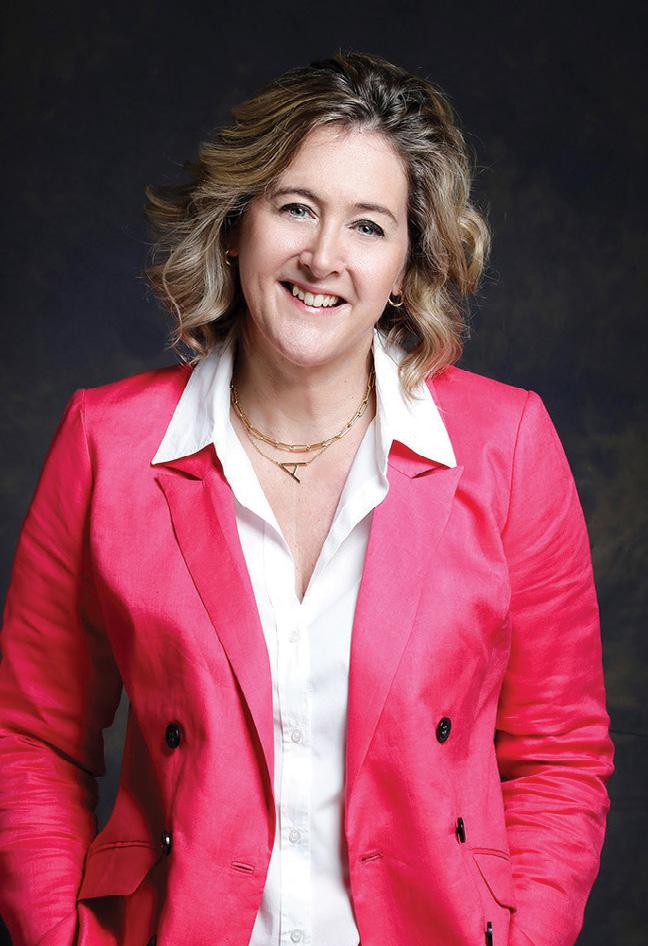
In parallel with the growth of local TV content, the new wave of streaming has also taken the region by storm. The continued focus of global platforms such as Netflix on the MENA region, the launch of Amazon Prime Video and Disney+, the growth of local leader Shahid, the acquisition of Starzplay by Etisalat, the launch of beIN TOD, and others have changed the way people consume entertainment, o ering a more
personalised and on-demand experience. These platforms are investing heavily in original content and are looking to the MENA region to acquire and retain new subscribers via diverse local stories added to their o erings. According to a report by Vynd, the number of Arabic scripted series on OTT services grew by 20 per cent between Q3 and Q4 2022, across streamers such as Shahid, Netflix, Jawwy, OSN+, Tod and Starzplay.
In Q4 2022, local reality show Dubai Bling (produced by Di erent Productions) witnessed a stark increase in demand, overtaking reality shows such as Love is Blind in the region and clearly demonstrating the power of localising content which resonates with regional audiences.
The show also took the world by storm reaching the second highest streamed non-English non-scripted show on Netflix globally in its first week and being on the top 10 for four weeks in more than 45 countries. A great example of content of and for the region which also achieved global cut through.
The demand for localised content also applies to localised competition reality formats such as The Voice, where the The Voice Ahla Sawt sustained higher demand and viewership on average in the region compared to The Voice (US).
02.
INCREASING DEMAND FOR DIGITAL CONTENT
Changes in consumer behaviour have led to a greater emphasis on digital and online experiences. This has had a profound impact on the entertainment industry in the MENA region, leading to a greater focus on expanding digital and online content and experiences.
Traditional, linear media channels are at the cusp of change. There is a massive potential for them to reach a wider audience by creating bespoke content on digital platforms to market their linear and digital o ering, whether it shoulders content created solely for digital platforms or mere clips of pre-existing content. These digital platforms have direct access to a wider audience and reach and presents a substantial commercial opportunity. For example, Netflix posting clips of highly popular shows on social pages such as Instagram and TikTok helps to boost their content to a wider audience and encourage new viewers to stream the content.
03.
CONTINUING PRODUCTION COST INFLATION
With the demand for high-quality and original content increasing, the cost of producing it also increases. This is due to a variety of factors including the cost of talent both behind and in front of the camera. This cost inflation has put pressure on both TV networks and streaming platforms, who are seeking new ways to reduce costs while producing high-quality content. One way that the industry has responded to this challenge is by moving productions to cost-e cient locations which have a deep talent bench such as Egypt, Turkey, Jordan and Lebanon. On the other hand we have seen a growing number of productions
Lifestyle / Entertainment gulfbusiness.com April 2023 61
“With the demand for high-quality and original content increasing, the cost of producing it also increases. This is due to a variety of factors including the cost of talent both behind and in front of the camera”
Amanda Turnbull, chief executive o cer and co-founder at Rise Studios
THE NUMBER OF ARABIC SCRIPTED SERIES ON OTT SERVICES
ACROSS STREAMERS SUCH AS SHAHID, NETFLIX, JAWWY, OSN+, TOD, AND STARZPLAY
GREW BY 20% BETWEEN Q3 AND Q4 2022
taking place in both the UAE and Saudi Arabia, which both o er a variety of production-friendly locations, sound stages and post production facilities, as well as generous incentives and rebates for producers and filmmakers.
04.
FLEXIBILITY OF STREAMERS TO ACQUIRE RATHER THAN COMMISSION
Another trend that has emerged in response to production cost inflation is the increasing willingness for streaming platforms to acquire or licence content rather than commission all their output as original productions. While this trend is more prevalent in US and European markets, it is starting to be accepted in MENA. By acquiring content that has already been

produced, streaming platforms can reduce their overheads, and diversify their production risk. The bonus for producers is that they can maintain their IP rather than lose that through the commissioning process. However, this is only feasible for producers with enough working capital to fund a production up front. We believe that this (funding) is one of the key contributions that Rise Studios can make to the MENA production ecosystem right now.
05.
PLATFORM DE-RISKING
Content platforms are de-risking by working with fewer but more trusted partners, forming long-term partnerships with select production studios and talent who deliver on time and on budget. In this way, platforms can minimise production risks, while
ensuring that they deliver quality content. Another approach to de-risking is to run content plans through a series of research and analysis tools ahead of commissioning the shows. Return path audience data plus focus groups and regular use of social media listening tools can highlight areas of audience interest or indicate where there is unmet need.
Looking to the future, the regional entertainment industry is expected to continue its growth trajectory, driven by increased investment in local and regional content production, and by the rising popularity of streaming platforms with forecasts by Dataxis predicting the rise of subscribers and streaming platform revenues in the region to $1.7bn in 2023. The industry has a number of challenges to navigate however, including rising production costs, and will need to continue to adapt and find innovative solutions.
Challenges aside, the industry is poised to meet the increasing demand for highquality, original content, creating new opportunities for the talent and businesses that innovate and adapt to this changing landscape. This poses an opportunity for quality homegrown content to not just resonate with the local audience, but start to travel globally and take its rightful place.
Lifestyle / Entertainment gulfbusiness.com 62 April 2023
“Another trend that has emerged in response to production cost infl ation is the increasing willingness for streaming platforms to acquire or licence content rather than commission all their output as original productions”
DATAXIS PREDICTS THE RISE OF SUBSCRIBERS AND STREAMING PLATFORM REVENUES IN THE REGION TO
$1.7BN IN 2023
Multiple brands, singular focus
GAURAV BHUSHAN, CO-CEO OF ENNISMORE SHARES THE FAST-GROWING LIFESTYLE AND HOSPITALITY COMPANY’S EXPANSION PLANS IN THE REGION AND HOW IT’S FOCUSED ON CURATING UNIQUE EXPERIENCES
BY NEESHA SALIAN
Award-winning lifestyle and hospitality company Ennismore curates and manages eclectic hotel brands, which have distinct personalities and unique offerings across Asia-Pacific, Europe, the Americas and the Middle East.
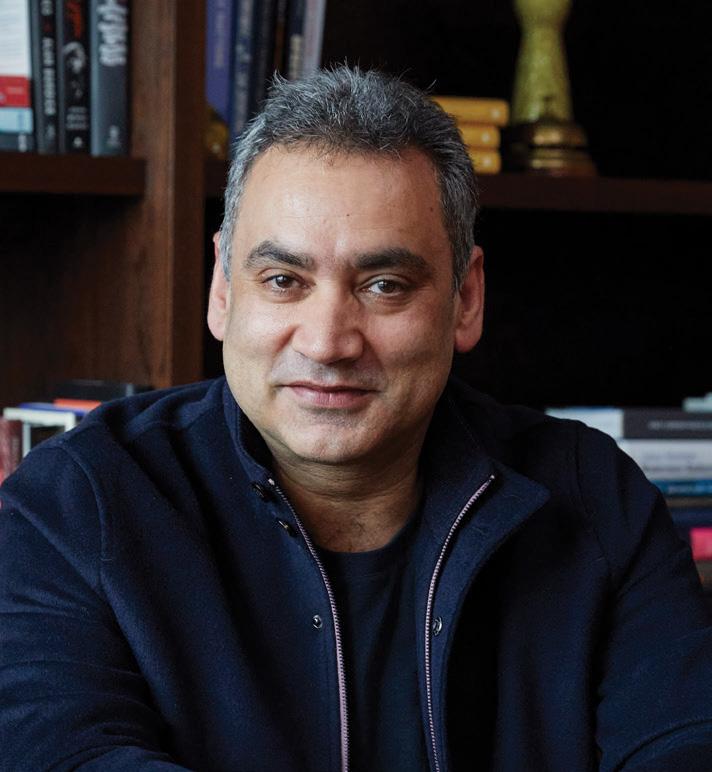
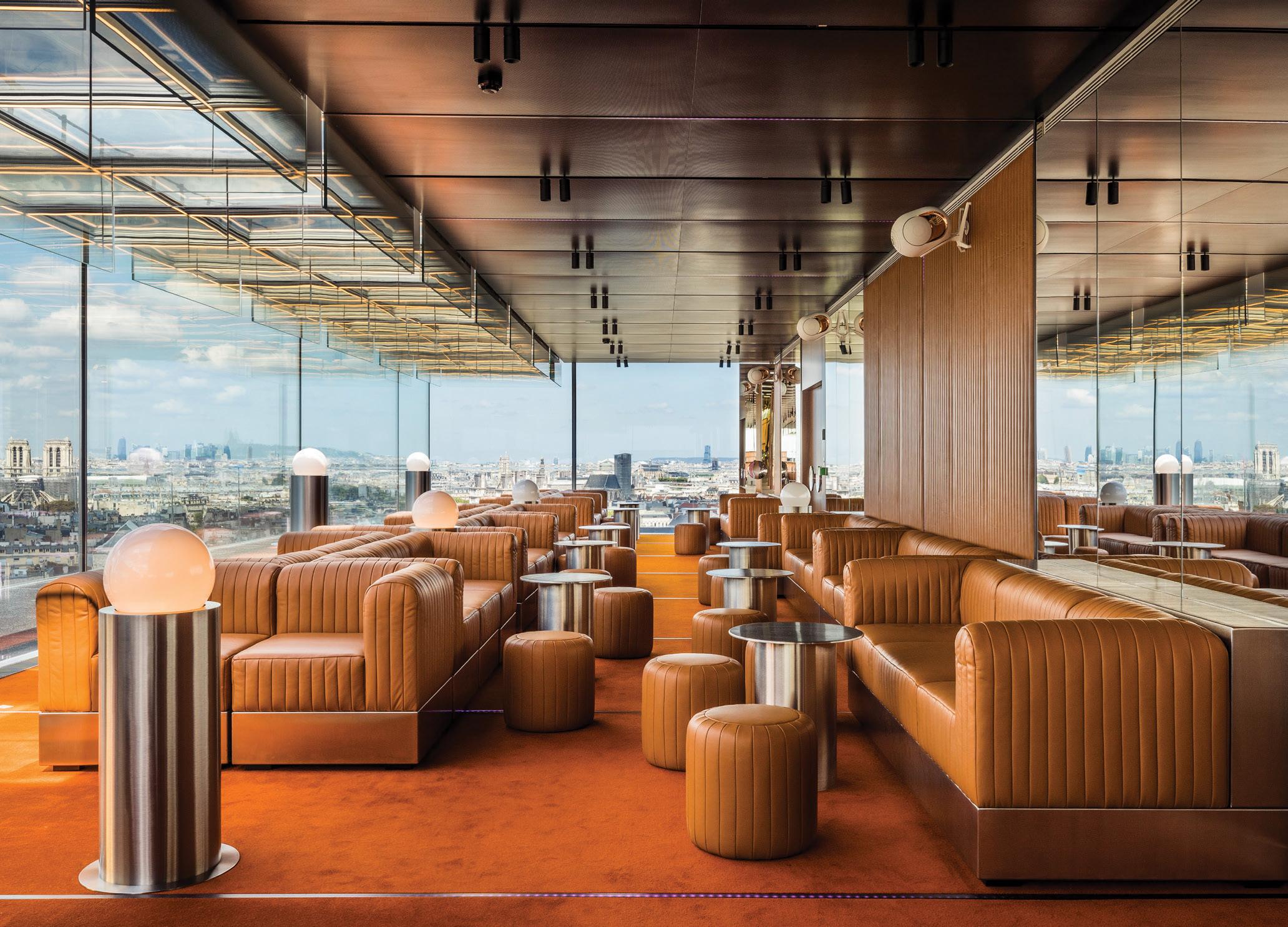
ADVERTISING
The company, which has a JV with Accor, has witnessed rapid growth and expansion under the direction and vision of Sharan
Pasricha, founder and co-CEO, and Gaurav Bhushan, co-CEO.
We recently caught up with Gaurav Bhushan to discuss Ennismore’s footprint in the region and its exciting pipeline of projects.
Tell us in brief about the hotels that are part of Ennismore. Ennismore’s portfolio has 14 brands and more than 100 operating properties and over 160 in the pipeline.
Our brands, which come from across the world, comprise 21c Museum Hotel, 25hours Hotels, Delano, Gleneagles, Hyde, JO&JOE, Mama Shelter, Mondrian, Morgans Originals, SLS, SO/, The Hoxton, TRIBE and Working From.
Lifestyle / Hospitality gulfbusiness.com April 2023 63
SO/ Paris in France
Gaurav Bhushan
As a company that works with multiple brands, what has helped bind this diverse collective of hotels and their founders?
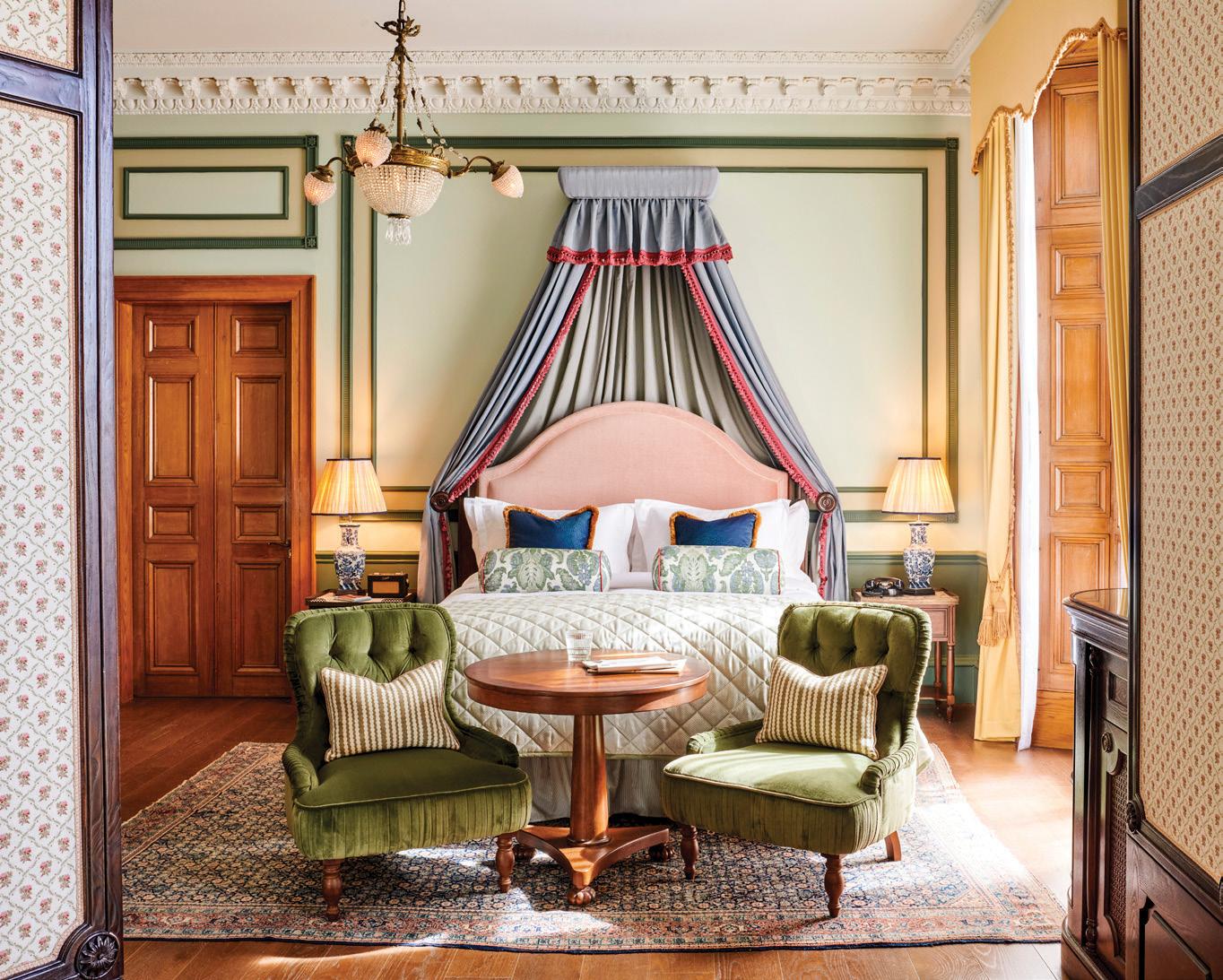
At Ennismore, we’ve spent considerable time and painstaking effort in consolidating our partnerships with the different brands and founders that work with us. We nurture the brands and retain their soul and DNA as custodians should.
The hotel brands are fundamental to our success and their founders are involved in every aspect pertaining to the brand identity and promise. Their inputs go into everything from the interiors of the hotel to the talent we source and the culinary concepts we introduce into the hotel’s ecosystem. It’s a symbiotic relationship and one that is built on trust and respect. I am really proud that these brands have chosen to partner with us for the long term.
THE REGION ACCOUNTS FOR 10 PER CENT OF OUR BUSINESS FOOTPRINT,
BUT
Tell us about Sharan and why your partnership with him works so well. Sharan and I have known each other for a long time. Our partnership is strengthened by the common goals and values we share. Having said that, we are also very different.
We bring different skill sets to the table. Sharan is a very talented entrepreneur. He focuses on the product, brand, and digital side of the business while I drive operations and expansion, among other areas.
We make key decisions together based on our diverse skills and experience, which is always good for business and innovation.
How did the company perform in 2022?
It was a great year – both in terms of operations as well as growth. In fact, it has exceeded expectations since the JV with Accor. Most importantly, we integrated six different businesses into one platform, and we did this during the pandemic. We got brands from all over the world together and set up a great multicultural team. Today, the company represents a strong entrepreneurial culture. We are also agile, driven to innovate and take risks to continue evolving.
Why is the Middle East, particularly the UAE, a key market for Ennismore?
The Middle East is one of our top priority markets and we have significant assets
in the region. We opened the Mondrian in Doha, Qatar a few years back and have a few properties in Dubai, including 25hours Hotels, SLS Dubai and Hyde Hotel. We also have projects coming up across Saudi Arabia and Egypt.
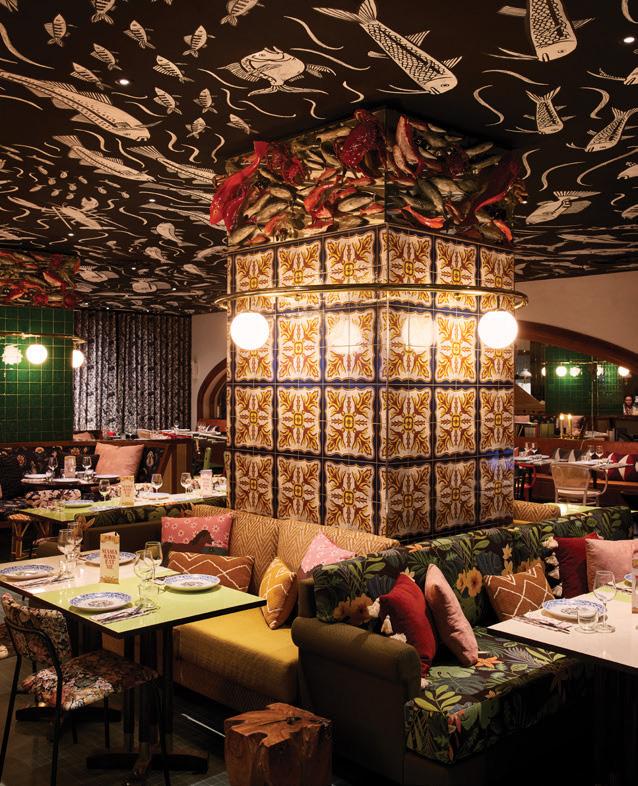
The region accounts for 10 per cent of our business footprint, but the way we see the market growing, we can expect to see its share rise to 25 per cent.
When it comes to the UAE, our brand resonates with the young community here – people who like to go out, have fun, travel, and explore new experiences. We see ourselves as a lifestyle and entertainment hub and an extension of the community where people like to hang out while enjoying the ambience of the hotel and our unique hospitality and F&B experiences.
THE WAY WE SEE THE MARKET GROWING, WE CAN EXPECT TO SEE ITS SHARE RISE TO 25 PER CENT
Lifestyle / Hospitality gulfbusiness.com 64 April 2023
“We see ourselves as a lifestyle and entertainment hub and an extension of the community where people like to hang out while enjoying the ambience of the hotel and our unique hospitality and F&B experiences”
Gleneagles Townhouse, Edinburgh Scotland
Mama Shelter Lisbon, Portugal
We have strong partnerships with local companies across the entertainment and F&B sectors and they add local context to our platform and business, which is key to our brand philosophy.
You signed an agreement with NEOM Hotel Development becoming an inaugural hotel partner in October 2022. What does the partnership involve?
The tie-up with NEOM Hotel Development will see two of Ennismore’s iconic brands – 25hours Hotels and Morgans Originals – open properties in Trojena, NEOM’s mountain tourism destination.
These distinct lifestyle brands exemplify creativity, offering tasteful, aesthetic spaces and authentic culinary experiences to guests.
We are excited for the brands to open in Trojena, a unique setting that will attract both local and international visitors.
In January, you announced the company’s first SO/ development in Saudi Arabia, SO/ Jeddah Tahlia. Tell us about it.
Each SO/ property draws its inspiration from the world’s most influential fashion icons, brands and houses, as does SO/ Hotel & Residence, Jeddah Tahlia.
Kristina Zanic, one of the region’s leading designers, will design the interiors. The hotel, aimed at both business and leisure guests, is centrally located between Jeddah’s Business District, the Corniche and Tahlia Street.
The property includes guest rooms, suites, serviced apartments, and five new restaurants offering exclusive dining experiences.
This project is the first of its kind in Jeddah that marries design, fashion and innovative culinary experiences.
Ennismore unveiled its food and beverage concept studio in Dubai in October last year. Tell us how it complements your business. Our portfolio of 100 lifestyle hotels includes 190 food and beverage offerings, which generate around 50 per cent of our total revenue, making Carte Blanched an important facet of our business.
Carte Blanched is one of Ennismore’s four specialised in-house studios. It features a specialist in-house team, which includes operators, chefs and mixologists, who create customised, authentic and “culturally relevant” F&B concepts for our lifestyle brands.
The studio creates new and develops existing F&B brands for hotel owners,
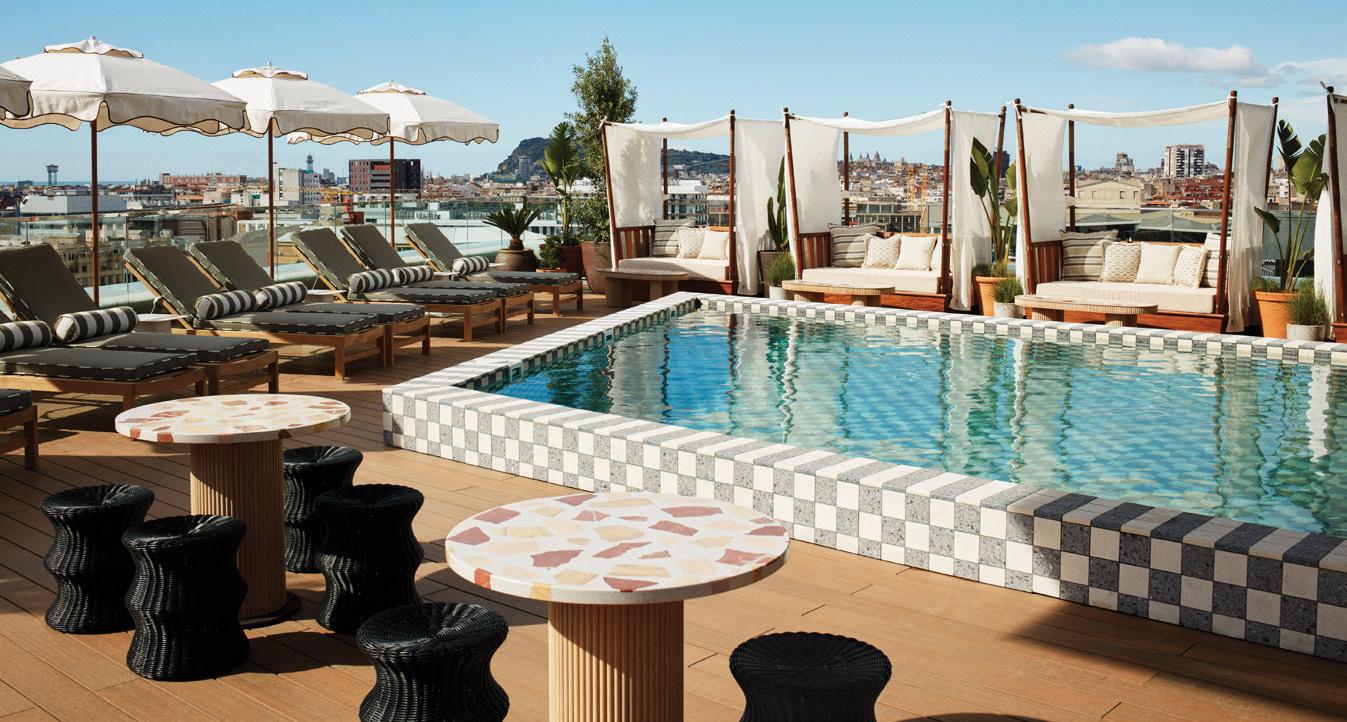
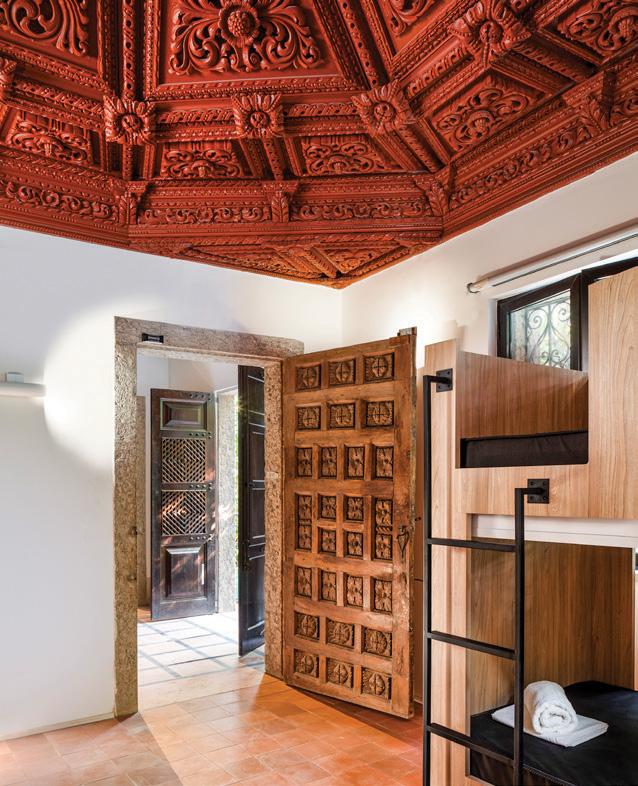
overseeing everything from conception through to opening and beyond.
Carte Blanched has over 40 brands, and since 2021, has opened 17 new outlets in Europe and the Middle East. These include Tandoor Tina at 25hours Dubai and Fi’Lia at SLS Dubai.
Internationally, its portfolio includes Four Corners at The Hoxton, Barcelona, Seabird at The Hoxton, Southwark, and Bibo at Mondrian Shoreditch.
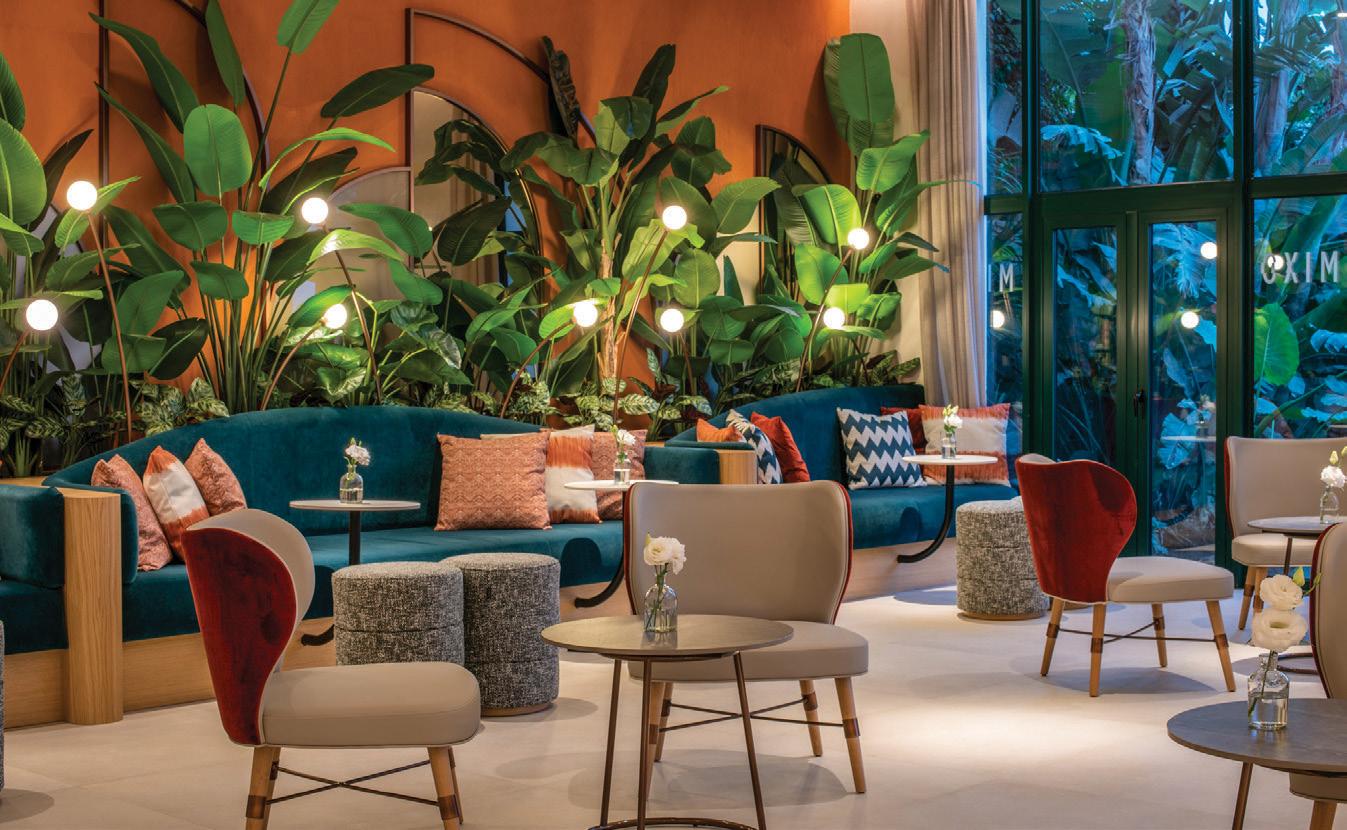
Finally, can you share Ennismore’s plans for expansion in the region?
The company’s expansion in the Middle East continues to be robust, adding to its existing five hotels and branded residences, including 25hours Dubai, SLS Dubai and Hyde Dubai – a pipeline of over 20 properties featuring Mama Shelter Dubai, SLS Red Sea and 25hours Trojena.
gulfbusiness.com April 2023 65
The Hoxton, Poblenou, Spain
JO&JOE Rio de Janeiro
SO/
Sotogrande, Spain
RECOGNISING EXCELLENCE

DUBAI-BASED REAL ESTATE FIRM BANKE INTERNATIONAL IS NURTURING A CULTURE WHERE EMPLOYEES CAN MAXIMISE THEIR POTENTIAL AND FEEL BOTH FULFILLED AND MOTIVATED. ITS RECENT EMPLOYEE AWARDS DEMONSTRATES THIS PHILOSOPHY
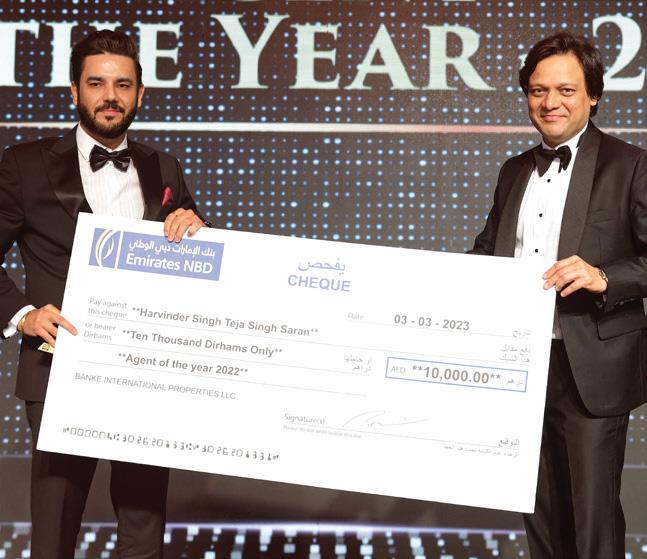
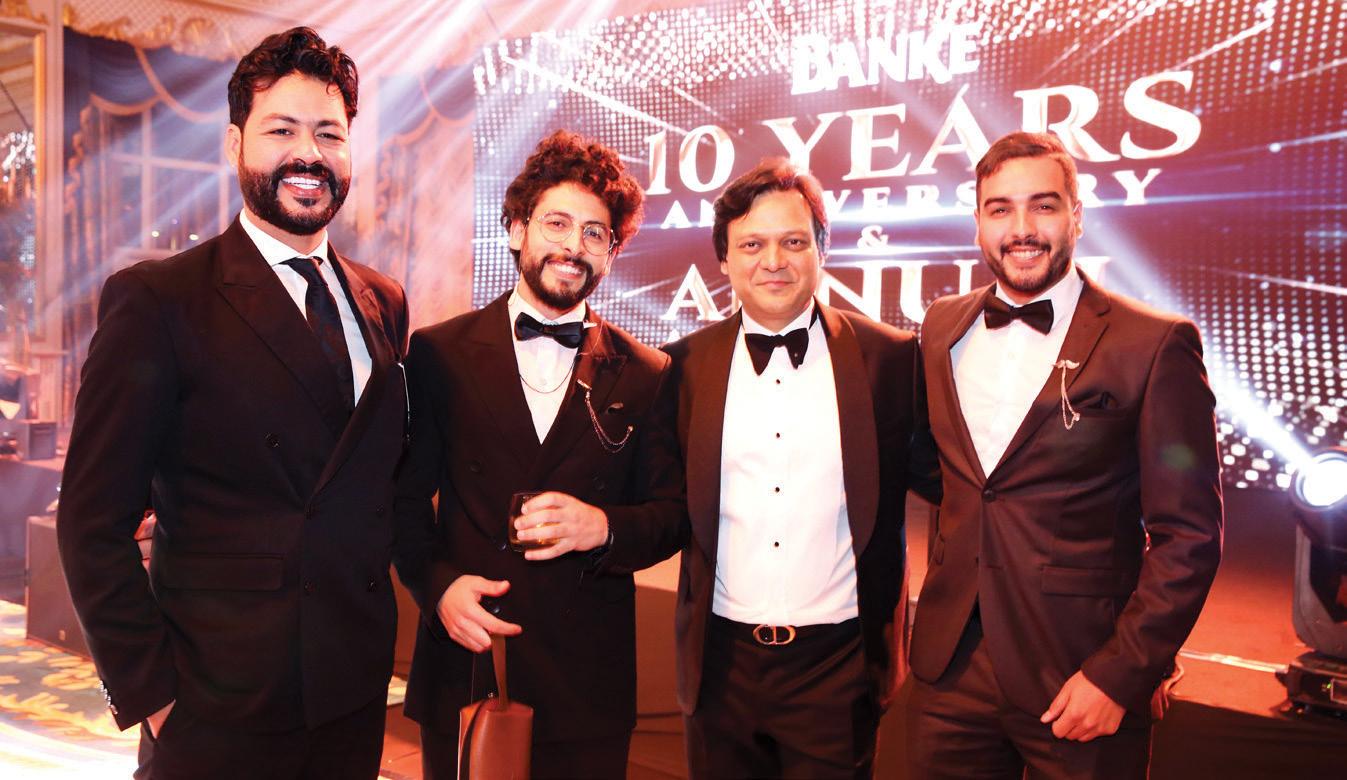
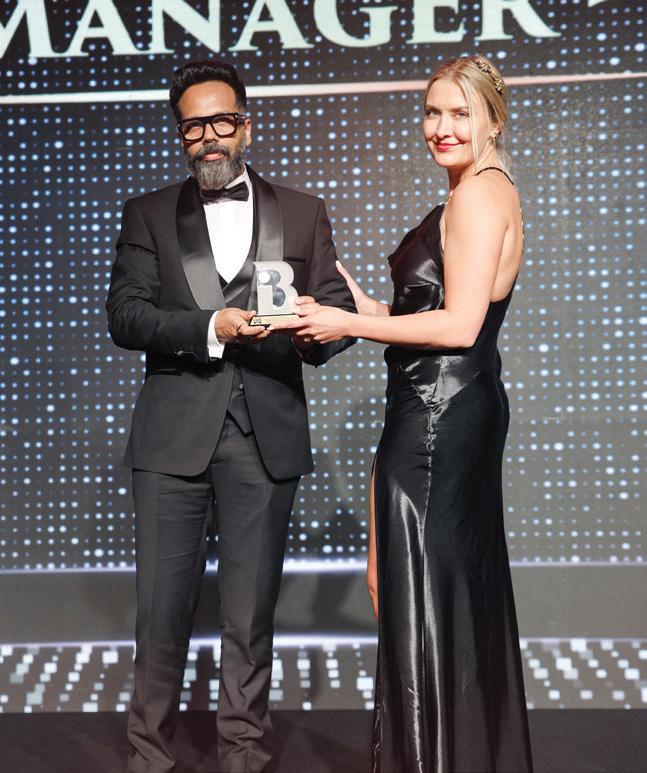
Employees at property firm Banke International are in a celebratory mood a ter being rewarded for their hard work and dedication at a glittering ceremony the company recently hosted. “Winning this award has made me even more proud to be a part of Banke and its commitment to excellence,” says Mohammed Shoeb Hafeez, manager of commercial sales and leasing, who received the gold award. A similar sentiment was echoed by property consultant Deepika Rao who won the bronze award in the Residential Sales and Leasing category. “Being recognised for my achievements has motivated me to work even harder and achieve even more,” she said.
Nearly a dozen employees were awarded at this year’s ceremony for contributing to Banke’s success. Award categories included gold, silver and bronze awards in commercial sales and leasing, residential sales and leasing and primary and secondary sales.
Helmed by Porush Jhunjhunwala, founder and CEO, Banke was named a ‘’Great Place to Work’’ in 2022, and has seen its team grow from a small crew of four to a 250-member strong workforce over a decade. Together they have sold over 10,000 properties, including more than 200 o -plan projects. The company, recently featured in Gulf Business Real Estate magazine, has garnered many accolades from some of the UAE’s most prominent developers such as Emaar, Sobha, Danube and Damac, along with more than 450 5-star Google reviews. Jhunjhunwala attributes this success to his most vital asset – his team. “My people are partners in the company’s success and have continued to drive the business through thick and thin,” he says.

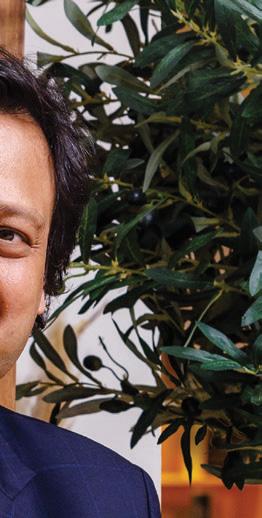
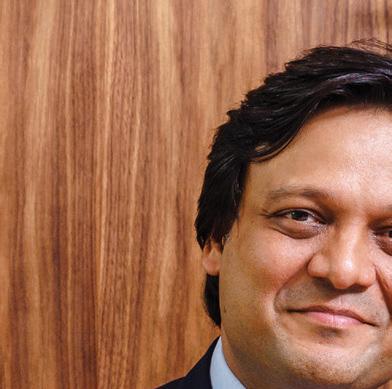
The Banke Annual Awards were instituted in 2022 to acknowledge the exceptional commitment and e ort demonstrated by its sta . They are also a testament to the company’s outstanding performance and dedication to excellence in the real estate industry. “The annual awards serve as a powerful motivator for employees, propelling them to perform at their best and strive for excellence,” says Jhunjhunwala.
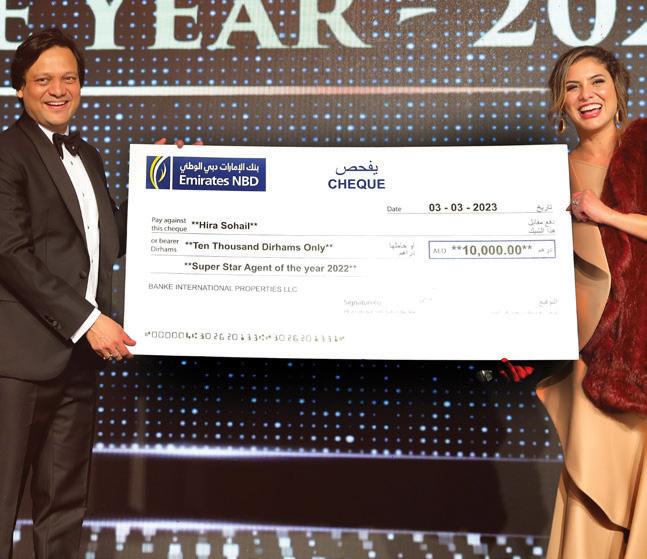
Lifestyle / Real Estate gulfbusiness.com 66 April 2023
Porush Jhunjhunwala, founder and CEO of Banke International
“By acknowledging and celebrating the accomplishments of our employees, we are reinforcing our commitment to creating a positive work culture and fostering a sense of pride and belonging among team members.”
The second edition of the awards, which coincides with Banke’s 10th anniversary, also showcased the company’s most significant achievements including the successful completion of several high-profile projects, the continued growth of its customer base
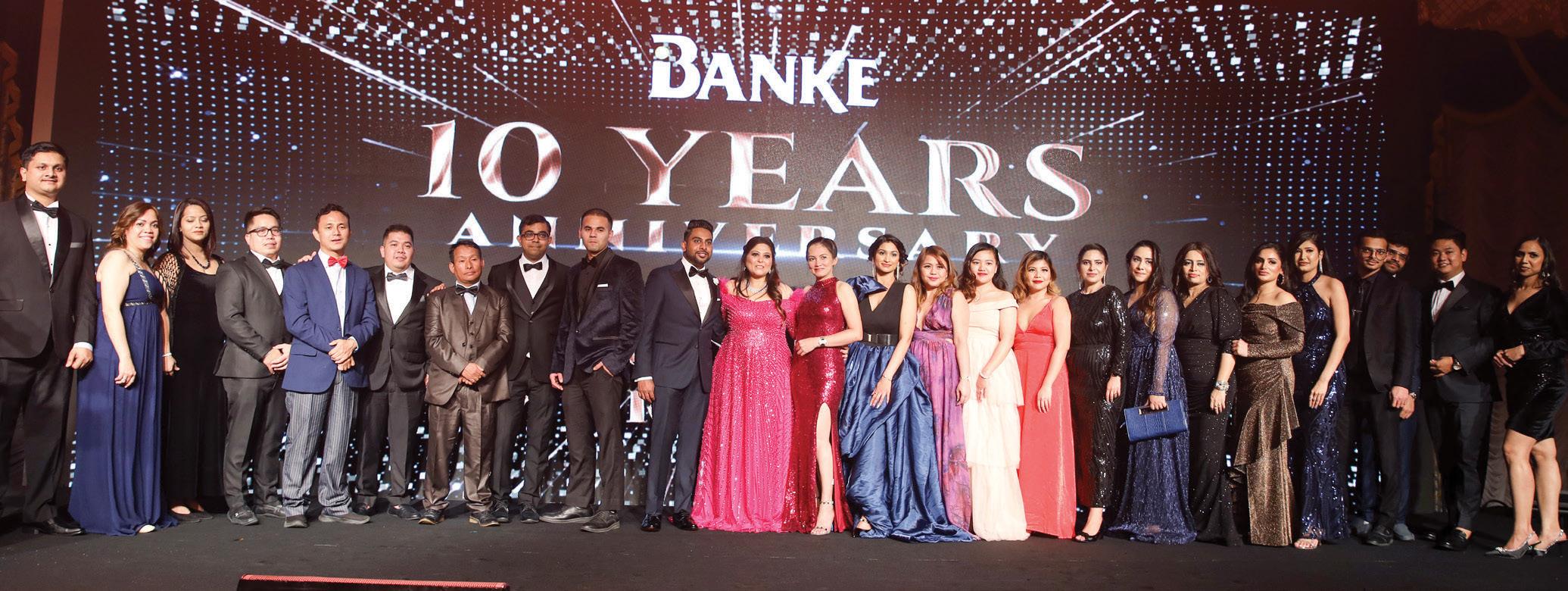
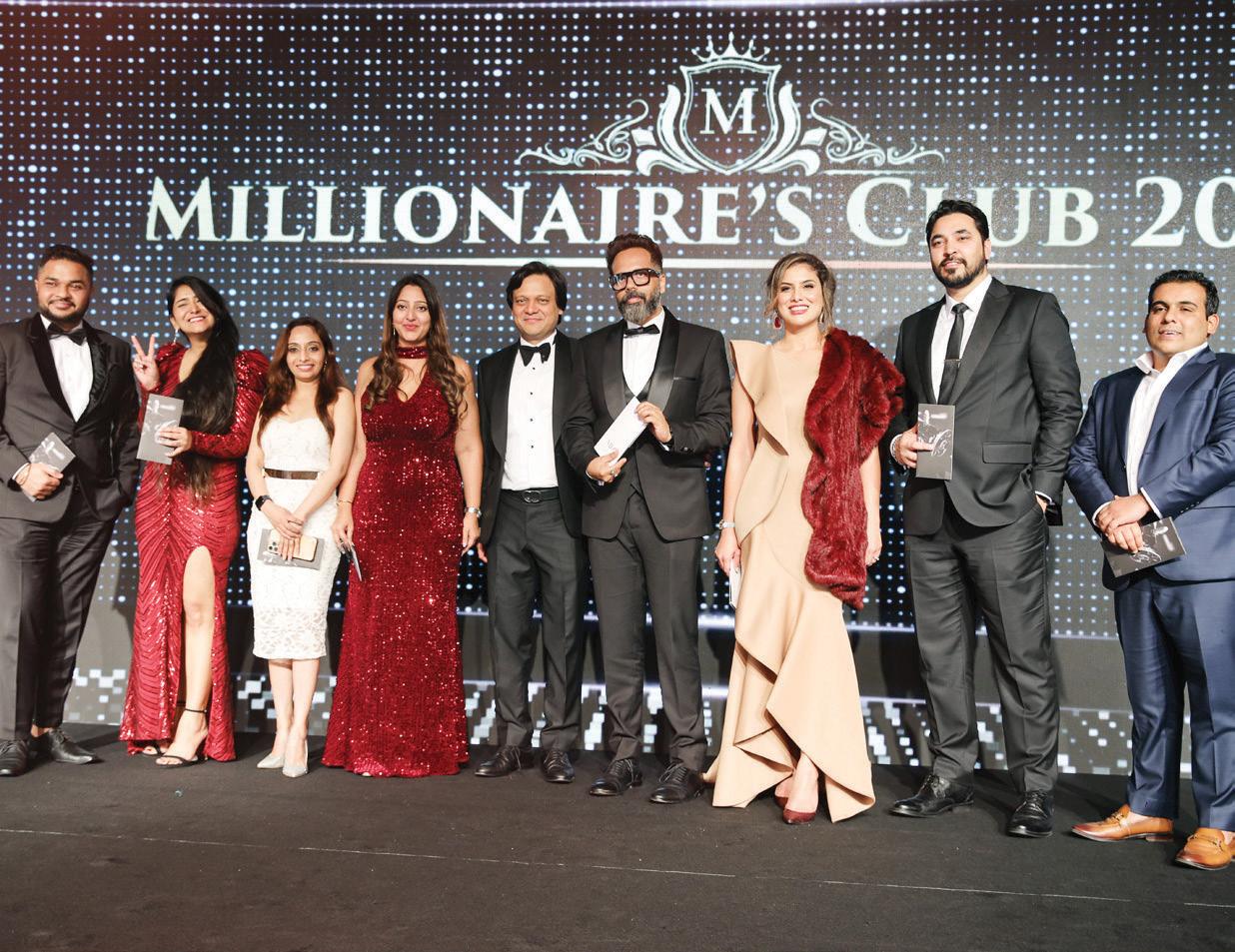
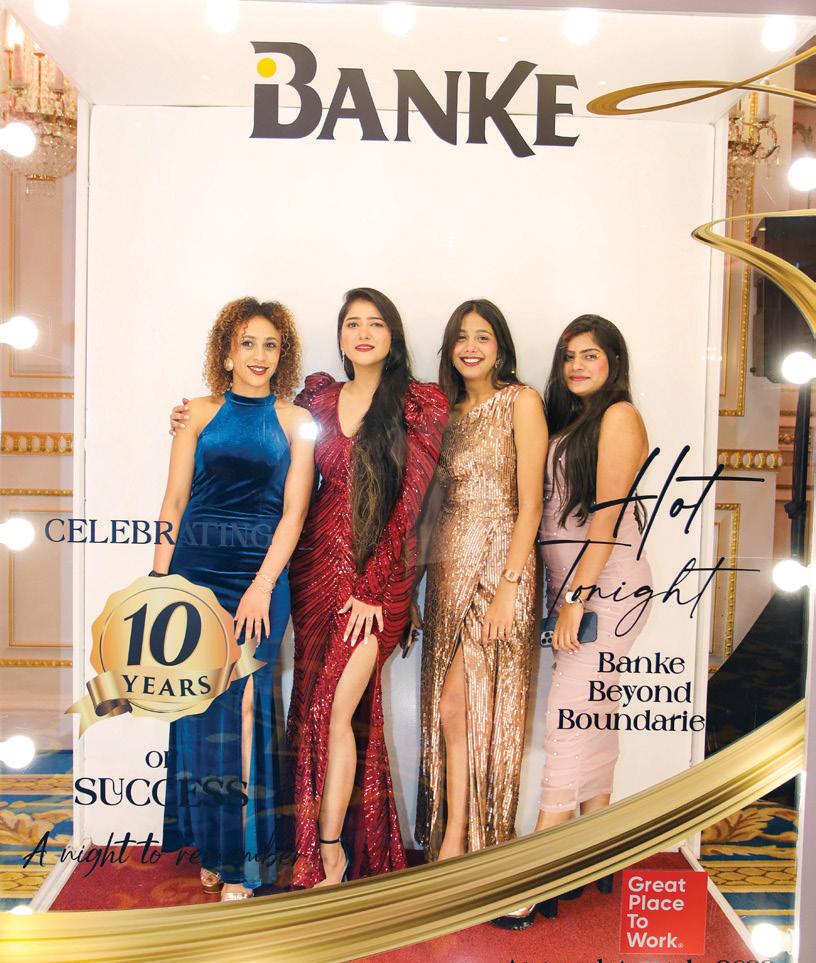
and the expansion of the company’s operations in Dubai, Abu Dhabi and Ras Al Khaimah. It has also opened an o ce in Mumbai, India, to service Indian residents looking to buy property in the UAE.
RAPID EXPANSION
Banke currently has six divisions that cover sales and leasing for residential and commercial properties, o -plan properties, project sales and marketing, property management and mortgage and finance
assistance. The company’s functions are supported by a robust customised digital framework that Jhunjhunwala built during the pandemic. Banke’s digitised customer relationship management (CRM) system allows it to e ectively capture leads from leading real estate portals along with a ‘landlord’ app where property owners can access their portfolio at a click. Their WhatsApp chatbot enables fast and reliable customer interactions, enhancing the company’s customer service. Banke is a full-service real estate brokerage with a proven track record combined with its numerous accolades position it as one of the UAE’s top-performing brokerage firms that provides exceptional service to its clients and investors.
gulfbusiness.com April 2023 67
“My people are partners in the company’s success and have continued to drive the business through thick and thin”
Leading the way
RÒYA INTERNATIONAL CEO AHMED RAMDAN TALKS TO US ABOUT THE CHANGING FACE OF HOSPITALITY IN THE REGION AND HIS COMPANY’S ROLE IN ITS TRANSFORMATION
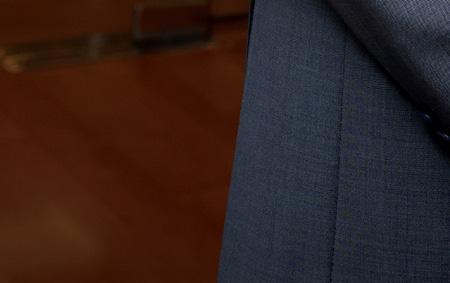
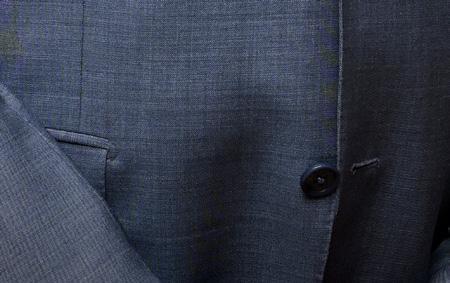 BY NEESHA SALIAN
BY NEESHA SALIAN
Ahmed Ramdan values a strong work ethic, solution-oriented approach and above all, discretion. It’s key to his business and success, he says. Ramdan is, however, quite vocal and passionate about the stupendous growth of the region’s hospitality and tourism sectors, as well his dream to see more Emiratis pursue a career in hospitality.
Considered one of the early architects of Dubai’s hospitality industry, Ramdan has seen the Emirates transform and evolve at the helm of Ròya International Hospitality & Leisure Consultants, a company he founded in 1998.
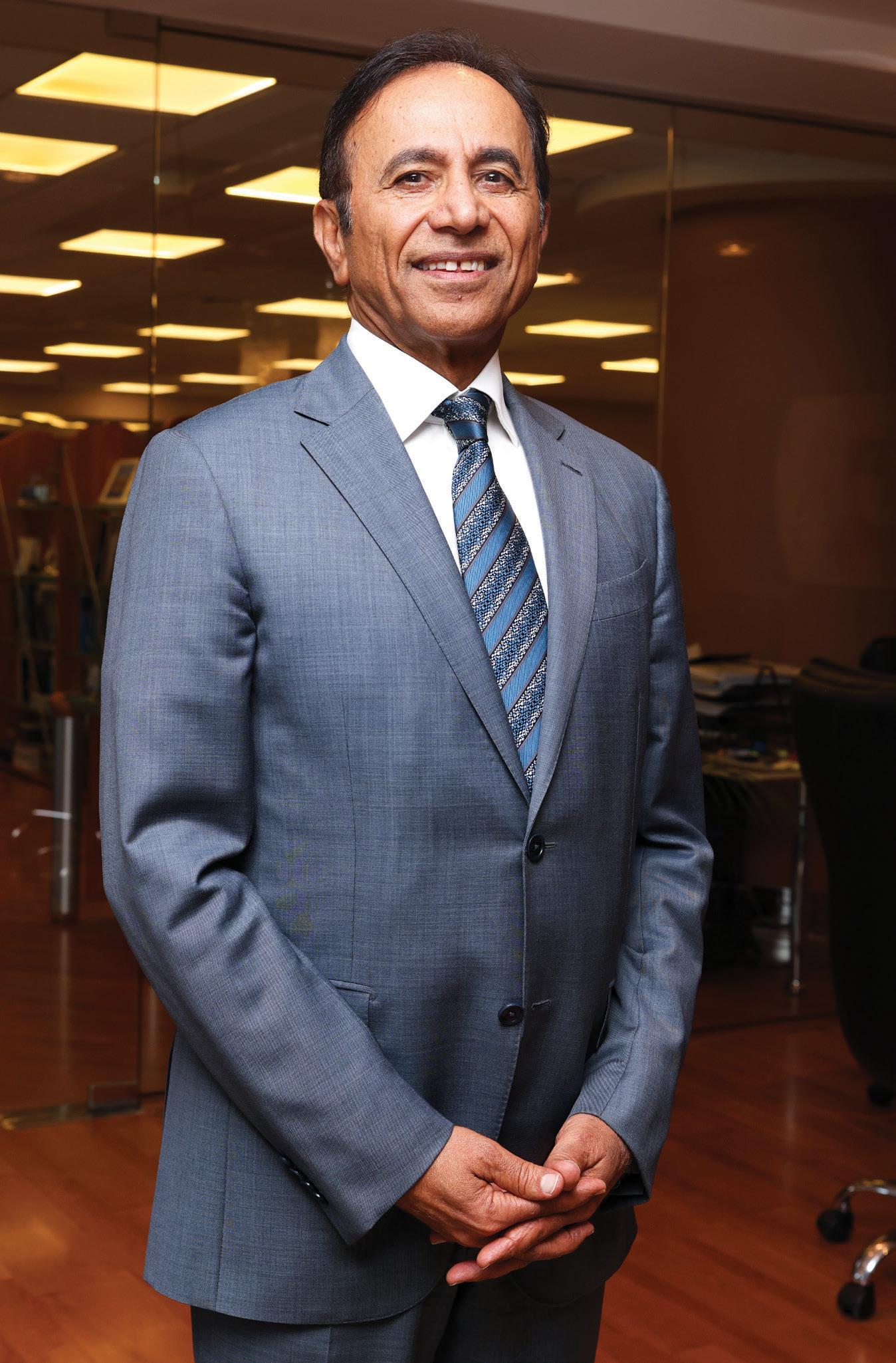
More than 25 years later, the home-grown company has emerged as one the region’s top hospitality firms.
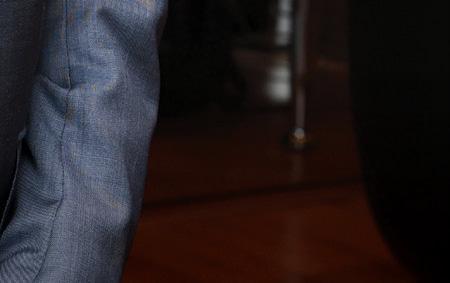
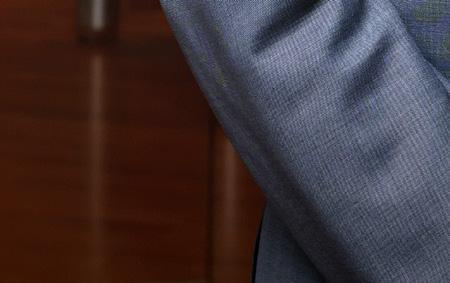
Speaking to us at his o ce on Sheikh Zayed Road, the veteran hotelier engaged us with his anecdotes, analyses and insights – weaving a compelling narrative of the company’s growth over two decades, hospitality trends that will impact both investors and consumers, and his vision for the future. Here are excerpts from the discussion.
The UAE’s, and particularly Dubai’s, hospitality landscape has totally transformed over the past 25 years. What has underscored this growth?
What has been done in hospitality in the UAE in over a quarter of a century is nothing short of impressive. Several factors have contributed to this transformation. The first involves the airlines. They are like ‘oxygen’ to tourism. Our airlines are among the best in the world, bringing in people from di erent destinations.
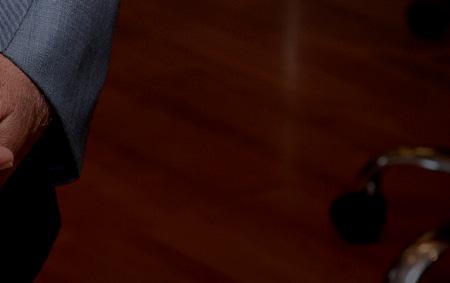

The second is the ‘sense of arrival’ and the way we welcome tourists. It’s not just our tradition; it’s also a part of the government’s e ort and employee training. When people come here, they feel comfortable –getting visas is easy, navigating the airport is simple, and transportation is readily available. These are essential factors.
The third is the tourism infrastructure, which includes hotels. Dubai has all the categories of hotels that cater to a variety of demographics. So, you can come to Dubai or the wider UAE and easily stay in an ultra-luxury or budget hotel. A combination of these factors: transportation, sense of arrival, infrastructure and ecotourism, has played a role.
Another primary sector where Dubai and the UAE have established themselves is distribution management or tourism promotion. Several destination management companies promote the country and bring people from around the world here. From Indian destination management companies to Asian, European, and American (North and South) ones, we are being promoted globally. This has also been critical to raise the profile of the country.
Other small but vital factors are safety and hygiene across the country. A lady can walk around the city at 2am sans any fear. These factors encourage tourists to stay longer.
And finally, it involves ‘availability.’ A tourist can find everything in Dubai – every type of cuisine and shopping experience – traditional souks or bigger malls. The city has many world records that have put it on the map. All these help tourists get more curious and eventually visit Dubai and the UAE.
Tell us about Roya’s growth along the way. Our growth has run parallel to that of Dubai. I’ve been advising government authorities, both formally and informally,


gulfbusiness.com 68 April 2023
since the company was launched, on the kind of infrastructure we need to attract tourism and star ratings our hotels should have among other areas.
We came up with two types of hospitality offerings: urban (business) and resorts. We have been involved in many high-end hotels in Dubai International Financial Centre (DIFC), Sheikh Zayed Road and Jumeirah Beach Residence. These are significant milestones for us.
Internally, another milestone is that we have opened new local, regional and even international offices every five years. The first significant one after Dubai was in Abu Dhabi. We then went to Doha followed by Saudi Arabia. We are opening an office in Athens, Greece soon.
In terms of your regional and international growth, tell us more about what you’re doing.
We have various verticals within the company. We offer tourism strategy, hospitality strategy, hotel development, food and beverage development, asset management and project management. We offer a 360° service, starting with a hotel feasibility study to when the hotel is handed over and also providing asset management, if required. Large-scale projects, mega projects and even giga projects – we can handle them all. We work with governments, individual hoteliers and financial institutions.
Tell us about some of your projects.
We’ve been instrumental in the creation and management of many hotels that are located on Sheikh Zayed Road in Dubai. They’ve won several awards and provided fantastic return on investment for the owners.
Ròya has also been a pioneer in bringing new aesthetics to hospitality. For instance, we built Dubai’s first minimalist hotel, Media One. Studio One hotel is yet another boutique property that I am very proud of. We visualised it as a funky, avantgarde destination and delivered on that. It’s doing exceptionally well, and the owners are happy with it. We built The St. Regis Abu Dhabi, a high-end property with very elegant and sophisticated interiors. We’ve also built a private hotel in Seychelles. It’s hugely popular and the owner now wants us to create an extension.
How is the Saudi market driving growth?
In addition to our marketing efforts,
existing and former clients have recommended us a lot to companies in Saudi Arabia. The kingdom is a big market; it’s also in the mood for growth. The next four or five years will be very aggressive in terms of culture, tourism and hospitality sector growth.
Currently, hospitality is tremendous, and we are riding that wave. We’ve just opened an office in Riyadh and are working with the government there. We are also working with authorities in other areas, including Jeddah, the Red Sea, Mecca and Medina, to name a few.
I believe there are two areas of growth in Saudi. One is natural growth, where they are building brand new giga projects. At the same time, a cycle of renovation is also occurring. Right now, we are working with nearly 18 hotels, which will go through major renovations.
Tell us about your work in Qatar. We’ve been working in Qatar for nearly 15 years. However, our busiest period was just before the FIFA World Cup Qatar 2022. We had to build hotels at breakneck speed –the past few years were demanding, but rewarding for us.
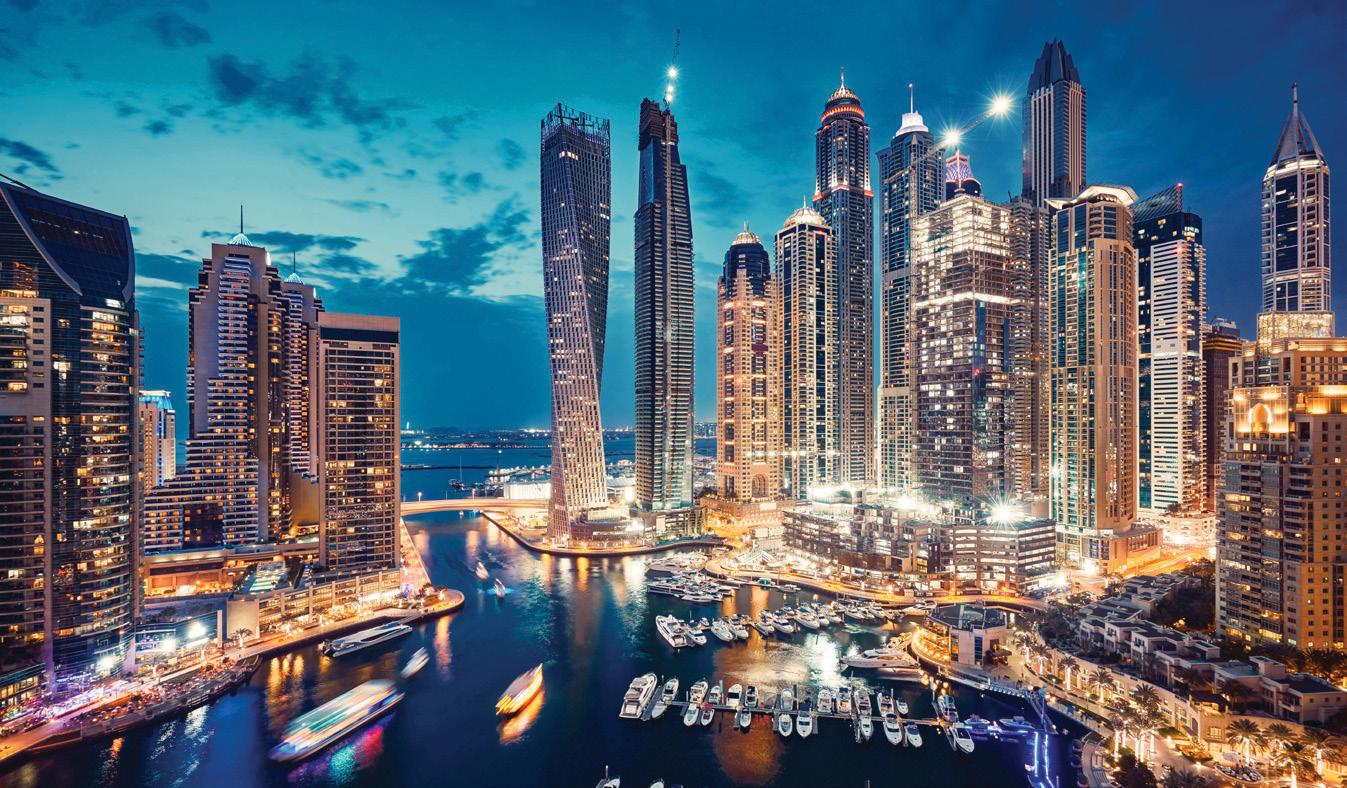
Qatar did a fantastic job as hosts; the service and organisation were terrific. So, it’s no surprise they are not stopping there. Several hotels are coming up, both resorts and urban. We have been awarded a couple of projects that we will announce over the next few months.
How different is project planning in this region versus the Americas and Europe?
The differences are very pronounced. Urban planning is an integral part of the system in the western world. However, feasibility planning takes much longer because those governments want to look at it meticulously to understand the potential environmental and social impact.
Acquiring building permits is complicated, especially in mature cities, as they consider various factors such as the impact on heritage, existing buildings and infrastructure, transport networks and even social impact. The process is highly regulated and drawn out.
Once construction starts, another set of regulations must be adhered to, including restrictions on work in terms of timings and weather conditions.
Lifestyle / Hospitality gulfbusiness.com April 2023 69
“We have various verticals within the company. We offer tourism strategy, hospitality strategy, hotel development, food and beverage development, asset management and project management”
The Middle East is relatively easier to work in. While safety standards are quite high across the board, it’s easier to get building and design permits. Construction costs vary slightly in both regions. While they are coming down now, prices are generally higher, exacerbated by shipping blockages during the pandemic and a rise in demand.
How is the demand for sustainability affecting your work?
Sustainability has picked up pace strongly over the past few years. However, we must be cautious since buildings are long-term assets lasting over 50 years. It’s not just developers, but also governments who are focusing on sustainability.
We have to now factor in sustainability right from the design process, starting with the water and energy consumption to workforce movement within the building once it is completed.
Investors are also being encouraged to look into the sustainability of properties they are investing in. While it does cost more to make a building that meets various green ratings, the return on investment in the long term is good.
Even consumers are more conscious today; if the development doesn’t meet green standards, they won’t patronise the hotel. So, sustainability is definitely gaining momentum and it will only go up from here.
Are there other emerging trends that are impacting hospitality globally?
We are seeing increasing ‘segmentation’ across hospitality with consumers demanding very specific types of hotels: urban or resort; high-end, mid-range or low-end; lifestyle or traditional; business or holiday; cosy and comfortable or chic and uber cool. Investors and developers must think very carefully about what kind of property they want to invest in. If a brand has to survive, it has to cater to all these segments as it’s the market demand. Airbnb is also becoming popular and poses some competition to hotels.
In the early days, they used to say three things matter in property: location, location, location. This adage holds true even now. Select the right site.
My advice: Don’t select a three-star site and build a five-star hotel on it. The return is just not going to be there. Build a hotel keeping its purpose in mind. You
also need to be thorough with your feasibility study. Select your segment carefully and ensure that most of your property caters to this segment. If it’s a convention hotel, then focus on that element. If it’s a family hotel, then offer facilities that families would enjoy. In the past, we had a regional trend of palatial, luxurious properties. This no longer exists. Guests will not come for ‘grand’ rooms; they cannot take the room with them. Guests only want comfort. Investors should focus on that.
These trends are exciting, but also challenging for us; we have to be very careful in what we do.
What steps are you taking to encourage Emirati talent to join the hospitality sector?
At Ròya International, we have been very active in doing so — both directly and indirectly. We have many programmes that encourage Emirati talent to come on board; we are also in touch with universities and colleges around Dubai to showcase them.
It’s also important to be a good role model for this generation. I attend many conferences and hospitality career fairs, encouraging Emirati students to venture into hospitality. I share my story and journey; I see a lot of interest. We also leverage our asset management division to
encourage hotels to hire locals. There have been some cultural misconceptions about the hospitality sector, and parents were uncomfortable sending their children to study hospitality. However, with both time and the generations changing, people now understand that the hotel industry differs from what it was perceived as before.
International brands can also play a greater role in bringing Emirati youth on board. They must highlight available career paths and how our youth can grow within the industry. Simply put, they need to place a greater degree of trust in Emirati youth. Look at the municipalities of our emirates or any other Gulf cities – they are run purely by locals. If they can manage dynamic cities such as Abu Dhabi and Dubai, think of how successfully they can impact the hospitality sector.
What does Ròya International’s future entail?
We are here here to grow. We are planning to expand into Europe, Africa and India. The Indian market is huge, and we are eager to capitalise on it. Within the company, we want to increase the services we offer. For instance, we would like to venture into tourism and talent acquisition. In short, the future is exciting for us.
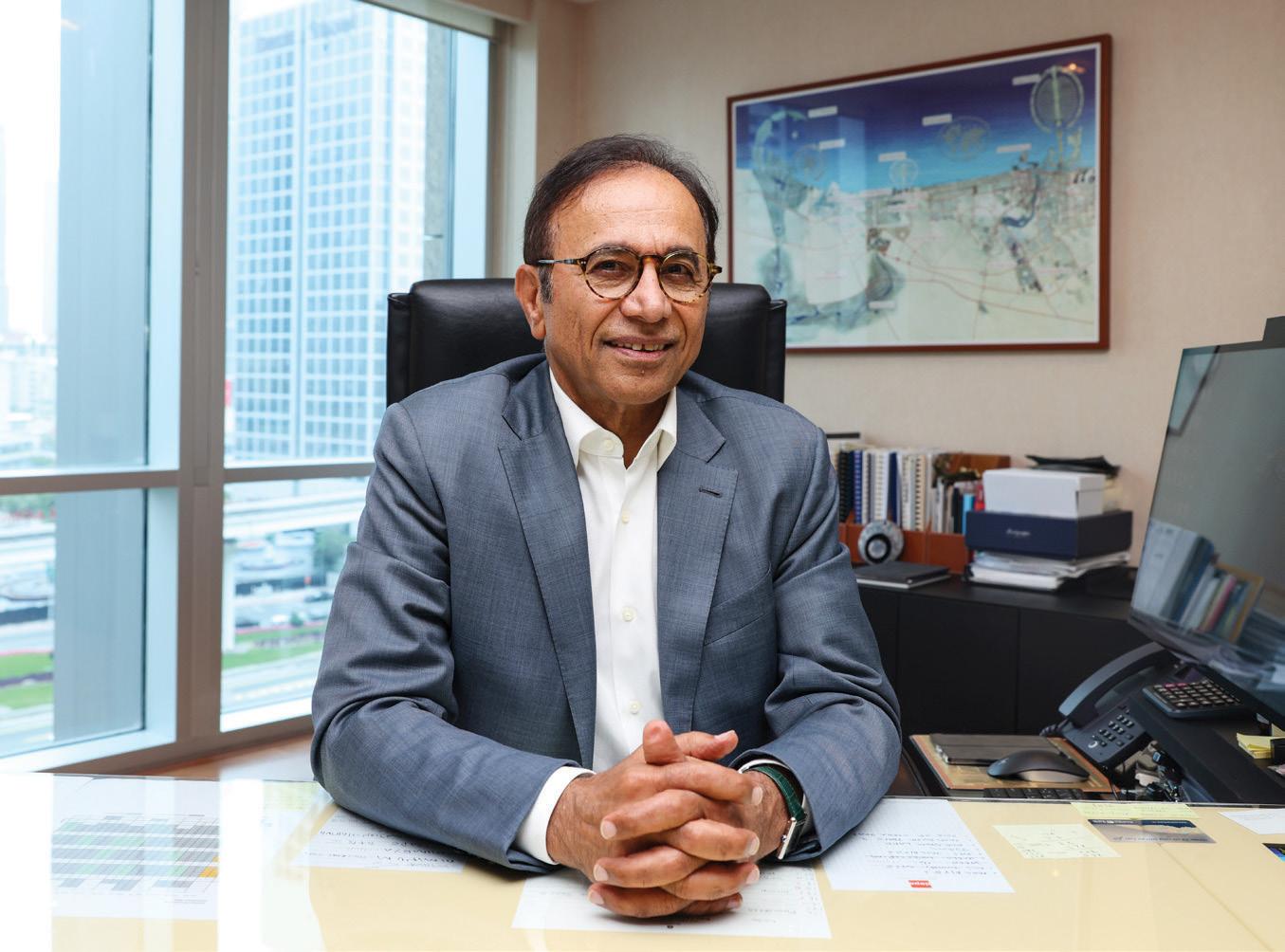
Lifestyle / Hospitality gulfbusiness.com 70 April 2023
“International brands can also play a greater role in bringing Emirati youth on board. They must highlight available career paths and how our youth can grow within the industry. Simply put, they need to place a greater degree of trust in Emirati youth”
The SME Story


A dedicated hub for the regional startup and SME ecosystem
23



Championing change







The Zayed Sustainability Prize 2023 recognised and rewarded global SMEs that have devised inspiring solutions for the most pressing challenges facing our world today. We talk to three winners who are making the world a better place through innovative AI, food and healthcare solutions
a world leader in insect-based protein ingredients and nature insect fertilisers, Ÿnsect wishes to o er a long term and sustainable alternative for animals, humans and plants.
What is your business model?
in the markets we operate in. Our order book for our YnFarm plant in Amiens (Northern France) is already full for the next couple of years.
Antoine Hubert, CEO - Ÿnsect
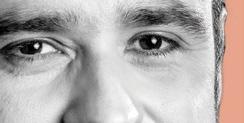
What inspired you to start this initiative?
By 2050, we will need to increase our food production by more than 70 per cent to meet the needs of our planet’s population, but with only 5 per cent extra arable land available, we need to reduce our greenhouse gas (GHG) emission by 70 per cent. The increase in global protein consumption is estimated at 52 per cent (between 2007 and 2050), 25 per cent of the world’s fisheries are used to feed aquaculture, while farm animals are consuming 20 per cent of the world’s protein. Therefore, as
We develop innovative solutions to breed insects on a large scale and automated processes to transform insects into ingredients of the highest quality. Our knowhow is unique worldwide and makes the company a reliable partner for food industry professionals, research laboratories, investors and public institutions.
In 2021, Ÿnsect restructured its internal organisation in the form of 'business units' (BUs), to better accommodate our know-how and key markets. The group operates in a matrix format, combining projects, businesses, and daily activities. The BUs cover animal, human and plant nutrition and health. Today, we work exclusively in B2B and have customers
The company is currently deploying a strategic development plan to launch the construction and operation of 15 new plants across the world by 2030.
Tell us how your business has made an impact on the communities you serve.
Beyond food, our business is part of a vision of the world and the environment; therefore, we also pay close attention to the impact of our activities. It is the reason why we have an Impact Department since 2019 to measure the consequences of our activities on the planet. One example is the introduction of carbon accounting in addition to classical accounting, fully embedded in our ERP so tware. We answered the challenge by launching di erent initiatives
gulfbusiness.com April 2023 71
“WE DEVELOP INNOVATIVE SOLUTIONS TO BREED INSECTS ON A LARGE SCALE AND AUTOMATED PROCESSES TO TRANSFORM INSECTS INTO INGREDIENTS OF THE HIGHEST QUALITY”
APR
INTERVIEW
such as the TerrHa 2040 programme in partnership with PUR Projet, an impact company that helps companies and communities to preserve and regenerate the ecosystems on which they depend, and Noriap and Children on the Trees, an association that aims to promote the ecological transition by raising children’s awareness. TerrHa 2040 focuses on the triple challenge of reducing emissions from agricultural techniques, sequestering carbon in the soil and strengthening local biodiversity in the wheat and rapeseed sectors close to Ÿnsect.
With the aim of creating more sustainable food chains, the first three partners, who will be joined by others, are committed to planting around 1,700 kilometres of hedgerows, i.e. 1.8 million trees, in Northern France by 2040, at the homes of 1,100 partner farmers, in order to sequester more than 190,000 tonnes of CO2 by 2040.
What were the challenges you faced on your journey.
We had our fair share of experiences, but the main challenges usually stem from the same triad of di culties – financial, technical and regulatory issues. Innovation is at the core of what we do, but experimenting requires money, and then moving to the industrial, or even at demonstration level, is even costlier. In addition, research and innovation rarely follow linear paths, thus not being afraid of investing a lot of time and energy into finding new solutions is a must, especially when there aren’t
any existing points of reference to learn from. Last but not the least, our business is strongly tied to gaining authorisations at both national and supernational levels. When we first launched the company in 2011, it was only possible to address the petfood market. But thanks to our hard work, providing proof of reliability, sustainability and performance, and the mobilisation of the entire sector for the construction of a full-fledged industry, we broke through the barriers, leading to the European Food Safety Authority (EFSA) approval of insect-based ingredients to be used for human consumption recently.
How did you get funding for your project?


As for most innovative companies, funding our development project was done through public financial support for innovation, bank credit and fund raising. When it comes to fundraising, we have raised around $500m dollars since the creation of the company.
What are some of the key milestones for the company so far?

We went through several stages: we launched our demonstration plant in Dôle (Eastern France) in 2016, fundraising $372m dollars in 2020, going into the human food market, starting the construction of a landmark vertical and automated industrial plant in March 2020, and signing new partnerships to expand internationally.
Tell us how technology has played an important role in your business. Innovation and technology are at the core of our business. Insect rearing and farming is not a novelty per se – breeding insects as livestock for the commodities they have, has been in practice for a long time in some parts of the world. However, our technologies and processes, protected by more than 370 patents, are game changers that have brought insect rearing, breeding and transformation, to a whole new level. For instance, YnFarm, at full capacity, will be able to produce 200,000 tonnes of products a year.
Our alternative protein solutions are a result of the smart use of biotech, innovative technologies and the biological nature of the insect species. They will soon be used at an industrial scale and automated fashion.
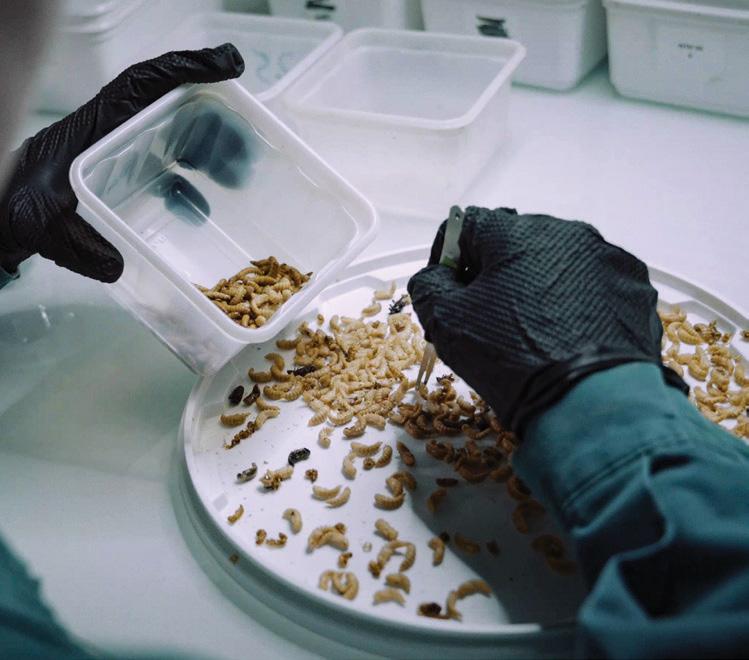


How will the Zayed Sustainability Prize help your business?
The funding will go into the execution of our strategic development plan aimed at international expansion.
As a company that is already wellestablished in Europe and in the US, the extension of the mapping for future plants in other locations across the world is a priority; we are screening several countries for further plant settlement and mapped all agrifood by-products’ location and available volumes through several local visits, discussion with feedstock suppliers and local authorities.
We also hope that winning the prize will foster greater visibility and knowledge in the region about our company, activities and ambitions.
gulfbusiness.com 72 April 2023 The SME Story
What inspired you to start this company?

NeuroTech was inspired by a real case inside the Azraq camp in Jordan where a 24-year-old woman had to hold and comfort her baby in complete darkness due to the lack of electricity. The dearth of reliable access to electricity in refugee camps has severely impacted the lives of refugees. We saw this as an opportunity to utilise our experience to create a solution that would provide stable access to electricity while overcoming the challenges of operating such a project in a camp setting.
What is your business model?
NeuroTech’s business model is based on providing energy solutions to refugee camps and other humanitarian sites, while maintaining a commercial stream. Mainly, NeuroTech tends to use renewable energy sources and energy e ciency technologies in all application scenarios.
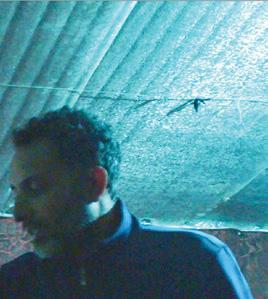
Tell us how your e orts have made an impact on the community.
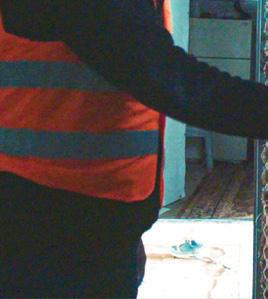
NeuroTech’s solutions have a significant impact on the communities we serve. We guarantee 24/7 electricity coverage for high-priority electric loads, including lighting, refrigeration, and respiratory medical devices. By providing clean and reliable energy solutions, we help
improve the quality of life for refugees in camps, and we empower local workshops to generate income to educate their children and break the cycle of need. We also provide training and skill-building sessions to refugees and companies to help them develop sustainable and energy-efficient practices. Ultimately, our solutions contribute to creating a more sustainable and energy-e cient future for all.
What were the challenges you faced on your journey?
Some of the challenges we faced included navigating the complex and ever-changing political and social landscape in refugee camps, as well as the logistical and technical challenges of implementing energy solutions in these settings.
How did you fund the company?
We initially received funding through small competitions in Jordan, partnering with NGOs and other organisations or acquiring grants from them.
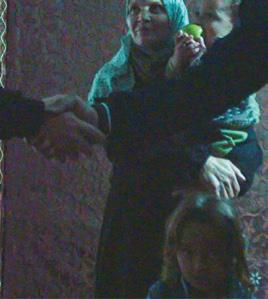
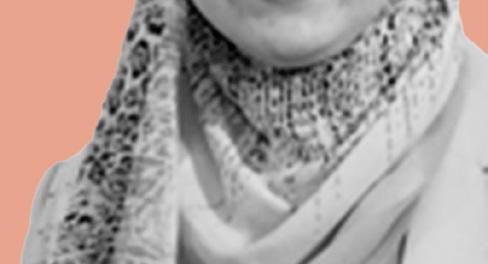
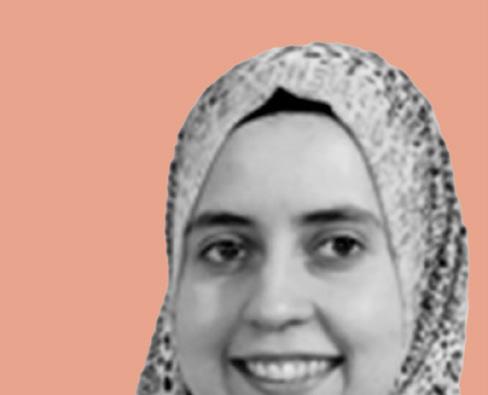
What are some of the company's key milestones so far?
Key milestones for us include the successful implementation of our energy solutions in several refugee camps,

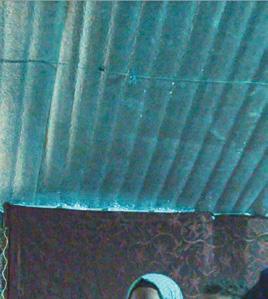
the establishment of partnerships with various NGOs, and the development of new products and services to expand their impact.
Tell us how technology is driving the work you do.
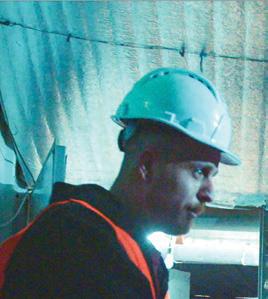
NeuroTech has developed an AI-powered energy management system that matches the need with the amount of energy available. Additionally, focusing on innovation and using cutting-edge technology has allowed us to stay ahead of the curve and continue to provide e ective solutions in challenging settings, such as the electrical device fingerprint identification.
How do you see the Zayed Sustainability Prize supporting your work?
Winning the Zayed Sustainability Prize has been amazing and will have a significant impact on NeuroTech in a number of ways. Firstly, the prize has provided us with resources to further develop and improve our technology, expand our operations, and reach more people in need. This helps us to continue providing a ordable and sustainable energy solutions to the communities we serve.
Additionally, the prize has helped us gain more recognition and exposure in the industry, which will attract new customers, investors, and partners. It also provides us with the opportunity to network with other innovative companies and organisations, and potentially collaborate on new projects and initiatives.
Moreover, the win has given us a platform to share our story and success with a wider audience, which will help inspire others to join us in our mission to create a better world.
gulfbusiness.com April 2023 73
The SME Story
Heba Asaad, CEO and co-founder, NeuroTech
“NEUROTECH’S SOLUTIONS HAVE A SIGNIFICANT IMPACT ON THE COMMUNITIES WE SERVE. WE GUARANTEE 24/7 ELECTRICITY COVERAGE FOR HIGH-PRIORITY ELECTRIC LOADS, INCLUDING LIGHTING, REFRIGERATION, AND RESPIRATORY MEDICAL DEVICES”
Dr


What inspired you to start this initiative?
The initiative was born during a hike conducted by a group of friends – mainly doctors – in Pico da Neblina Mountain, Amazonas state, in 2002.
During the trip, we had the opportunity to visit a Yanomami indigenous village. Astonished by the living standards of the villagers and how they lacked access to health services – a reality much di erent from the one we knew – we decided to change the focus of our travels and try to do something for the indigenous population in the region. Thus, in 2003, the EDS Association was established. Since then, our hiking trips have turned into medical expeditions to support the indigenous communities in the Amazon, giving rise to the 'Operating in the Amazon Program'.
Tell us about the organisation. Associação Expedicionários da Saúde - EDS is a Brazilian non-profit organisation created by a group of volunteer doctors. It aims to bring specialised medicine, mainly surgical care, to isolated indigenous populations in the Brazilian Amazon. It is a complementary service to healthcare programmes that enables patients to receive quality care without needing to travel for surgical procedures, which is o ten unfeasible for people in their situation who live very far from surgical centres. Therefore, our health expeditionary developed the
Mobile Surgical Center to serve their needs. It is an innovative way of working and the first of its kind in Brazil by a civil organisation.
Tell us about the impact of your organisation on the communities you serve.
To date, 50 expeditions have been carried out, with a total of 9,837 surgeries, 70,809 consultations, and 126,000 exams and procedures. Most surgeries are related to specialties of ophthalmology and general surgery, in addition to pediatric, orthopedic, and gynecological surgeries of medium complexity. Clinical consultations are also carried out in various specialties.

What were the challenges you faced on your journey?
For expeditions in difficult-to-reach areas, logistics are always a challenge. Depending on the region, it is necessary to use di erent means of transportation, such as by air, crossing rivers and driving on rough terrain. These factors complicate the execution of operations, and we have to customise each expedition accordingly.
Tell us about the funding you have received.
With over 20 years of committed work to indigenous health, EDS has been able to bring together crucial partners from the industry and international foundations, who continue to sponsor the expeditions through cash donations, medicines and supplies.

Some of them include Pfizer, Johnson& Johnson, Baxter, Avaaz and Direct Relief, among others.
50 EXPEDITIONS HAVE BEEN CARRIED OUT WITH A TOTAL OF

9,837 SURGERIES




70,809 CONSULTATIONS

126,000 EXAMS AND PROCEDURES
What are some of the key milestones for the organisation so far?

Without a doubt, winning the Zayed Sustainability Prize was one of the most significant milestones reached in the history of EDS. Another milestone would be introducing the concept of the Mobile Surgical Center. Others include Mission Haiti during the 2010 earthquake, when we set up an orthopedic hospital in Les Cayes; and the field hospital we set up during Covid-19, which included 122 beds and 262 field wards across the Amazon forest. We are now setting up a field hospital in the Yanomami Land, where malaria and starvation has impacted the indigenous tribe to a great extent.
How has technology supported your growth?
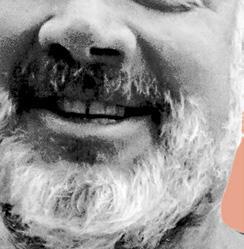
It didn’t take EDS long to understand that the best solution for indigenous health was to take the hospital into the forest. In this way, we have developed a social technology called the Mobile Surgical Center, an innovative and pioneering solution fully adaptable to the climatic and logistical conditions of the Amazon, which have improved year a ter year.
How will you use the prize?
In recent years, the number of EDS missions, consultations and surgeries has risen significantly, which has spurred the need to strengthen our work team and structure.
The Zayed Sustainability Prize is extremely important to guarantee financial stability for the organisation, as we invest in the development of our employees, and creation of processes so that we can o er even more health services to the 'Guardians of the Forest'.
gulfbusiness.com 74 April 2023 The SME Story
Ricardo A Ferreira, president of Expedicionários da Saúde NGO

























































































































































































































































































































































































































































































































































































































#WOAwards WhatsOnKSA APRIL REGISTRATION OPEN JUNE VOTING OPENS JULY VOTING CLOSES AUGUST SHORTLIST ANNOUNCED SEPTEMBER AWARDS CEREMONY WINNERS ANNOUNCED FIND OUT MORE whatsonsaudiarabia.com/events/awards






































 BY AUDEMARS PIGUET STARWHEEL
BY AUDEMARS PIGUET STARWHEEL


























































 Alan O’Neill Managing director of Kara, change consultant and speaker
Alan O’Neill Managing director of Kara, change consultant and speaker














































































































































































 Mohammad A Baker Deputy chairman and CEO, GMG
Mohammad A Baker Deputy chairman and CEO, GMG























































































 BY NEESHA SALIAN
BY NEESHA SALIAN

























































































































































































































































